#Voltron meta
Note
What , And how did you start pairing lotura, And Plance .?
Ooooh boy am I excited to answer this!!! This is going to be a long answer, hope you don't mind! Because I have some specific memories about these two ships, particularly lotura, that I would absolutely love to share with you!

Prepare for a long read! Hehe
Starting with lotura, when season 3 came out and Lotor made his debut, of course I was all 👀👀👀 Because that day something awoke in 19 year old me that I didn't realize could ever be awoken lol. And I wish I could remember exactly what my reaction was to his cat-and-mouse chase with Allura in the episode "The Hunted", but at the time I must not have considered the idea of them ever going in the direction of a romance. Looking back now though, how could I have been so blind??! That chase scene is HOT. I mean just look at them!!! Look at Lotor especially woah mama 😳

Season 4 was mediocre to me at the time, I will confess, for a lot of different reasons. But then season 5, man... SEASON 5!!!! I remember it was March 3rd, 2018. I wasn't keeping up with the show anymore, but I just so happened to see an article online that said season 5 had been released the day before on Netflix. I told my sister and we decided, "eh, let's watch at least the first episode."
And we watched the first episode, alright. And then another, and then another and another until we watched all six episodes in one sitting. We were both blown away! Lotor... Allura... together???? 😲
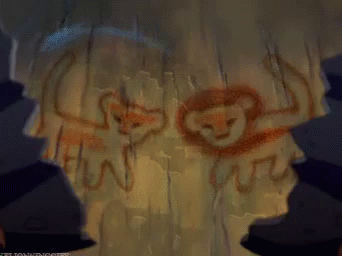
Their adventures, their chemistry, their clear attraction to one another... I was OBSESSED!!! I shipped them hardcore after that. They were and are still my #1 OTP, and it's because of them that I really tried to work hard and improve my art! I wanted to draw them all the time, making mini comics and AUs, and while their tragic ending actually left me in tears and I was upset for a really long time, I can now say that I have been able to heal and move on from it--eh, mostly anyway, haha.
It still hurts, but 5 years later I feel that I've matured and come to a greater understanding and acceptance. I have come to really appreciate how perfect they are for each other, both aesthetically of course (cuz lookit that sexual dimorphism babeyyy) as well as the many, many things they have in common. I have also come to appreciate their flaws, their imperfections, and the mistakes they made regarding each other and their relationship. They may have gotten a sad ending, but they were still truly equals in every way. It's just beautiful, and my love for them now is stronger than ever :')
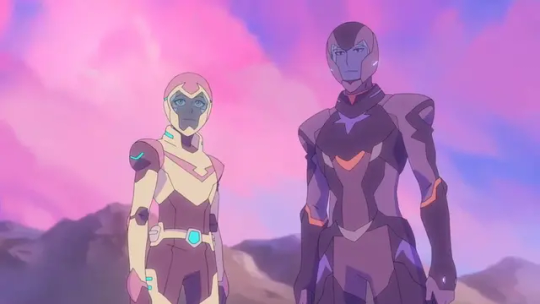
For Lance and Pidge on the other hand, it's not quite as clear as when I started shipping them! I remember rolling my eyes at Lance and Allura's first meeting, like "okay Lance is one of THESE guys, here we go 🙄"
Other than that I didn't really ship Lance or Pidge with anyone! If I'm recalling correctly, I don't think it wasn't until after season 6 that I started shipping them together. I remember reading metas and analyses of their relationship that people were making in anticipation for season 7's release, and the more I thought about it, the more I started to really like the idea of Lance and Pidge getting together! And there are definitely subtle hints throughout the earlier seasons of Pidge's feelings for Lance, as well as their fun chemistry with one another, like the episode "Space Mall"!

The hints are not so subtle to me now, but back then it wasn't until I watched season 7 that I actually became hopeful that they could be a couple! I especially loved the moments when Pidge indirectly called Lance "cute, in a creepy, hideous sort of way" lol, and when Lance become very protective over Pidge in such a way that I don't think we ever saw him react before! I was honestly taken aback by that moment!

And again, their ending was definitely less than satisfactory, particularly Lance's ending (still hate it with a passion), but just like with Lotura's relationship, I have also come to appreciate many things about Plance's relationship today. While Lotor and Allura have so much in common and are able to reach an understanding with each other that they can't with anyone else, it would seem at first that Pidge and Lance are far too different to be compatible. And it is true that they are very different, but for one, that can be a good thing! The foundations of some relationships are built off of their differences. It can make someone more compassionate and more open-minded when they have a willingness to accept and appreciate the differences they have with their partner, and a willingness to take a genuine interest in the things that their partner is passionate about, even if they don't completely understand.
And two, at the same time, Pidge and Lance DO have things in common! They both love their families, both have a stronger connection to Earth compared to the other paladins, and they are able to bond with one another over fun pastimes such as video games! How cute is that??!

And just like with Lotor and Allura, I also love Pidge and Lance for their flaws. It did take me a while to come around to Lance, because while he has his funny moments and one-liners, I also found him very annoying at times lol. But I think the fact that he can be really annoying honestly makes him the most realistic character in Voltron. Not necessarily the most relatable, at least not for me, but definitely the most human! Because there are people in our real lives that we love and cherish deeply, but they absolutely have their moments where you go, "ugh, you're so annoying and it really frustrates me when you act this way" but we still wouldn't trade them for the world 🥰
And just to draw one last comparison between Lotura and Plance, I especially LOVE how incredibly different the two pairings are even from each other! To me, Lotor and Allura are sexy and passionate, while Pidge and Lance are pure and fun! They're all so unique and special in their own ways, and they bring so much to the table, both for their characters and for their relationships.
I can't help but write essays every time I get asks, I'm so sorry lol 😭 There's so much more I could say about these guys, but I think I'd better stop here haha! I had a lot of fun writing about Lotura and Plance, and I hope you had just as much fun reading this! I really love these characters a lot. I'm so incredibly grateful that they exist, even if in the form of fiction, and I'm even MORE grateful that my love for them has continued to grow over the years. Thank you so much for the ask!!!! 💖💜💙💚
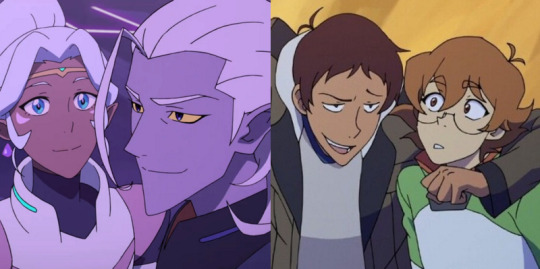
Oh and one last thing: we were robbed of a lot of different potential interactions with a lot of different characters, but I have to say it would have been fun to see more of Lotor and Lance interacting with each other! Lance was always acting out due to his jealousy, while Lotor on the other hand mostly just ignored him lol.

#asks#lotura#plance#lotor#allura#vld lance#pidge gunderson#katie holt#voltron#voltron legendary defender#meta#voltron meta
51 notes
·
View notes
Text
Slowly Going Mad - Part III - Lotor
This is the third installment of my meta series discussing three essential characters of Voltron:Legendary Defender (Zarkon, Honerva and Lotor) and their gradual mental state transitions throughout the show. After writing the first two parts, I’ve debated whether to publish Lotor’s segment or not, due to the emotional triggers this analysis might raise. I decided to go ahead and post it, because I’d love to create a coherent, complete set of essays, but…
We will descend into some sensitive issues (trauma, mental illness) regarding a controversial character, so if you would prefer to steer clear of it, please do so, for your own peace of mind. I know it has been almost five years since the show ended and many of us prefer to leave certain subjects behind. So, if you consider best to scroll past, do so. Hopefully, the warning tags will also provide a firewall around it.

Alright, if you clicked past the stop sign, hop along! And thank you for reading!
The purpose of this analysis is to demonstrate that Lotor’s trajectory towards Season 6 follows a mental illness arc, slowly built up, although the reveal of his backstory arrives to us pretty much… backwards. I will enter into subjects such as developmental psychology, coping mechanisms, transactional analysis (TA) and what it means to reach the dam breaking moment.
His sudden, shocking descent into madness in S6 is achieved through subtle context throughout S3-S6. Couple that context with the backstory dropped in S8 and a larger picture will form. This analysis intends to get granular at times, because the psychology of his path lies in the sum of many details.
Here are a few highlights that define a madness arc:
the originating point of the mental affliction: it can be a defeat, a failure, a loss, grief, a dark influence.
recurrent traumas and/or abuse throughout the character’s life, slowly building up.
the traumas and losses of the past haunt the character.
deterioration of connections with family, friends, community, and finally self. Broken connections lead to paranoia and isolation, which feed the vicious cycle.
as the story progresses, the character’s arc reaches a boiling point.
at this critical point, the individual faces a moment of agency and in a tragic mental breakdown, chooses madness. Whatever breaks the dam is a world-shattering event: extreme grief, total loss of loved ones, closest allies and friends, the breach of trust towards the world, or a combination of these. The character will try to fix the world and/or revenge against the ones who did this.
I’ll approach Lotor’s story the same way I did with the other two: chronologically, which means I’ll jump back and forth among episodes, because Lotor’s backstory is also scrambled across the seasons.
Similar mention as with Honerva and Zarkon’s metas:
1) The distinction between the entity and quintessence. The entity is a creature capable of magical stuff, whereas quintessence is a substance (highest known potency in the universe).
2) Shiro’s statement: “Zarkon fell prey to his own evil instincts. The quintessence field didn’t create them, it revealed them.” - it basically casts the responsibility on the character, not on external factors.
BIRTH AND CHILDHOOD
We’ll begin with the days of Honerva’s pregnancy. I already analyzed these parts in Honerva’s meta, so I’ll summarize. Pregnant Honerva shows distorted cheek marks and visible changing of her appearance: gray, unkempt hair, aged countenance, sagging shoulders. Parallel that to Kova, whose appearance changed after the rift entities attacked, and we deduce that Honerva’s metamorphosis might be due to the same kind of illness.
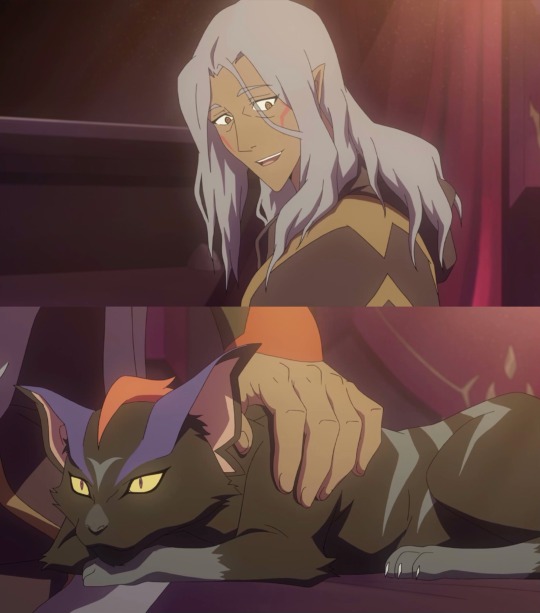
When Honerva falls ill and starts having what seem to be withdrawal symptoms, she demands to go into the rift to get quintessence, because “we must have it” / [we must] “get back into the rift”. The deduction I made was that the entity was actually the one speaking, because - other than the entity - nobody had ever been into the rift before, so “going back” into the rift is something that only the entity could have asked for. Logically, that means Honerva was possessed/infected with the entity.
—————————————————
And this turns our attention to… baby Lotor:
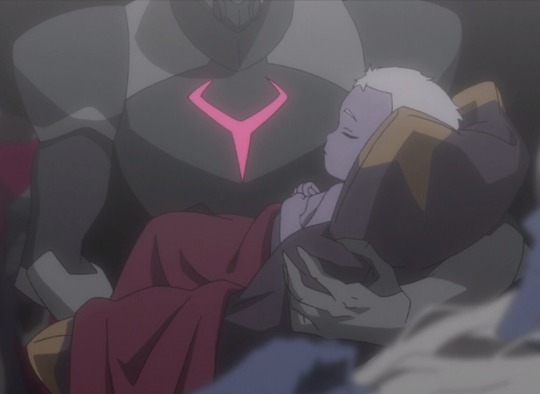
S8E2 “Shadows”: “Sire, the birth was difficult, but successful. Your son is healthy and in good shape, though we seem to be getting some strange readings coming from him directly. Similar to those that, well… Similar to those of the empress and… yourself.”
And voila, I think that makes quite a strong argument that Lotor was born with the entity, which gives him a unique position among other characters. In the same scene, the doctor talks about Honerva’s state: “She only seems to become aware when we administer her quintessence. I’m hopeful her condition will improve with time, but… Sire, we’re gonna have to face the fact that our quintessence supplies are finite. The empire cannot continue to run on what we have. And you, and the Empress, without it… you’ll—”
I’m circling back to Kova, which was also revived only after administering him quintessence, and now it’s clear that these “space vampires” cannot survive without the Q life juice.
Which leads me to an interesting question: did Lotor also need quintessence to survive? The answer seems to lead to a no. For the extended period of time when he stayed in Allura’s castle, either as a prisoner or working together with the Paladins, he did not show any signs of… quintessence withdrawal. As the EPs described him, quintessence is part of his DNA. Without divulging anything about the entity, since this interview took place right after S5, here’s their description (Source: AfterBuzz TV S5 interview - link in comments, since external links here seem to affect the visibility of the post):
JDS: It’s pretty safe to say that Lotor’s got that Daywalker kind of thing going on.
Interviewer: Little Vampire.
LM: Being in…in her womb, as [Honerva] was being exposed to all of this quintessence - it’s part of his DNA. It almost puts him on a level with Allura, pretty much how her quintessence is a part of her DNA. So it’s interesting to see.
Armed with this information, let’s move through the buildup of events that show us Lotor’s backstory, before we see him for the first time in Season 3.
In S8E2, which I’ll quote for a while, because it holds the bulk of Lotor’s early years, we first see baby Lotor right after his birth, rejected by Honerva. Similarly, Zarkon’s paternal instincts are almost abolished. He abruptly orders the doctor: “Take him away.”
The complete lack of empathy for the little nugget gives us just a hint into what this child will go through as he grows up.
——————————————
The next time we meet him, he’s an adorable, tiny school boy, whose stature is below Galra lineage expectations, but as a counterbalance, Dayak points out his remarkable skills and intelligence: he completed the Agotian trials successfully, even though they were advanced for his age. Also, his tactical scores are they highest they’ve ever measured. (Tactical scores, hehe. We know he’s going to become a good tactician later in life; it’s his natural inclination, clearly.)
As Dayak proudly finishes the short account of her pupil, little Lotor speaks up: “All I do, I do in the name of Galra.” I found this little statement quite significant, especially in the context of his education. It comes to show how deep the Galra values are ingrained in his character. It is his pledge of allegiance, something that he must have repeated over and over along his school years. Repetitio est mater studiorum.
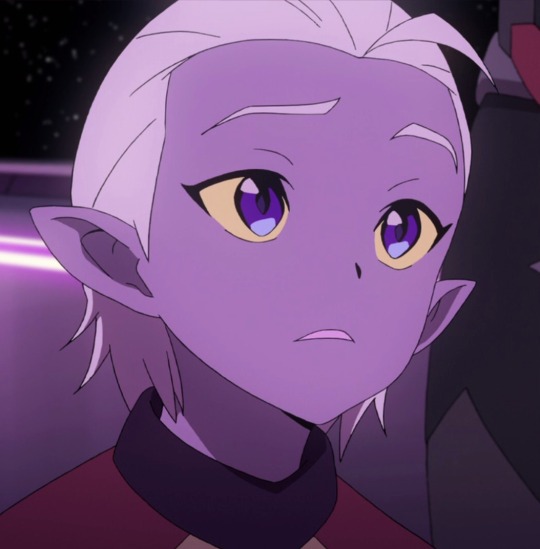
It’s absolutely heartbreaking to see the innocent boy with big, amethyst eyes and a burning desire to connect to his family be coldly dismissed by his own father - an expressionless, emotionless parent who wants to remove his “impurities”, simply because the little boy desires to know more about his mixed race genealogy and he dares to “speak out of his place”. The dynamic between father and son is revelatory not only for the brutality with which the little boy is treated by his own family, but, in contrast, we also get to see the enthusiasm and positive energy exuding from little Lotor, who, despite his father’s lack of empathy and mercy, still holds hope that he can somehow reason with him.
Dayak’s last reply to Zarkon feels painful on many levels: “He will be punished accordingly. We will sear him down to his inner fire so that he may burn the universe.” Whether she wants it or not, Dayak’s crop must inflict pain, lest she loses her job and probably her life.
Let’s shortly bring into focus the apparently hilarious moments between Dayak and Hunk.
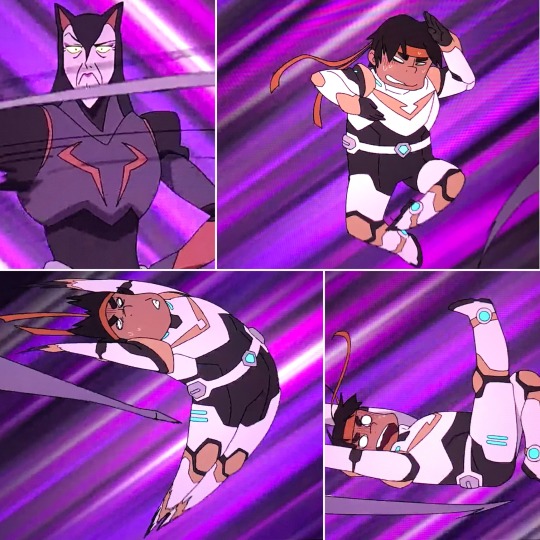
The training is about pain, and what pain teaches an individual. “For the mind to learn, the body must be broken.” Palen-bol, meaning “the enlightening pain”, is the Galran way of learning. “The Galra believe combat is the searing light that burns imperfections of every level, from personal to societal.”
Now, imagine Lotor going through the “enlightening pain”, day by day, year after year, palen-bol after palen-bol. My smile upon seeing Hunk’s comedy soon fades away into a desolate expression. What Hunk basically learns is to contort himself into various unnatural poses, to avoid the painful whips of Dayak. When he finally gets it, she congratulates him: “very good”. In order to avoid the searing pain, he must find creative solutions out, solutions that are not always straight paths. Like a tree that grows distorted shapes in a hostile environment, so does one who lives in constant fear and pain.

TEEN LOTOR
The next significant moment in Lotor’s evolution is somewhere during his early teenage years.
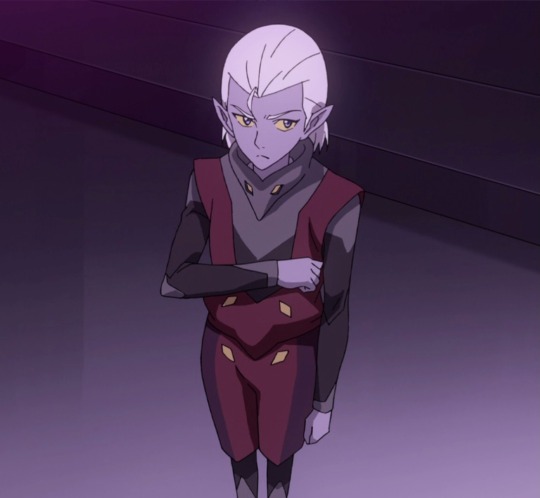
Pay attention to certain verbal repetitions, as Lotor borrows from his father’s language. Also, the Kova scene leads to some interesting conclusions. I’m quoting the entire scene, for better understanding.
Officer: “Sire, your audience is requested in the Kandar wing.”
Lotor: “Father, may I accompany you?”
Zarkon: “You will stay here.”
Lotor: “But I want to join you. I have learned much of our—”
Zarkon: “You are an insolent boy. You may be the prince, but I am your emperor.”
Lotor silently yields, saluting solemnly, but casting a contemptuous look in his wake. After Zarkon has cleared the room, Lotor refocuses on Kova and instantly cheers up. As the boy is leaning over to pet the cat, Haggar suddenly speaks:
“Do not touch him. He will hurt you.”
With a sneer, the boy ignores her. After petting the cat, he asks: “What is his name?”
Haggar: “He has no name.”
Lotor: “Then I shall name it. Your name will be…”
Haggar: “Kova. His name is Kova.”
Lotor, giggling, watching Kova climb over his shoulders: “This creature pleases me. It will be mine.”
Haggar, attempting to protest: “My lord…”
Lotor: “You may be the high priestess, but I am your prince, and you will do as I say. Isn’t that right, Kova?”
Haggar acquiesces: “Yes, my lord.”
So, although years have passed since the scene with Dayak, Lotor is still speaking “out of his place”, which earns him the title of an “insolent boy”.
Despite (most likely) repeated physical punishments along the years, notice how his enthusiasm for life and learning new things is still there, brightly sparkling in his eyes, as he offers to go with his father at important meetings. He is jovial towards his father, as if expecting him to - one day - reciprocate that cordiality, perhaps? This little soul harbors a lot of love and forgiveness, that is for sure!
Despite Zarkon’s stony-hearted reaction towards him, he pouts only as an immediate reflex, but then he cheers himself up by petting Kova.
His impish pout and little frown behind his father’s back foreshadow a future scene - when Zarkon will return to the throne, sending Lotor away. A more refined smirk will cross his face as he’ll depart, hiding behind it a more complex scheme than a teenager’s little mischief, but that scene shall be discussed further when I’ll get to it.
This little detail in child-Lotor’s life is an interesting inflection point that shows us how he learns to conceal his inner thoughts and his ploys from Zarkon, and by extension, from the world (remember the comparison with a distorted tree?). We know that adult Lotor is a master at scheming behind people’s back, working from the shadows, hiding himself - something that even Haggar reproaches him: “You say you rule, yet you stay hidden.” It’s something that he learned over and over again as a kid.
“You may be the high priestess, but I am your prince…” Didn’t Zarkon just utter the same thing? “You may be a prince, but I am your emperor…” Little Lotor learns very fast, his mind is a sponge absorbing everything from his father. With this you can pretty much tell how in awe he still is with him, imitating his vocabulary and trying to emulate his demeanor. The attitude is there: he’s proud of what he’s learned so far, he’s self-confident, and begins to have leadership traits: “you will do as I say.” All he does, he does in the name of Galra…
As for the interaction with Kova, here’s how I see it:
When Haggar says, “Do not touch him. He will hurt you,” I believe the meaning is more than just “Kova will scratch you.” Since Kova and Haggar both are infected with the entity, what are the chances that Kova might possess the same potential of sucking out the life of other living beings?
So in this context, I think that witch Haggar presumes that the prince might get injured. She’s unaware that Kova will not cause him any harm, because… what do you know? Lotor also has a little entity; he was born with it. And Haggar has no clue.
The bond they will form for the next ten thousand years perhaps goes deeper than we think. We know from S8 that Haggar was able to get into the minds of her Altean followers, because she infected them with the entity. There is a telepathic communication that forms, and maybe Lotor and Kova form a similar… mental bond? I’m inclined to believe this theory for several reasons: 1) in S8, Honerva is able to find out Lotor’s location only after probing into Kova’s mind. 2) Narti was also mentally bonded with Kova, and she could see through the cat’s eyes (which stirs the question: did Narti have the entity as well?)
Deep breath.
Are you ready for one of the hardest scenes in VLD?
YOUNG ADULT LOTOR
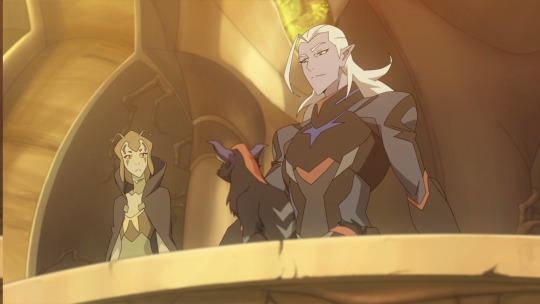
“Are you nervous?” asks Ven’tar.
Lotor replies with a confident, affected voice, looking up and proudly surveying the grand plaza, filled with thousands of people cheering him. “No, Ven’tar. This is my chance to finally make a difference. To show my father what we are capable of.”
Besides the fact that he nonchalantly displays his cat at the edge of his balcony, for the masses to see, notice the expression on his face, his eyebrows. He is pleased with himself, proud of his achievements, proud of the people in front of him.
What he says is also very significant, because it comes to show that Lotor, despite a lifetime of abuse and trauma from his father (and neglect from his mother), still believes there is good in him. He wants to “show” him what he’s capable of.
Oof. The need for validation. Why do people seek validation from others (especially from their family)? You guessed it: mainly because during their childhood, they did not receive enough praise or encouragement.
Overachievers are, oftentimes, love-seeking people who try to compensate for the lack of approval by trying to reach even higher goals, in the hopes of getting the love they need. In that note, here’s what Lotor tells his father:
“Our quintessence yields are some of the highest in the empire, and we’ve been more efficient than any other. By working alongside the denizens of this planet, like Ven’tar here, we’ve outsourced—”
“We’ve outpaced even the most generous projections.”
Poor Lotor!
The most horrific introduction into adulthood is about to drop. The hopeful, optimistic, love-seeking prince will see the true face of his father, and it is not a beautiful one.
We don’t know the details of Lotor’s relationship with Ven’tar, but from the fact that she addresses him without any royal titles, we can infer that they are at least friends. He loves the people of this planet, and he enjoys having her around him, so much so that he actually brings her with him to his father. Meet the parents?
Tragically, his father is utterly offended by Lotor’s introduction to such friends. “You dare work with this pitiful race as if they are your equals? […] The heir to the Galra throne should not sully our honor by working with his subjects!”
Yet Lotor has not learned his lesson yet. He raises his voice at him, like an outraged child that believes there is a way to reason with Zarkon.
Transactional Analysis psychology at its best, this scene provides us with a “game” between the critical, persecuting Parent ego and the rebellious Child ego. Enraged that things are not going his way, but hoping there is still a chance to shake his father from his insensitive state, Lotor takes it up a notch (in a game of “I’ll show him, he’ll see!”):
“It is the way my mother’s people would have done things.”
Lotor knows exactly how sensitive this subject is. All his childhood, he has been banned from researching anything about Honerva. Yet here he is, openly and rebelliously admitting it:
“You thought I couldn’t find out about my own mother? About her people? You thought you destroyed every remnant of Altea, but you cannot unless you destroy your own son as well!”
Lotor is now playing a very dangerous game. What he still does not realize is that his father’s reason is gone, his madness is pushed all the way to the dark side of the spectrum. He bargains with his own life, betting that Zarkon won’t harm him or his subjects. What’s worse, he unwittingly bets an entire planet against his self-assured comments (“unless you destroy your own son as well”). Actually, Zarkon will destroy him too, alongside Ven’tar’s planet. Not physically, but psychologically, he sure does.
“Enough!” Zarkon roars back at him.
Yes, enough, because it’s unbearable for Zarkon to even go there. The madness that clouds his mind has abolished any rational Adult from the picture. There is only the Tyrant, and he’s made up his mind.
“You are to crush this planet beneath your heel!”
The rebel child fights back: “Never!!”
Zarkon’s answer completely takes Lotor aback: “Then I will!”
Lotor is still in denial. The most cruel, dark, ugly face of his father is finally revealed to him and he cannot fathom it out. His father is truly capable of the most abominable acts.
Incredulity and desperation drips from his lips: “You wouldn’t. You can’t! Father, wait!”
Father, wait… Maybe, maybe he can fix this… Maybe he can soften his heart with one last plea, maybe he can twist himself one more time to his father’s will, if only he could to save his beloved planet:
“No, please do not do this, Father. Do not make these people suffer for my actions.”
The rebellious child shrinks into a penitent little being who bends to his abusive parent. How can he save them, now, in the last moment?
Alas… “It is already done.”
“I will do as you ask. The people will serve the Galra.” He will bend, he will bow to his father’s will, he will endure once more the whipping and palen-bols, he would do anything to save them! (Isn’t just this scene enough to reveal Lotor’s true character?) Utterly desperate, he runs after him, begging.
But we all know how it all went down...
Waking up to face the image of utter destruction, the fire outside reflects the scorching pain and horror inside him.
“You are hereby banished from the empire. Forced to live out the remainder of your days remembering your failure here.”
Indeed he will remember it for his entire life. After thousands of years, it will be his first and only confession to Allura, spoken, of all places, at Oriande, the most beautiful, celestial site in the universe.
“Have you nothing to say, witch? Surely even you can see the folly of your master’s actions,” utters Lotor through gnashing teeth, back at Haggar, who watches him impassively.
After a tragedy of this magnitude, I’m quite sure many would lose their mind. How did Lotor find the strength to go on after this? How did he preserve his sanity? Or maybe he actually… didn’t?
—————————————
We know a little bit about Lotor’s life in between this event and the first time we actually meet him, in S3E1, in the gladiator arena. From what he told Allura, after the harrowing event on Ven’tar’s planet, he spent the next few centuries searching for clues about his Altean heritage. We also assume it was within that time frame when he gathered the Alteans scattered across the corners of the empire, and brought them to the hidden colony in the Quantum Abyss.
But why his Altean heritage, you ask? He could have simply tried to find his inner peace in other ways… like, I don’t know, let’s say meditating, getting mental treatment, finding an occupation that would give him a different purpose. No, he spent centuries diving into the lost history of Altea, “another culture destroyed by Zarkon.” This was the only occupation that could give meaning and purpose to his life.
Why Altea?
Because it was the culture of his mother, whom he idolized. So much so that he defied his father’s interdictions and followed the Altean customs when ruling Ven’tar’s planet. So much so that when Allura dares to suggest that Haggar might be his mother, he snaps at her.
A child rejected by his father, mistreated, beaten, abused, tries to find refuge and comfort at the bosom of his… mother.
After Zarkon destroyed his heart, Lotor ran straight into the arms of Mother Altea. I believe that as much as the lost Alteans needed him to provide them a safe refuge, he needed them even more. He needed them as a child would need a mother to turn to, a safe place where he could heal his wounds.
I think herein lies the key to understanding Lotor’s mental trajectory and giving a true meaning to his mental breakdown and to the words he utters during the S6 tragic events, as I’ll discuss when we’ll arrive there.
Take a few deep breaths. Stretch your legs.
ADULT LOTOR BEFORE ALLYING WITH VOLTRON
Let’s see what he’s up to, thousands of years after all is said and done, during the new Paladins’ era. Haggar summons him to return as pro tem, and we first meet him in the gladiator arena.
We learn a bit about him from the little gossip murmured between Throk and his crony, watching the show. The “exiled brat”, how they call him, likes to “fight alongside his enlisted men, like a lowly private.”
“Worse than that, his top generals aren’t even pure Galra. They’re half-breeds at best. He has no honor,” Throk continues.
“Some say he allows the planets he conquers to continue to rule themselves. Can you imagine?”
“Clearly he’s a dangerous lunatic.”
This is the general atmosphere in which Lotor enters as emperor pro-tem, but now we know what kind of “lunatic” we are meeting.
His combat skills show his great talent for evasive maneuvers, using the opponent’s size to his advantage. He has adapted perfectly to the hostile environment in which he grew up. Like Hunk learned to avoid Dayak’s stinging crop, Lotor masters the art of evasive maneuvers to the tiniest detail. He easily defeats the big guy, then, with a theatrical gesture, reveals Throk’s hidden agenda to the public (courtesy of Ezor spying around - so we also know he’s got some good tactics to stay ahead of the game).

During his fight with Throk, Lotor makes some interesting remarks:
“You have flawless technique, that I’ll grant you. Still, you must realize at some point, that your repetitive attacks are getting you nowhere.”
“Your tactics are stale. And in the end, your own aggression is your undoing.”
The easy win that Throk provides, along with the dramatic effect it has for the audience, gives Lotor the perfect opportunity to win the public’s heart, by sparing Throk’s life. A novel approach.
“My father built our Empire on the bones of his enemies. But the time has come to change the old ways, and inspire not fear from those we rule, but loyalty. We must not waste our energy fighting to keep our subjects down, but rather multiply it, by allowing those worthy to rise and join our ranks. The Universe can no longer doubt our strength. Each ally gained only makes us stronger, while those who continue to stand against us… will be crushed.”
Wise words of a visionary man with a progressive agenda, he seeks to dislodge the old ways of the regime.
“The masses are easily manipulated,” he tells his generals as he returns victorious. “Have Throk transferred out to the Ulippa system immediately. Let him rot with the ice worms,” he beams a wicked smile.
So where’s the “each ally gained makes us stronger” promise?
Well, Lotor is intelligent enough to weigh the quality of his so-called “allies”. Would Throk really be someone “worthy to rise and join his ranks”, after he just plotted against him? There is a Latin proverb - “viperam sub ala nutricare”, or “to nurse a viper under your wing” - a caveat that you may not want to keep vipers too close to you. And Lotor’s survival instinct keeps him far away from such vipers. Actually, he is constantly on the watch for vipers - a trait that I shall repeatedly point out, because it reveals his paranoid tendencies, born of his turbulent and traumatic past.
From this episode we learn that he is a calculated man, who sends spies ahead of him to assess the territory, who knows how to win the public’s heart through inspiring speeches and amazing warrior skills, and who has a keen eye for discerning friends from foes. Bottomline: a very guarded man. Does he seem duplicitous and a bit suspicious? He sure does, but does he really hide evil intents? As a first-time watcher of the show, that would be the instinct. But reading the story backwards - meaning, starting in the true chronological order, from his childhood - we begin to comprehend the true reasons behind his exploits.
——————————————-
The following episodes reveal his brilliant tactics (of course, he practiced since he was a kid):
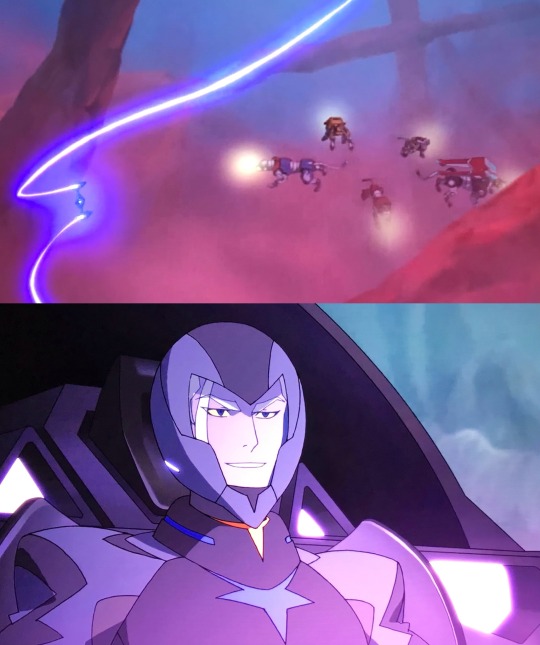
He easily lures the Paladins into multiple traps (Planet Puig, Thayserix), manipulating the battles in order to learn more about his opponents, all while enjoying himself. Not even looking to take them down, he simply wants to test their aptitudes and capture them if possible.
Ignoring his more impetuous generals, he knows when to retreat. “A leader must know when to leave the field of battle.” Something that Keith, as the new leader of Voltron, learns just now, for the first time. In many ways, the Paladins are learning new things via Lotor, and they’ll continue to learn from him throughout the seasons. As the EP’s also mentioned in multiple interviews, at their core, Lotor’s intentions are good, but his methods are not always as clean as Voltron may desire. He is operating not only from how he was raised, but also from the experience of his traumas, and we are given plenty of examples throughout the following seasons.
Lotor learns form every occasion, turning it to his advantage. The fact that the Lions can still form Voltron is “an opportunity”, which he fully wields, in S3E4 “Hole in the Sky”. Another trap for the Paladins, he effectively uses them to ‘pull his chestnuts out of the fire’. As he states, “If Voltron disappears from our world, then we win. If they make it out with the comet, we’ll take it from them. It’s a win either way.” Put that against his more tame clarification given to the Paladins, and you can see why it’s really a gray area where this man actually operates: “I’m afraid I had to be a bit duplicitous in effecting its retrieval. […] It was a calculated risk, I admit that. But I knew they’d come through without a scratch.” The high purpose he pursues (entering the rift) is worth the risks and the prices he’s willing to pay.
—————————————
In S3E5 “The Journey”, we learn something extremely valuable about him - how he has trained himself to be on constant alert about spies (remember the vipers mentioned earlier?). Swiftly apprehending general Raht, Haggar’s assigned secret agent, he decides to pay the witch a visit and confront her directly.
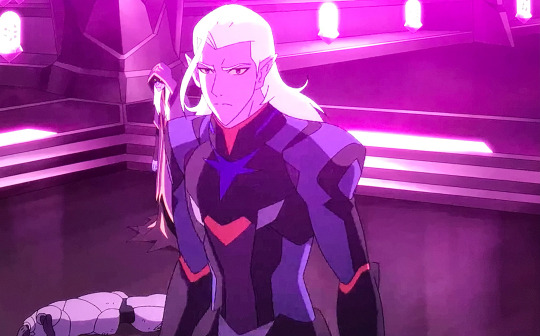
Haggar makes no gesture to deny the allegations, rather twisting the knife in his wound: “I know many ideas float through your head, just like your father, but the Galra Empire needs your leadership in these troubling times.” It almost resembles a domestic scene (I honestly chuckled), as if without realizing it, Haggar talks to him like a mother scolding her child. I find his reply equally entertaining (yet tragic), even his expression taking after that of a child desperately trying to rebel against his family: “I am the leader, but I am not my father!” It won’t be the first time when Haggar reproaches him that he’s not getting involved in imperial matters, only hiding in the shadows. That is his modus operandi - and we’re just beginning to understand why.
————————————————-
The next episode, “Tailing a Comet” holds some keys about what Lotor is up to, but also carries some mysteries which have not been unlocked to this day. We learn that he already used some of the comet ore to manufacture a ship, but we also learn that he attacks a Galra base, in order to retrieve a teludav lens. Again, he’s operating from the shadows. As Pidge rightfully points out… “I thought Lotor took over for Zarkon. Why is he attacking a Galra base?” Because - Haggar, that’s why. We know she’s tailing him constantly and she is the last person in the universe that he’d team up with. In fact, if I get to think of it, Haggar stalking Lotor is the underlying thread of the entire show.
But what of the teludav lens? Clearly, a link must exist between that and the fact that Acxa was sent to retrieve scaultrite from the belly of the weblum, where Keith found her in the first place. Allura rightfully infers that an Altean must be employed to operate it, but she guesses Haggar wrong. Yes, Haggar is Altean, as Allura discovered in direct combat with her, but it’s clear that Lotor does not want anything to do with the witch.
That leaves us with only one alternative: someone in his hidden Altean colony. (Lotor himself seems to not possess Altean alchemy powers to operate a teludav, at least none that we’ve seen). This loose thread has never been elucidated. To spread even more mystery around Lotor’s aura, even his generals have no clue about the true purpose of all these shenanigans. As Shiro says, “something strange is going on here, and we need to figure it out.” Um, actually, we never fully figured it out, courtesy of the garfle-warfled S8.
I found an interesting parallel, and again, a lesson that Keith indirectly learns from his interaction with Lotor: the advice that Shiro gives Keith at the end of this episode: “You need to pick your battles. Sometimes you have to make hard choices.” Similarly, every choice that Lotor makes throughout his life is a battle he has to pick - behind Haggar’s back, as we learn right at the end of this episode, when the witch attempts to pry relevant memories about the teludav theft out of Throk’s mind, while Lotor eavesdrops, behind the corner.
——————————————-
In S4E3 “Black Site” we get a multitude of new details about Lotor’s relationship with his family. When he is called to the imperial court to have his pro tem title dissolved, the first person he encounters as the doors hiss open is Haggar. For a very short moment, Lotor looks startled, and he casts a glance at the witch. Premonition?
As Lotor relinquishes imperial reigns back to his father, the interaction gives a quite fascinating subject of analysis. Lotor is no longer the naive youngling; he has completely abandoned the sincere vocabulary, instead glib words rolling off his tongue. He knows very well that Zarkon and him are never going to see eye to eye, but he did not come there to seek a fight. He’s not (yet) powerful enough to take him down, so the smooth-tongued approach has to be the way. He theatrically attempts an ingratiating offer to stay by Zarkon’s side and “learn” from him, knowing full-well that it will never happen. As expected, Zarkon dismisses him disdainfully.
And here’s the smirk I was talking about earlier:

It’s a rehearsed attitude, it’s the grown-up Lotor, like the tree grown under harsh weather, the prince whose childhood innocence and optimism have been replaced by a cynical, calculated demeanor, carrying out ploys behind his father’s back because the front door was closed a long time ago.
What a confident smirk.
He worked for so long on this plan.
He’s getting closer and closer to achieving his dream. He snatched the comet ore and he’s making his own Voltron. Soon he will be able to enter the rift and get as much quintessence as he needs, for his grand plans.
Unfortunately, his confidence becomes his blindspot, as Haggar taps into the mind connection with Kova.
The sad irony is that he thinks he has Haggar all sorted out, when, upon his departure, he runs a thorough scan of his ship for trackers. The scene screams “paranoia”, except this paranoia is indubitably justified. When you’ve been stalked for millennia by a family who seeks to destroy you, all your senses are sharpened, survival instinct ready to spring in action at any second, adrenalin ready to kick in.
Killing Narti, a huge blow for the team, does not ensue as a mindless knee-jerk reaction. It is a hard choice he makes, for their own survival. He learned throughout his life to decide on the run, and you can see it on his face that he takes no pleasure in killing. Narti falls victim, just like he later admits that he had to sacrifice a few Alteans to preserve the future for millions.
We do not know the circumstances in which he had to sacrifice “the few”, but if they resemble in any way the tough spot he found himself when slaying Narti, we begin to see the trail of tragedies that haunt his life.
—————————————
In S4, Ep3&5 we witness the growing mistrust of the generals towards Lotor. Ezor tells Acxa: “What about Narti? She trusted him. You saw where that got her.”
Notice that Lotor didn’t share some essential knowledge with his generals. The reason why he slayed Narti was because of the connection with Haggar via the entity inside Kova.
I believe none of the generals (except maybe Narti?) knows about the entity, his Quantum Abyss colony and his secret team building the inter-reality gate, based on their behavior along the show. Yes, Acxa might have a stronger loyalty, switching back to siding with him just from a few glance exchanges, but eventually she also renounces him.
In S8E5 “The Grudge”, Acxa explains to her friends in the gym room that “…we had to abandon the animal [Kova] on our destroyed ship so we could escape without being tracked.” This simply implies that she knew about Haggar controlling the cat, but not exactly how she controls the cat.
The rift gate scene also proves that Lotor runs secret operations that he obscures even from his generals (NB: when he deems appropriate, he discloses them). This is his dynamic way of existence: juggling with secrets among people who put their trust in him, in order to protect himself and those dear to him from his corrupt family. The trauma that he endures for millennia force him into wearing these many masks.
After his attempt to enter the rift between realities fails, his generals betray him. Most likely not the first time when people double-crossed him. The difference is that stakes are getting higher and higher, now that he has his own comet ore ships, and will continue to get higher as he’ll discover Oriande, all the more reasons for him to be extremely cautious.
But he’s used to traitors. As a matter of fact, when he wakes up, he says, with a bitter expression, “You plan to give me up. I understand, Zethrid. You do what you must, and I’ll do what I must.” This scene also foreshadows the larger breach of trust, between him and the Voltron team in S6.
Is he justified in keeping secrets from his team? Hell yes. The risk of losing Altea is so great that he has to.
—————————————
When Lotor flies too close to the sun (literally), his comet ore ship proves to be more resilient than Zarkon’s cruisers. As he dives deeper into the plasma, his expression - of desperate survival, of hate against his assailants - borders madness, resembling his turn in S6

Trauma and disintegration of his social connections, two major factors in describing a madness arc, converge right in this chapter.
If trauma from the past is not enough, being hunted by his own father is another straw atop the camel’s back. Not the last one, though. Not yet. More potent factors need to converge, to throw him off the cliff, as we’ll see.
By witnessing him completely alone, we also get a glimpse into his true character.
The moment he learns about the imminent explosion of the Naxzela planet, Lotor heads right into the heart of danger. Why would someone who, all this life, fought for his own survival, fly directly into the range of a galactic ticking bomb?
Because this is how we learn who he truly is. Alone, no external influence or circumstance, no pretend smiles or smirks behind one’s back, he takes decisions based on his true moral compass. If he were the monster the story would seemingly lead us to believe in S6 and beyond, he’d run to cover his own skin. Instead, the worry across his expression reveals just that: genuine concern.

The same genuine concern sits atop his brows as he enters the battle scene, effectively disabling Haggar’s weapon. Finally, after a long string of tragic mishaps, he secures a win. A win which he wittily and swiftly takes advantage of: “Attention, Paladins of Voltron and rebel fighters, I know we’ve had our differences in the past, but… I think it is time we had a discussion.”
BECOMING VOLTRON’S FRIEND
With S5 come Lotor’s brightest and most glorious moments, and along with them, the complexity of his character further augments.
Before I begin, I can’t help posting a side-by-side Loki-Lotor screencap, because Lotor’s prison cell screams the same design concept and I love it, for many reasons.

Also, let’s not forget this sassy first portrait of Lotor as he begins his adventure alongside the Paladins:
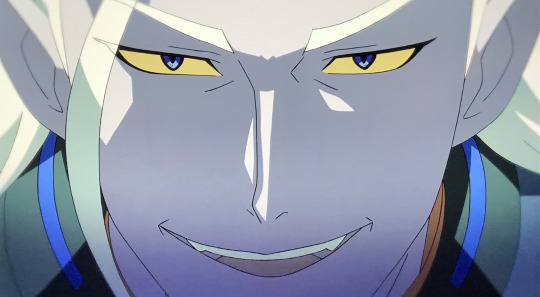
His discussions with Allura and the Paladins while serving prison time in the castle provide us with new details about him, but also lead the viewer into a skewed picture of the events.
#LotorWasFramed, shared by many on social media at the time of S6 and beyond, including by some of the VLD cast members, hints precisely at this skewed view of Lotor:
Allura says to her friends, in S5E1 “The Prisoner”, “I’m still not comfortable with this. It just doesn’t feel right.”
Later in the episode, she reiterates, “I can’t stop thinking that we might be an unwitting part of a much larger ulterior motive.”
Yes, her intuition is right, there is a much larger ulterior motive, but what is the ulterior motive? Is it truly an evil plot?
Well, take Allura’s final words about Lotor, in S8E13 and there you have it, canon-compliant: “Lotor may have been misguided, but ultimately, he wanted to preserve life. Honor your son...”
Highly frowned upon by fans as a meager redemption, truly lacking the complexity that should have reflected the richness of his character, it is, nevertheless, an exoneration, stating in clear that his ultimate goal was to preserve life - and to be more precise, Altean life, the Altean colony. We have to honor his work, because, ultimately, even though his methods didn’t feel right to Allura, even if his methods obscured ulterior motives, those motives were righteous. And Allura’s final statement is canon - one cannot deny that. The end justified the means - it truly fits into how he operated, and we can see why he had to operate that way - not only because he didn’t know of another method, but because the social and political circumstances forced him to.
So, armed with this information, we begin to see how his “ulterior motive” is plotted. He reveals to the Voltron team that his goal is to enter the rift to get quintessence, to flood the empire with a fuel currently deemed a luxury, to effectively “drop the price of oil”. A paradigm shift, a new dawn for the old empire. No more need for blood in order to obtain quintessence. A peaceful era for everyone. And he doesn’t lie. This is his intention. But not a complete picture of it.
What he doesn’t reveal is his precious Altean colony, the one that he hopes to finally be able to release from hiding, once peace has been established within the empire. In a future dialogue, he will state precisely that: “I’ve dedicated my life to preserving Altean culture. Now that we’ve unlocked the quintessence field, all of your people, who would have been hunted long ago, had it not been for my intervention, can live in peace.” Can we blame him for not revealing this to the team? Absolutely not. Knowing that Haggar can plant spies in the most inconspicuous locations, Lotor is constantly on the watch, protecting at all cost what is dearest to him - Mother Altea. And wasn’t he right? There was a mole in the Voltron team: Shiro’s clone.
————————————-
Returning to the scenes with imprisoned Lotor, let’s tap into some subtle psychological hints at his traumatic past.
When Allura calls him “the leader of the most bloodthirsty race of murderers this universe has ever known,” his reply does not arrive in anger, but with a surprisingly calm and pacifying tone, as he continues to sit down: “Can people not change? Is it so hard to believe that I wish to return the Galra empire to a bygone era of peace?” This is not the first time his mixed lineage has been the subject of spiteful remarks. For ten thousand years, he must have constantly heard the “half-breed” denigratory comments. Why would an Altean comment about his Galran blood strike him differently? He surely has grown thick skin by now.
But if these words don’t pierce the thick skin, this comment surely does: “Sounds like you are your father’s son,” says Allura with enmity, after he explains that his sole purpose has been to enter the rift.
This. This hurts. His weak spot. To have him compared with the tyrant who terrorized him for his entire life, what a blasphemy! He snapped at Haggar when she dared utter such words, and he snaps again now.
He stands up, aggravation in his expression, tone raised at Allura, attacking her with a similar family comparison: “It was your father who led the scientific exploration that discovered quintessence. An exploration, I might add, that resulted in the creation of Voltron. This isn’t a zero-sum game. Meeting the needs of the Galra empire means bringing peace to the universe. That is the future enlightenment brings us, one of prosperity for all. […] All I ask is to be judged by my actions, rather than your preconceptions of my race. If that is beyond you, then perhaps you should just finish me and get it over with. Clearly, Princess, you are not ready to end this war.”
This is obviously a subject of deep pain for him, and we don’t need any clarification as to why.
How painful?
World-shattering painful.
Maddeningly hurtful.
At this point Allura is someone he just met. He takes it personally when she compares him with Zarkon. What will happen when he’ll fall in love with her and then she’ll… revisit the same comparison?
Let’s refocus on his conversations with Allura and the Paladins:
Notice how skilled he is in dodging their questions regarding his ploys.
He admits to being “a bit duplicitous”, framing it as a means to a higher purpose - which is not a lie.
He’s not afraid to defend his political beliefs, and even fight back, ending his speech with a comment that emphasizes the maturity of his agenda, while pointing out her inexperience: “Clearly, Princess, you are not ready to end this war.” He does have a ten thousand year advantage over her, that’s a fact. (I also found it quite amusing that the very next scene depicts Allura being nervous about her lines when addressing the Coalition, while Lance advises her to… jot notes down on her palm, because… he does it all the time. Talk about inexperience!)
————————————
While the plot revolving around saving Commander Holt still holds a degree of uncertainty whether Lotor and Acxa were working together, it does seem plausible that Acxa acted in line with his interests, offering Holt to Zarkon, so that Lotor could have his one-on-one battle with his father.
Lotor attempting to convince the Paladins not to hand him over to Zarkon shows once more his tactical skills. He plants the idea of a “royal alliance” into Allura’s head (to Lance’s vocal dismay), and, perhaps due to his attraction to her, or simply as an intent to charm her, he goes as far as saying “You and I”. There is clearly chemistry between them from the start, and it’s savory to watch it unfold. Even as enemies, Allura watches him speak with mesmerized attention, absorbing his every word, and I believe it does not go unnoticed by him, which explains why he brings his focus on the unity aspect, stroking her ego with comments about their parents’ glorious past. His speech is so convincing that Allura already ponders on the “royal alliance” possibility.
The fight between Zarkon and his son is another source of precious details about Lotor. Now is the time for Lotor to speak his mind. When Zarkon calls him “weak” and “darkest shame”, Lotor doesn’t flinch. He’s grown thick skin for such insults. No longer the helpless child, Lotor sees the corrupt Zarkon exactly for who he is, and in this final moment between them, he points out all his weaknesses, especially his obsession for getting back the Black Lion.
The fight, spectacular (and magnificently rendered through animation), displays Lotor’s talent in evading direct blows and his keen eye for his opponent’s weak spots.
I found it so significant that Lotor kills his father not with a bayard, not with a sword, but with a shard of metal lying around on the ground. His desperate yell - “No!” - seeing as Zarkon points his deadly weapon at the Lions, proves once more his genuine concern for the Paladins. He kills his father to protect his allies.
His immediate facial expression is not of joy, not of jubilation, but of deep grief. I’m reiterating this: he does not take pleasure in killing, even his worst enemies. A positive trait that seems to contradict his portrayal after S6, which ties back to the #LotorWasFramed point that I made earlier.
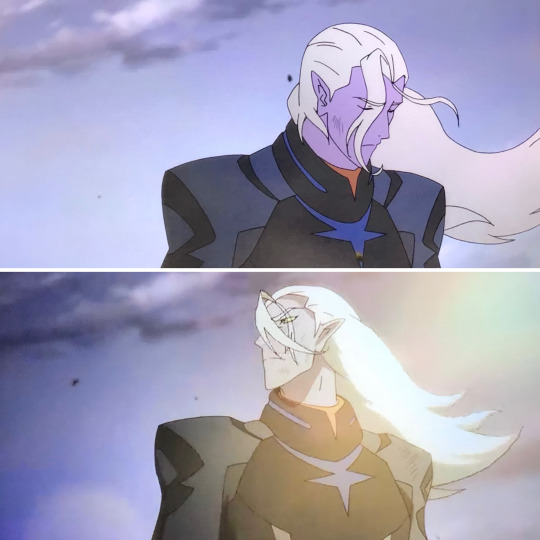
The symbolism of the post-battle imagery conveys the suffering on his expression. As the light, emblematic of the new era that is to come for Lotor, crosses his face, we see the traumatic burden of his past, a burden he carries forward. Even if he killed his own father, the act itself does not erase the multi-millennial painful past.
And we continue to see that trauma etched into his expression on many occasions, including this scene, in the “Postmortem” episode.
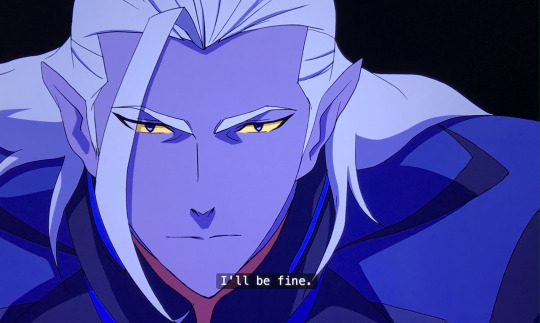
When Allura asks him, “Are you alright?” his dry answer reflects the emptiness inside him, “I’ll be fine.” Someone who wants to bury their pain would resort to similar affirmations. I’m fine. Or… Everything is fine. Or… I’ll be fine.
No, sir, you’re not fine, you won’t be fine until you address that deep level of trauma.
Instead, Lotor pushes forward, because his work is not done. In fact, he’s just beginning.
First, he must take the throne as legitimate emperor.
Then, all his attention will focus on finding a way to obtain quintessence from the rift.
And lastly, his dream of freeing Altea would come to life.
Only after that, he can, maybe, maybe, relax (does an emperor of such a vast and violent empire ever relax?).
—————————————
So let’s begin with Kral Zera. Firstly, Lotor has to convince the Paladins to fly him into the danger zone, and the only one who stands by his side is Shiro, whose tactical experience aligns with his. The tension that ensues among the Paladins makes Shiro walk out of the room, while Lotor casts a regretful look in his trail. He clearly doesn’t enjoy being a source of discord among the Paladins.
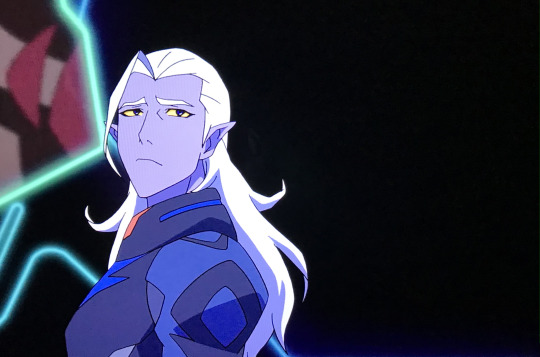
So here it is: his genuine desire for peace and amity. Which lines up with his statements about bringing peace to the empire. And we see it once more as he comments about the Galra forces fighting amongst each other at Kral Zera: “This is exactly what I wanted to avoid. I knew they would all turn on each other.”
This is the true Lotor, underneath the many layers and facades he wears around everyone.
But he is also the wily prince who sneaks out of the castle behind Allura’s back, along with Shiro and the Black Lion. Also, the way he spins the narrative in front of the Galra, boasting about returning the Black Lion to the empire? Genius.
When Haggar insults him about his Altean lineage, he dismisses her with a few words, but we can see the aggravation in his narrowing eyes. Drop by drop, all these upsets and tribulations add up to his already heavy mental anguish that he carried across the eons.
The clash between him and Sendak puts emphasis once more on his fearlessness and deft swordsmanship.
The lighting of the flame carries a solemn, uplifting, yet tragic air to it.
He ascends the battered, collapsing steps of the Kral Zera, perhaps the steps of his destiny, while explosions flare up the skies. He takes the throne of an empire in complete disarray. While he lights the flame, he harbors a stark, but also angry expression, because… why should he be joyful? He’s taking reign over a civilization that has perpetuated his traumas for so long.
———-
S5E5 “Bloodlines” provides a respite from all the anguish we’ve seen so far. He spends time with Allura, searching for Altean clues in Haggar’s lair, and we see the growing attraction between them bloom.
But watch for hints about his past traumas.
When Allura discovers that he is half-Altean, we get Lotor’s direct depiction of his status in the eyes of Galra, as well as his self-confidence in regards to his mixed genes: “It was something the Galra considered a weakness, but I considered it a strength.”
Also, his next words reveal his deep admiration for his mother. He venerates her, and he adores the Altean culture. As much as I want to emphasize the level of trauma that this man has gone through, I also want to bring under spotlight his awe for the mother he never knew, and by extension, of the entire Altean race. Pay attention: “The union between Zarkon and Honerva sparked a technological revolution within the empire. Even back then, Altean culture was remarkably advanced. The kinds of experiments she was conducting… she advanced science by eons.”
Something that always caught my eye was Honerva’s science log itself. Lotor scrolls through her research and we can clearly see the comet ore in one of them, a sphere in another and… the entity inside the tube in a third slider. It’s clearly the entity, compare it with the original image from S3E7:

The fact that Lotor casts a long look at the slides makes me think that he might be aware of the entity. Perhaps this science log will make him understand even more about it?
When Lotor makes a few comments, frowning while inspecting his mother’s science logs, we conclude a few aspects about him and his mother. “By the end of these logs, it’s like they’re written by a different person. She’s frantic, paranoid, erratic. Her reason and intellect are gone, replaced by fear and paranoia.”
This confirms exactly what happened to Honerva (and foreshadows what will happen to him as well). Due to her obsession for power and knowledge and enhanced by excessive quintessence demanded by the entity inside her, Honerva lost her reason, became… a different person. Does that not resonate with how Lotor underwent an apparent abrupt change in S6? The comparison might come across as superficial, but I promise I’ll go deeper when discussing the S6 scenes.
Also, this reveals a much deeper truth about Lotor. He is in denial about what happened to his mother. Pay attention to the scene where Allura suggests that Honerva might have turned into Haggar.
“That witch is not my mother!” snaps Lotor, taking Allura by surprise. Not only he raises his voice at the princess, but he instantly turns his back on her, leading to an awkward moment. I found this instance extremely telling. Suggesting to Lotor that his mother turned into a witch?? Unconceivable!
I’m reiterating this: he ADORES his mother, and he adores Altea. He wants to protect his mother’s image as much as he wants to protect his Altean colony, at all cost. Even if that means keeping the colony a secret from Allura - the princess of ancient Altea - who slowly conquers his heart. Was there a conflict inside him about this? I’m absolutely sure there was.
Another relevant aspect about Lotor is that he’s an Altean culture nerd. Especially the alchemy part. He’s been hunting high and low for Oriande, because his sharp intelligence guided him in the right direction. And with a bit of persistence, he guides Allura in the right direction, too. Together, they unlock the compass stone, and, despite the Paladins’ and Coran’s doubts, Lotor convinces them to “navigate by cave poetry”, eventually discovering Oriande.
—————————————
Lotor has Altean marks? The Marks of the Chosen, no less. I love the attention to the shape of the marks, too. Uncorrupted Alteans display half-moon marks, while Haggar’s look completely distorted, like scars dragging across her face. In between them is… Lotor. His marks are neither half-moons, nor disfigured shapes. Daywalker?
In any case, the fact that he is accepted in the realm of Oriande clearly means that he has potential for alchemic powers.
Even in the celestial beauty of such a place, his mind flies into dark corners, recalling the destruction of Ven’tar’s planet. This should tell you how deep his wounds go, and how desperately they need healing. With such unspeakable beauty around him, his miserable expression only underscores the level of internal trauma.
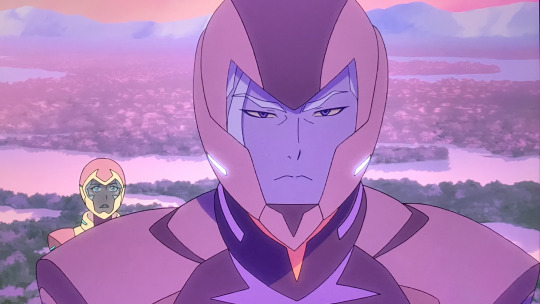
“You know, I envy you growing up with King Alfor. I always wanted to be an explorer and learn about the universe. My father was only interested in conquering it. He once put me in charge of a planet for a year, running the quintessence mining and getting to know the local population. Rather than employ the usual Galran methods of subjugation, I worked alongside the leadership of the planet, learning their customs. We would only extract as much quintessence as could be replenished. And I enjoyed my time there quite a bit. When my father found out what was happening, he ordered me to destroy the planet. I refused, and he sent me away.”
“At least you stood up for those people,” replies Allura.
“He destroyed them all. I was powerless to stop him. I spent the following centuries searching for clues about my Altean heritage, another culture destroyed by Zarkon.”
“I’m glad you’re here to help me now. I never would’ve gotten here without you,” Allura smiles back.
Notice how Allura brings lightheartedness into the conversation, always aiming his attention to the full side of the glass. When he turns around to face her, this is one of his most iconic, beautiful, gentle, hopeful, yet heartbreaking expression in the entire series:
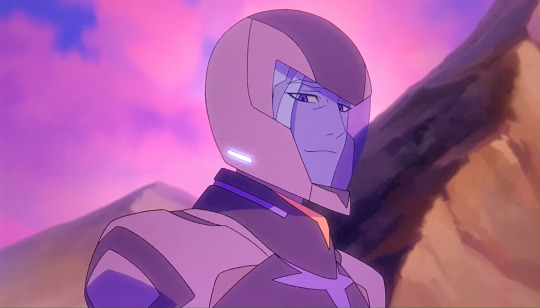
Allura infuses him with optimism, like no one else did before. She is the soothing salve over his old wounds, arriving into his life to open up a bright future. Oriande awaits them, the future awaits them. Hope and love bloom in his heart, and you can read it on his face, overlayed with the fatigue lines etched under his eyes. I know I’ve said this before, but I’m absolutely in love with Studio Mir’s clean drawing style, yet capable of rendering a vast array of emotions with just a few pen strokes.
Inside the pyramid, Lotor makes a few remarks, which reflect his curiosity but also his relative lack of instincts about what to do next. He relies on logic and educated guesses.
“The mysteries we seek are hidden somewhere deep inside.”
“We may yet to prove that we’re worthy to be here.”
“There must be a clue. Something a trained Altean would recognize.”
Similarly, when the Sages attack, his training guides him to apply known and well-rehearsed battle tactics - he’s ducking away from their spears. Allura has the presence of mind to pull out the compass stone, addressing them reverently, and Lotor - behind her - instantly mimics her gestures. Yes, he’s a fast learner, but it’s a bit too late for learning. The trial time is near.
The trial itself provides us with a head-to-head comparison between his tactics and Allura’s. They each apply themselves according to their upbringing, and therein lies the tragedy of his failure.
When he finds himself alone in the celestial domain, what do we see first, glowing in his enlarged eyes?
Fear.
He gasps as he opens his eyes, looks around warily, then calls for her, “Allura?” Without her, he is insecure, because he is not prepared for this; it’s a kind of trial he’d never attended before. (He aced the Galran Agotian trials, yet he clearly struggles here).
Of course calling out for her suggests he might also be worried about her, but I believe - from the hints given so far from their adventure inside the pyramid - that he is genuinely lacking confidence. He even stated so, as they began their journey: “None of my research or travels have prepared me for this. From here, we are on our own.”
And what do Galrans do when faced with their own fears?
Victory or death.
“I will never yield! I will gain your secrets!”
Here, I read pride, anger, determination, unwillingness to give in.

He doesn’t even consider another method; the emotional domino of fear-aggression is ingrained into who he is, from a young age. And in the end… his own aggression is his undoing.
If you take a look at Allura’s demeanor, she does not gasp in fear as she takes in her surroundings. She does not call for Lotor.
“I do not wish to fight. I come here seeking knowledge,” she addresses the White Lion.
“What can I do?” she continues, humbly.
“No. This isn’t the way. I seek the secret of life. I give my own.”
Notice the requirements of an Altean trial:
humbleness in the face of unknown;
non-aggression;
willingness for self-sacrifice.
Lotor, unfortunately, does not display any of these.
In the meditation practice, there is one particular method that helps ease anxiety, worries and fear of unknown. It involves staying with your own emotions, allowing them to unfold, simply noticing and embracing them. Fear becomes a friend which does not need to be battled, but acknowledged.
What Allura did was to basically embrace her fear of the White Lion, to allow the fear to manifest, and in doing so, she conquered it.
Conversely, by fighting with your own emotions, you only prolong your agony.
When the Life Giver tells Allura, “You are home, and the secret is already within you,” we finally understand why Allura passed this trial, and why Lotor failed. If the secret is already within her, she instinctively directs her actions according to the ancient practices and wisdom of Altea, where she grew up. At Oriande she is home.
On the other hand, Lotor is hard-wired into the victory or death philosophy, which guides fear in the opposite direction, that of aggression. At this time, Oriande is not his home, unfortunately. He yells, “No. No!” realizing his failure. It’s a cry of desperation, he’s angry with himself for his defeat.
It’s ironic though: he knows that aggression is not the way, yet he himself cannot overcome it. It’s also paradoxical, because he is searching for ways to bring peace to the universe. He preaches peace and prosperity, but he lacks the deeper understanding of how to fully achieve it. Living in such a hostile environment for millennia, we cannot but recognize that this is the way the environment shaped him. Nature versus nurture, exactly the words of one of the EP’s. Also, from the same interview: “It was a very bad hand. That deck was stacked against him in every way in his upbringing. If he had this amazing accepting family that Allura had, he probably would have been a magnificent person. He had to live his life the only way he could, and a lot of that was through manipulation and doing things the only way he could get them done. It’s tragic.” (Source: Den of Geek - The Ultimate Downfall of Lotor, June 28, 2018 - link in comments)
Despite his defeat, I found it admirable that he does not bear jealousy on Allura, honestly acknowledging her magical powers: “You are a true Altean alchemist. Oriande was for you, not for me.”
One thing I’m wondering though: did Lotor ever learn anything from his defeat? He is a fast learner, so how did he internalize this event? I’m sure Allura recounted to him how she came to pass the trial, so did he ever put the pieces together, to figure out where he went wrong?
————————————
After Oriande, Season 6 warms us up to his character even more. The encounter with Dayak in S6E1 provides us with precious comic moments that further humanize his character. Suddenly, he is not the stiff emperor with a royal demeanor and parlance, but the teenager who’s embarrassed about his mom, while trying to look cool around his buddies, which subsequently suggests that he cares about his relationship with the Paladins, also proven by the way he introduces them to Dayak: “These are my colleagues. They have more than my permission to speak.”
In addition, their dynamic gives us a moment to ponder on the type of Galran education he received. Now that we are fresh from the Oriande experience, learning how Lotor grew up - under the constant threat of the whipping pain - provides a better perspective into the kind of cards life handed him.
In the same time, let’s not vilify all his upbringing. As a prince, Dayak offered him the highest kind of education one could receive: “The history of our conquests, our customs, battle philosophy, the art of war.” Yes, they are all veered towards war-related matters, but those are subjects of vital importance to any nation, even in times of peace. The end of S8 will have Allura basically learn to navigate this dark side, guided by ghost!Lotor and the entity. As much as Lotor needs to learn from Allura, she also needs to understand and absorb his wisdom.
If one needs a summary of Lotor’s past, find it right within Lotor’s speech, broadcast across his empire: “Slayer of a tyrant, child raised in the void and taught on the battlefield.”
From the conversation between Lt. Lahn and Commander Bogh, it’s clear that Lotor’s dream of peace is too abstract for his subjects. There are prejudices against him that are hard to tame. Lotor is well aware of them; even his empyreal address reflects this issue.
But one particular conversation raised a red flag to me. At the news of Sendak’s attack on a mining planet, the Paladins offer their immediate assistance. Lotor says, “Sendak would have me respond to his attack and neglect my empire.”
Allura replies with determination, “Voltron can handle this, while you continue to rule.”
Lotor insists, “But Princess, I need you here. Without you—”
“Your plan has waited this long. It can wait a tick longer. We must protect your innocent subjects,” says Allura.
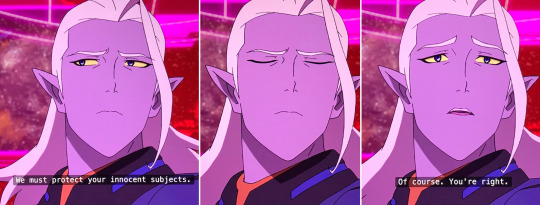
“Of course. You’re right,” Lotor acquiesces in Allura’s decision.
This, right here, introduces a major hint at a future reveal. Is Lotor going to allow an entire mining colony to perish under Sendak’s attack? (“sacrifice a few…” - rings any bell?) When Allura emphasizes “innocent subjects”, I read frustration, impatience… and something more on his expression. He’s obviously annoyed that his plans are being delayed. As he told Allura, “it is paramount” that they focus all their energy on infusing his ships with alchemy. He’s getting so close to his dream, and now Sendak comes to derail him.
This askance look suggests he is hiding something. And we read a conflict within him, in the way he presses his eyelids closed under a slight frown, then reopens them into a forced-amiable expression.
There are many ways to interpret his internal conflict:
which innocent subjects should he focus on first? The Alteans - his most precious people - with whom he hasn’t been in contact for a while, or the mining colony attacked by Sendak? What if the Altean colony is in danger of peril as well, and he’s tied up with empyreal matters?
maybe he is simply embarrassed that he let a “little” mischief slip past his mask? He’s never been put in a situation like this, working alongside honest, compassionate people, who care for the lives of others. Not that he doesn’t care overall - on the contrary, all he does is because he desperately wants to pacify the empire and ultimately free his Altean colony, but the way he goes about it requires cutting some… corners; translation - sacrifices.
maybe time is of essence; perhaps he knows things we don’t know about his colonies (there are many unresolved things about the Altean colony plot, so here I can only speculate).
all of the above?
In any case, this little detail adds an extra tint of gray to his character.
—————-------
S6E2 and E3 elevate the relationship between Lotor and Allura to a level of trust and fondness for each other that we haven’t seen them develop for others. Lotor genuinely loves Allura, something confirmed in interviews with EP’s. He is not simply using her for his secret agenda. What is blooming between them is real, and you can see it in the way he behaves around her, the gentle hand touches, the almost-kiss interrupted by the Paladins, their discussions while working on his ships, his excitement to share the “grand news” about the progress he makes on his Sincline. Allura is beginning to be the soul-healer of his past traumas; his optimism is soaring. He is able to relax more around her, as he truly trusts her.
————------------
S6E4 (“The Colony”) begins with Lotor, facing his Sincline ship, ready for the trip to the rift, telling Allura: “I’ve waited an eternity for this. […] It means so much to me to share this with you.”
The moment of his life. He’s waited for this for thousands of years. Thousands. Not decades, not centuries. The anticipation, the emotion, it must be like nothing he ever felt.
I loved the reference to the DotU little technical terms, as they prepare for the trip of a lifetime: “Infracells up. Dynotherms connected. Mega-thrusters are go.” It gives their relationship even more meaning and legitimacy in the audience’s eyes.
Pay attention to the comments the Paladins make, as Lotor and Allura enter the rift:
Lance: “Last time anyone got in there, it turned Zarkon evil.”
Shiro: “Zarkon fell prey to his own evil instincts. The quintessence field didn’t create them. It revealed them.”
I’ve used Shiro’s comment in the analysis of Honerva and Zarkon’s arcs as well, but the fact that the writers chose to insert it right before Lotor’s trip to the rift is a clear enough hint (albeit “evil” and “instincts” have nuances, just like Lotor’s numerous character shades).
When they enter the rift, there is a moment where Lotor’s eyes narrow a bit…

That, right there, is Lotor’s cunning expression he often displayed in the episodes before befriending the Paladins. It clearly points out to us that there is more going on in his mind.
An evil plot? This would be the immediate thought, right? Especially immediately after Shiro mentioning “evil instincts”.
Or maybe it isn’t an evil plot, but its execution is… less clean (“Lotor may have been misguided, but ultimately, he wanted to preserve life”). Hence, the evil-looking smirk. #LotorWasFramed?
“What we do here today will change the course of the universe forever,” says Lotor, while measuring the energy readings inside the rift.
Allura ponders over the quintessence effects, “In the hands of the wrong person, this power could easily corrupt.”
“Together, we’ll see it never does and continue the work your father started so long ago,” Lotor replies.
Two things:
Another warning: Quintessence in the hands of the wrong person…
“Together”: Yes, if they split up, things will go sideways.
“I can feel the quintessence coursing through me,” says Lotor euphorically, as they travel through the rift.
Allura, ecstatically sighing, replies, “It’s like my spirit, my whole being, is more alive.”
Quintessence is the space-drug of the series, it’s no doubt about that, even the EP’s have made the comparison. A double-edged sword, capable of conferring supernatural abilities and sensations, yet destructive enough to turn you into a Zarkon.
Not only Lotor is feeling its effects, Allura does too. Keep this in mind as I’ll discuss upcoming events.
For the first time in eons, his stars are aligned in the best possible way. They “accomplished something amazing” - entering the rift and collecting quintessence. He has the most powerful princess in the universe by his side, the gifted alchemist he so sorely needed for millennia. His plan is coming along fabulously.
But I think the most amazing accomplishment is that they finally confirm their feelings. The kiss happens. The bond that forms in their hearts is a potential catalyst for extraordinary changes, within themselves and to the universe around them. Double, triple euphoria for him.
-------------------------
Can this man’s life turn any more tragic?
The moment of… (alleged) truth happens. The moment we find out, through Romelle’s story, that Lotor has been harvesting Alteans for their quintessence, for generations. The conclusion of her accusations is that he has been draining the Alteans for his own power and glory.
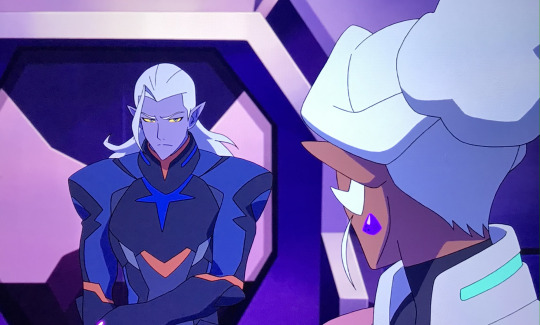
(Notice the general expression of guilt: self-hugging, chin dropped to the chest, peeking from underneath his frowned eyebrows)
DESCENT INTO MADNESS
Let’s see, from Lotor’s perspective, what shocking events he goes through, to understand the underlying cause of his mental breakdown in S6E6.
1. Physical rejection by the woman he fell in love with.
Right after the high of their kiss and their rift breakthrough, he finds himself at gunpoint, accused of mass murder.
In reply to their accusations, Lotor says, “You know nothing about what you speak. […] Allura, listen to me. I’ve dedicated my life to preserving Altean culture. Now that we’ve unlocked the quintessence field, all of your people, who would have been hunted down long ago had it not been for my intervention, can live in peace. Were some lives lost in the process? Yes. But they were martyrs to a noble cause. I sacrificed a few to preserve the future for millions. Allura, do not let this ruin everything we’ve worked for. Think of what we experienced in the quintessence field.”
From what he says, we can deduce exactly what I’ve pieced together so far: that he was deeply preoccupied with preserving the Altean life and culture - he “dedicated” his life to it. This was his purpose in life, it was what he cared most about, and every action, every little or grand mischief that we’ve seen so far along the seasons, they all point to one sole purpose: pacifying the universe so he could bring his Alteans out of their hideout, so they can “live in peace”. They were his Mother Altea - metaphorically, the mother he never had.
His explanation is vague enough that we don’t understand some essential aspects about the “martyrs”, but also, his approach to Allura, right after such horrifying news, touching her hand while reminding her of what they “experienced” in the rift, obviously rubs her the wrong way.
Fresh from the rift with a dose of ultra-pure emotional enhancer called quintessence, Allura reacts violently, without seeking more answers. From here, things quickly roll downhill.
2. Being taken hostage.
3. Facing the truth about his mother, Haggar/Honerva.
For some reason, this event in his life never seems to be a subject of much discussion. I believe this holds a large role in his traumatic rollercoaster before the battle with Allura. The discussion with Honerva reveals the fact that he is still in denial about his mother’s downfall. His fists tremble in anger - another sign of emotional gravity.
According to him, his mother “ceased to exist when Honerva drew her last breath”, while Haggar represents an “abomination”, “a twisted perversion of what was once so pure and beautiful”. If you want a little Transactional Analysis (TA) parallel, this is exactly Child-Lotor from the other reality, saying: “No. My mother is dead. And you cannot replace her!”
What I find even more dramatic is that his entire life he’s been compensating for his lack of maternal love by completely immersing himself into the Altean culture, while his biological mother did everything to thwart his efforts to connect with his maternal legacy.
This is a huge blow to his internal set of values, and the fact that he reacts with total denial suggests (again, applying TA) that, with his fears confirmed, Child-Lotor feels cornered, afraid, trapped, thus his reaction of rejection towards her.
Bear this in mind, because I believe at the core of Lotor’s tragic turn in this episode resides a wounded Child.
4. Attempting to fix it, under pressure.
He is being punched from ALL directions.
Yet he persists.
His urgent priority? Finding Allura.
Even though Acxa explains that it will take a while to get back to the castle of Lions, he replies: “Then what are we waiting for?” I read desperation, a rush to try to fix things.
Although Allura tossed him to the ground, he holds no grudge against her.
Why does he return to her?
Why not the colony?
After all, it was his most precious planet in the universe! Oh, but this is not a tactical decision… It clearly stems from his emotions - he will soon confess it as well - because he truly loves Allura.
The fear of losing her is greater than his fear for the colony. Now that the secret is out, now that he knows that clone-Shiro was Haggar’s spy, it must be clear to him that his colony is completely exposed. The Altean civilization that he worked so hard to protect from the evils of his parents is inches away from being overtaken by Haggar, yet he flies right back to Allura! How telling!
Oh, but the way the story frames it leads us to believe that he wants to get back to the rift due to his greed for more power, because that was Allura’s conclusion about why he was returning: “He needs to get back into the quintessence field.”
No he does not. His Sincline can jump in and out of the rift at his own will, so he can access the rift from anywhere. He explicitly said to his generals that, “We’re headed to the Castle of Lions’ last known location.” (S6E5) He’s not headed to the rift, he is headed towards ALLURA.
“Accessing the quintessence field has been Lotor’s singular drive for millennia. He wants to harness the power for himself, but we cannot let him,” says Allura in S6E6. Wrong. What did he just explain to her earlier? “Now that we’ve unlocked the quintessence field, all of your people, who would have been hunted down long ago had it not been for my intervention, can live in peace.” Accessing the quintessence field does not reflect his final goal, it is a means to a higher purpose: freeing the Alteans.
5. The fallout. The dam-breaking moment.
Let me start by saying that Lotor is generally a calm and composed character - a mask he has built into his persona and practiced it for millennia, because he needs to display confidence, not weakness, around both his subjects and his enemies. It is the way of the Galra. Also, the attribute of a leader.
That doesn’t mean he does not show moments of panic or outbursts of anger. On the contrary, we witnessed them along the episodes: when killing Narti, when flying into the solar flares, the moment he kills Zarkon, when snapping at Allura… These little slips hint at the true emotions roiling underneath his mask. Most of us understand this mechanism; think of school exams and how anxious we felt inside, despite displaying a relatively calm expression while entering the test room.
Given the extraordinary tension of the negative events that befall right after his most triumphant moments, what are the odds that behind this façade, Lotor’s anxiety is at an all-time high? The fact that he does not show it yet doesn’t mean it’s not there. But we’ll begin to see it, as soon as he starts talking to Allura.
En route to Allura, Lotor tells his generals: “Zethrid, Ezor, my deepest apologies for lying to you both, but in order to gain the princess’ trust, and make the Paladins of Voltron believe we were truly at odds, it had to be done. […] Today we will gain access to unlimited quintessence, and together, we usher in a new era of power.”
Did he just slip back under another one of his facades? Did he truly trick Allura and the Paladins? Perhaps yes, but not in the way we are led to believe.
What he says is true - he did have to pretend to be at odds with Zethrid and Ezor in order to gain the Paladins’ trust. Imagine the chaos (not that we wouldn’t have enjoyed it) these ladies would have brought to team Voltron. Would Lotor risk his reputation with such “scoundrels” around the innocent Paladins? I mean… Zethrid replies, “As long as I get to blow something up, I’m good.” That wouldn’t fly with Allura.
Lotor basically gave each side what they expected to hear, while he pushed forward with his agenda. In order to gain Ezor and Zethrid’s trust again, he had to explain himself, and he doesn’t really lie, does he?
But what’s up with ushering “a new era of power”? Hehe, this is where we all get tricked into thinking he wants all the power of the quintessence for his own glory, thus we’re mentally confirming what Allura just said: “He wants to harness the power for himself.” Wrong again, and I’ll link this up to his next statements.
After the Paladins destroy the inter-reality gate, they ready themselves for a confrontation. They expect Lotor to come with guns blazing. Hunk even calculates the odds of three Sincline ships to four Lions. Lance, the team lead in Keith’s absence, orders: “Hold your positions. Let Lotor make the first move.”
Well, Lotor’s first move, even after seeing the gate destroyed, is to seek peace. He does not lie in any of his statements; these all tie in together with what he’s been saying so far. “We need not fight today. We are all on the same side. I know what you all must think of me now that you know my past. It doesn’t have to change our future together. The truth is, I want to harness the power of the quintessence field to better the universe, just like I said. Nothing has changed.”
Allura, raising her voice, replies, “You enslaved countless Alteans. Harnessed their life source for your own personal gain. How many innocent lives did you destroy?”
Lotor calmly attempts to explain: “Allura, I—”
“How many?” she roars back, without allowing him to finish.
(What was he going to say? He was clearly going to divulge exactly the key detail we are missing from the colony story, but Allura, whose temper is out of control, diverts the subject.)
After a deep breath under closed eyes, Lotor replies, “It’s true. Many Alteans perished in my quest to unlock the mysteries of quintessence. But I protected thousands more, and I rescued their culture, our culture.”
Comparing Allura and Lotor’s demeanor, it’s clear that Allura is the fire-starter. Not without reason though; from her perspective, one of a victim of mass-destruction, she has every right to be mad, and we, the viewers, sympathize with her.
On the other hand, Lotor seems to keep it together. He truly loves her, otherwise he wouldn’t try so hard for a peaceful solution. Even Zethrid asks, confused: “Why is he pleading with the Paladins? Why are we not opening fire?”
Ezor says, cynically, “I stopped trying to figure out Lotor’s master plan long ago. Too complicated!”
The only one who seems to comprehend what’s going on in Lotor’s heart is Acxa, who casts a worried glance towards him. Worrisome indeed, because heartbreaks are most terrifying, if things go out of control.
“Allura, you must understand I’ve given everything I have to plumb the depths of King Alfor’s knowledge, to unlock the mysteries of Oriande. Please, Allura, we’ve come too far together. Surely, you can see the greatness we’ve already accomplished. There’s still more to come. Join me. We’re on the same side.”
“No, we’re not!!” Allura screams at the top of her lungs, blasting her Lion’s canon at him.
Notice, Allura fires the first shot. Lotor, in response, yells at his generals: “Hold your fire! Hold your fire!” Acxa is sweating in tension - because she intuits how bad this could go. Zethrid is frustrated, while Ezor looks completely confused.
Lotor, keeping it together with his last emotional energy, is desperately trying to reach Allura. His voice trembles from the emotion, from the utter despair and anguish. His pupils have narrowed, eyes wide open. He sees his most precious relationship falling apart, he’s clinging to a last thread of hope. Allura is the one true love he met after ten thousand years of traumas and the most gifted alchemist. He has given everything he had to arrive here.
Altea awaits them. Together they could bring their people out of the shadows, they could rule a New Altea, “a new era of power” as he told his generals.
“Allura, stop! You and I hold the ancient knowledge of our Altean culture. We were meant to be together. My feelings for you are true - and I know you have feelings for me as well.”

Cry as many rivers you need to, because this is the most tragic declaration of love.
Lotor, right here, wears his heart on his sleeve in front of everyone to see. Vulnerable, open-hearted, sincere - perhaps the most sincere declaration of his entire life, he opens himself up to Allura, he puts his trust in her, with all his wounds and unresolved traumas of the past.
Remember the “I’ll be fine” reply after defeating his father? No, he is not fine, his wounds have never healed.
This is why Allura’s reply falls like a guillotine on his already ravaged soul.
“You betrayed and used me. You’re more like Zarkon than I could have ever imagined!”
Comparing him with Zarkon? The one man who destroyed his life, who terrorized him for eons? We’ve seen his irked reaction to this comparison in the past, but now? Now the emotions are at all-time high. His bleeding heart is out for her to see, and she slays it, full-force.
Every trauma from his past converges here. This is the boiling point, the dam-breaking moment. This is where his hope dies. The moment of agency. (As I said in the beginning, at the critical point of the madness arc, whatever breaks the dam is a world-shattering event: extreme grief, total loss of loved ones, closest allies and friends, the breach of trust towards the world, or a combination of these. The character will try to fix the world and/or get back at the ones who hurt him.)
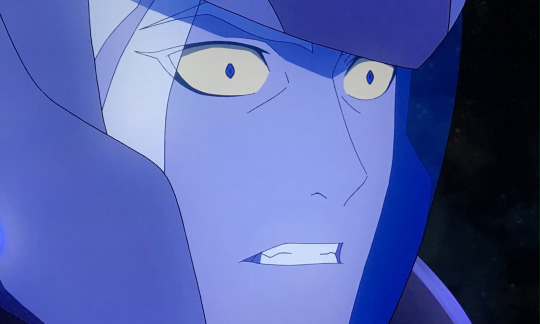
The shrilling noises of the soundtrack make us cringe, like we could feel the shiver that runs down his spine as his heart suddenly grows cold. He replies with a stark voice. “What about your father? He may have been a master engineer, but Alfor was too weak to defend his home world. I’m the one who had to step up and save our entire race. Who are you to question my tactics in bringing peace and prosperity to the universe?”
Remember his similar reply when he was a prisoner in her castle? It’s his gut reaction to a most sensitive subject: his father. She wants to talk family? He’s punching back with brutal opinions on Alfor, because at this point he desires nothing more but for her to feel the same kind of pain.
“Who are you…?” She’s a stranger. Someone who doesn’t have a place in his heart anymore.
“Destroy the Lions,” he orders his generals over a cold expression. He’s made his choice.
Hell breaks loose.
If you think that the negative effects of the rift trip applied only to Lotor, let me put this in perspective:
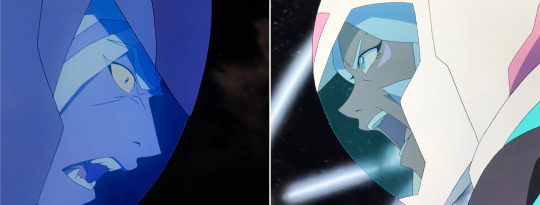
Allura is equally overloaded with adrenalin. And from the battle scene, we can see that she is the one attacking him first, her roar as loud as her Lion’s. As the fight continues, Lotor perfectly executes evasive maneuvers around her, continuing to keep a blank expression, until… he erupts, like a volcano of unresolved, under-pressure turmoil:
“Once I wipe out Voltron, I’m going to start a new Altea. An Altea that will never know of Princess Allura or King Alfor. Nor will they know of the Lions of Voltron. All they’ll know is me, their great leader! Hahaha, I’m ready to wipe the universe clean of all my enemies. Voltron, Haggar, and the rest of the Galra!”
Here’s where many of us got him wrong, thinking that this has been Lotor’s real intention from the get-go: to destroy Voltron and rule a new empire for his own glory.
The only way I can properly explain this is through the psychological mechanisms - not only what goes on in Lotor’s mind, but in our mind as well.
1. Let’s start with us. The script so far played to convince us that Lotor planned this evil plot all along. How did we get tricked? Through all the little hints dropped along the way, which I already pointed out. Our knee-jerk reaction naturally ensues as “A-ha, I told you so.” However, many of us began to have doubts.
2. Shifting the focus back on Lotor, here’s what I said right after the scene with the destruction of Ven’tar’s planet: “after Zarkon destroyed his heart, Lotor ran straight into the arms of Mother Altea”.
I remember, earliest childhood memories, that if I was mad at my dad, I would run to my mom. If I was upset on both of them, I’d cry for my grandparents. It’s only natural that the child seeks love, affection, protection, and as we grow older, that Child within us, with all its basic emotions and needs, continues to coexist underneath our Adult.
The bigger the wounds of the past, the larger the needs of the inner Child.
What happens when the Child within us loses all emotional contacts, all the love and support it sorely needs? When all our friends and allies are gone, when we lose contact with reality, when the closest friend and lover stabs us in our deepest wounds… where do we go from there?
Where did the wounded, cornered Child-Lotor escape, away from the cruel reality around him?
What was his last refuge? His last place where he he would always be received with unquestioning devotion by the masses?
ALTEA.
The Alteans praised him as a god, a messiah, their savior. His statue dominated their landscape.
Altea was his life-long project, the only heritage from his real mother, the place where he poured all his passion (“I’ve dedicated my life to preserving the Altean culture.”). Until he met Allura, that had been his only source of love and joy.
Altea was the family he never had.
Who we see here, screaming and kicking, is the wounded, cornered inner Child, irrational, filled with pure negative emotions. There is no reasonable Adult in the picture, no normative Parent, just pure madness. Fear leads to aggression (the Galra way), similar to his reaction of slaying the Lion at Oriande. He screams about becoming the great leader of a new Altea that will never know of Allura, Voltron, Alfor, etc, because ALTEA IS HIS LAST PLACE OF REFUGE, where he hopes to forget about this painful past. Child-Lotor is hurt, deeply hurt, he wants destroy all who wounded him, then run away into the arms of Mother Altea. He descends into madness with guns blazing, ready to get back at those who hurt him, and in an ultimate irrational cry, he includes the Galra in his list of mortal enemies, because they, too, hurt him when he was a child.
He bitterly comments: “Even my generals betray me!” A self-fulfilling prophecy, as he becomes disconnected from literally everyone.
Acxa yells “Lotor, don’t do this!” as he ejects them one by one from the ships. She knows what he’s about to do - form the Sincline robot, because she worked on building the ships. She knows how powerful it can become and realizes how far Lotor is gone.
Sprinkle quintessence atop the irrational, negative emotions and the cocktail for disaster is right there.
Quintessence “reveals evil instincts” indeed, because
negative emotions are evil,
and emotions are instinctual (the definition of emotion is “a natural instinctive state of mind deriving from one's circumstances, mood, or relationships with others”).
Allura recognizes it during their battle inside the rift, when the Paladins begin to drift into rage. “We have to get out of here,” she yells. “This is exactly what happened to Zarkon. Exposure to all this quintessence turned him into a monster!”
—> So, did Lotor harbor “evil instincts” all this time? Well, we all carry negative emotions. The Paladins did too, when they screamed “Let’s destroy that guy!”, “Finish him!”, except that Allura pulled the plug before they could all become corrupted (the best way to prevent drug dependence is to not get exposed in the first place).
—> Does this confirm that he’s been planning this plot all along, that he truly wanted to become the all-powerful, “great leader” of a new Altea that would obliterate Alfor’s legacy? ABSOLUTELY NOT. It only proves that what happened to Lotor was a tragic descent into madness, a resultant of unresolved mental illness accumulated along the millennia, enhanced by a series of misfortunate events and misunderstandings between him and team Voltron, and blown out of proportions by quintessence (and maybe the little entity inside him, too).
After S6 dropped, viewers were complaining that they did not recognize this Lotor, that this was a different person. Well, remember what he said about his mother, when inspecting her science log? “By the end of these logs, it’s like they’re written by a different person. She’s frantic, paranoid, erratic. Her reason and intellect are gone, replaced by fear and paranoia.”
Voilà.
So then, what did Lotor want when he was in his right mind?
Exactly what he said: to bring Altea out of the shadows, into a universe free of violence. Bonus: having Allura with him meant that together, they made sure the quintessence never got into the wrong hands (idealistic, I know, but the man had a dream). Ruling alongside Allura, the “royal alliance”, would have been his most blissful destiny.
Did he plan on destroying all the Galra? I don’t believe so, because he told Allura that he wanted to “meet the needs of the Galra”.
Maybe get rid of some inconvenient warlords? For sure, they’d all rot with the ice worms.
Maybe install an Altean leadership instead? “A new era of power?” It’s quite possible that might have been in the back of his mind. Who knows, maybe it would have turned just like the alternate reality where the Paladins traveled, where the enemies of Altea were turned into “non-cogs”. Anything is possible, we’d have to ask the writers what they had in mind.
Did he dream of becoming the “great leader”? Maybe not in a megalomaniac way, but he probably envisioned himself as a benevolent emperor, since he had a huge need for validation and love. His giant statue is a testament to that.
Did he want all the power for himself? No. All evidence points to the fact that he was willing to share it with Allura (“royal alliance”), with Voltron, with the Coalition. He even tells them, through boiling wrath: “It didn’t have to end like this.”
Some voices insist that Lotor could have told Allura (at least Allura, not the others) about his secret colonies, but because he was hiding that, it meant that he was hiding evil intents. No, he couldn’t tell anyone, his hands were tied because of Haggar stalking him. When Allura was piloting Voltron, her mind was connected with the rest of the Paladins. If Haggar had access to clone-Shiro’s mind, what would prevent her from tapping into the others’ minds?
“Now we will see how Alfor’s legacy stands against the new Altean defender!” screams Lotor during his clash against Voltron.
Altean… DEFENDER? I know this is irrational Lotor talking, but maybe this had been his plan all along? To create defenders for Altea, machines capable of fending off Galra invaders? If this is what his second colony was all about, then Allura’s visions in S8 also make sense - her mother telling her about protecting Altea against the Galra. Speculating.
As the battle heats up, Sincline jumps in and out of the quintessence field at will. Along with that, we begin to see him turn more and more rogue, as the quintessence gradually poisons him.
“Unlimited power is mine. All realities will fall to the new Altean Empire.”
A new Altea, a new Altean defender, and now… a new Altean Empire. At the peak of his madness, new delusions of grandeur emerge - yes, now he wants unlimited power - but perhaps we can also take a little peek into his secret wishes? He’d dream of replacing the Galra ruling with an Altean leadership? It would make sense, since he loved Altea so much.
These are 100% madness tantrums: if nobody loves me, I’ll destroy all of you and rebuild my own world.
It very much resembles Honerva’s peak of madness: “If I cannot experience the simple joys of life, why should anyone else?” (Translation: If nobody gives me what I want, then screw you all.)
-----------------------------
We know the rest of Lotor’s arc, or what remains of it. Left in the quintessence field, then recovered by his mother in S8E6 “Genesis”, and, for the following episodes, Sincline is dangled in front of the audience like a carrot, only to wave goodbye to his ghost in the end, with a short “he deserved better” conclusion. Oh, let’s not forget about the cOrPse.
—————————————
Earlier I talked about the “alleged truth” that Romelle brought to the story, because up to this date we don’t know exactly the entire backstory of the colony, yet…
A. We were told all along the remaining of S6, entire S7 and almost all S8 that Lotor was
“a monster” (Romelle, S6E4),
“a murderer” (Pidge, S6E4),
someone who “fooled” everyone around him for his own power (Allura, S6E6),
who harnessed the Alteans’ life source for his “own personal gain” (Allura, S6E6),
a man who “preached unity, but in the end he only sought power” (Acxa, S7E3),
who “used” his allies, leading them down “a painful path, a never-ending cycle of destruction and loss” (Acxa, S8E5)
B. Out of nowhere, Allura exonerates him in the last episode of the series, asking Honerva to “honor” her son: “Lotor may have been misguided, but ultimately, he wanted to preserve life.”
So which one is it: A or B?
You don’t suddenly honor someone after you called them “murderer”, power-seeking “monster”, unless… something of extraordinary importance has been unveiled, to properly provide an exoneration of his character.
Was it ever unveiled? No.
Then, rational deduction… #LotorWasFramed?
I think so.
It started as writers’ deliberate story framing (proof provided in my above analysis), leading the audience to believe in a “he-was-evil-all-along” nature of Lotor, with the clear expectation of a much larger reveal later down the series, that would subvert the “villain” trope. In my opinion - based on logical deductions and supported by evidence of altered animation circulating in the fandom extensively, the big reveal was excised from S8, the only clues left residing in… metaphors and visions - Allura’s visions.
Reason of such excision? Just like the tragedy of Lotor’s arc, the tragedy of VLD lied in the conflict between the IP owner’s commercial target (toys for boys aged 6-12 and robot cartoons with classic, simple tropes such as good vs. evil, boy-hero gets the pretty girl, etc) and the actual execution of the story, which deployed complex characters like Lotor, Allura, Honerva, the Paladins, and so on, embraced by a different audience niche. Yet, even if the finale of S8 attempted to erase such complexity in order to realign the series with the aforementioned commercial intent, the creators nevertheless managed to insert their concluding message into the final episode - Lotor ultimately wanted to preserve life - thus, he deserved better.
———————————————
Season 8, although I consider it incomplete in regards to Lotor’s arc (and other arcs as well), does provide us with some interesting hints at what could have been, if the story hadn’t been altered, which would have further elucidated Lotor’s overall arc, because these hints contribute to showing us his true nature.
—> In S8E6 “Genesis”, Sincline has the target locked onto Allura, yet it does not open fire. We clearly see through Lotor’s eyes, as he readies his aim.

There is no doubt that a sentient soul coordinates the decision not to shoot. This reminds me of Zarkon’s singular confession to his son: “She was my only weakness.” Similarly, Allura is Lotor’s only weakness.
This scene begs a series of logical questions (*cough*, I love logic): if a sentient being operates Sincline, how can Lotor be dead? A dead man cannot operate Sincline.
If Honerva uses the entity to remote-control her living subjects and she also remote-controls Sincline, then logic would suggest that… a living subject, infected with the entity, inhabits the cockpit. Not a corpse.
Honerva tells Allura: “I am the only thing keeping my son at bay.” Um, she can’t really keep a dead son at bay, can she?
If he’s alive, then why are we shown the suggestion of a corpse, in S8E10? Or was it another altered scene? NB: static images are easy to redraw.
Also, motes of purple quintessence effuse from the “corpse”. We’ve seen these before, with Zarkon and Honerva right after coming back from the rift.
If the assumptions above are correct, then this scene would further align with what I have said in my previous metas regarding Zarkon and Honerva: the entity’s takeover happens as a gradual progression towards complete disconnect from self. At this point in the story, Lotor would be at the far end of the madness spectrum, completely possessed by the entity and overloaded with quintessence. This would create a coherent story, paralleling those of Zarkon and Honerva.
This theory about Lotor having the entity would also justify the next point:
—> Allura’s visions in S8E8 are a rich source of information.
Just like Honerva can telepathically connect with her subjects via the entity, if Lotor has the entity and he has a strong attachment to Allura, then he is telepathically causing her dream.
Since what Lotor tells Allura about the entity turns out to be true, why wouldn’t the other elements of her dream be true, too? (“nothing ever truly goes extinct” = he’s not really dead; “we both seek to destroy Haggar” = Lotor has been fighting Haggar all along; he’s showing her how to fight Haggar, because that’s how he did it in the past - and that can be seen as an explanation for his second colony, because it clearly implies that sacrifices have been made).
If Allura’s dream provides an allegory to Lotor’s second colony, it would justify the meaning of Lotor’s words: “they were martyrs to a noble cause.”
Also, this statement would provide backup: “Many Alteans perished in my quest to unlock the mysteries of quintessence. But I protected thousands more…” If he was looking for a way to use the entity and the quintessence to defend his colony against the Galra, then he was definitely on a quest to unlock their mysteries, to protect the thousands more.
In this context, the heist of the teludav lens in S3E6 has a justification, as he may have intended to use Alteans to operate it, in another one of his “quests”.
Although the origin of the clandestine, pure white vats of quintessence was never fully explained (the quintessence allegedly extracted from the second colony Alteans actually looked quite purple), the story made it clear that Lotor was using the ultra-pure variety to infuse at least his Sincline ships with it. If he calls his Sincline the new Altean Defender, perhaps he tested other vehicles as well, using that pure white quintessence?
These would all tie together his arc, and the last statement of the story would make absolute sense: “ultimately, he wanted to preserve life.”
—> Aside from these remarks, there are many other metaphorical takes to Allura’s vision.
Ghost!Lotor visiting Allura in her bedroom immediately sent my thoughts to a folklore myth that is common to many cultures, from South America to Africa, to Northern and Eastern Europe and beyond. The “incubus” is a demon or a soul that visits sleeping women, in some traditions thought to be a man who was rejected during his lifetime by a woman, seeking to get back to his lost love. A symbol of unrequited love, erotic temptations or female desires, the incubus bears many names, according to each folklore. “I thought you’d be happy to see me,” says Ghost!Lotor, perhaps reading her mind?
“The ancients believed that all of life began with a single juniberry flower.” Foreshadowing the last episode’s rebirth of the universe, perhaps Lotor was supposed to accompany her in the grand restoration?
————————————
Even without S8, my point is that Lotor’s story followed a madness arc, slowly evolving along his multi-millennial life, and subtly hinted at throughout the show. Despite arriving at the same level of insanity as his parents, the reasons for his downfall were truly tragic, and, had the last season been allowed to develop as intended by the writers, Lotor would have been vindicated through a fully-fledged arc, just like his parents - thus, he deserved better and, in my opinion, the writers deserved better. The proof is in the details, and I’ve zoomed in quite a bit during this analysis. VLD gave us an amazing show with complex characters and most inspiring animation art.
This is probably my last meta on VLD. Going forward, I’ll focus more on the bright side of things: fan art and fanfics. See you on the other side! 😘
#lotor meta#lotor#prince lotor#mental illness tw#ptsd#childhood trauma#voltron meta#vld#psychological analysis#lotor deserved better#long meta - whew#I just couldn't stop writing LOL#there is so much depth to this character#I had this meta on my to-do list for a year#finally got around to write it#thanks for reading
47 notes
·
View notes
Text
Speculation on Lotor's Armor
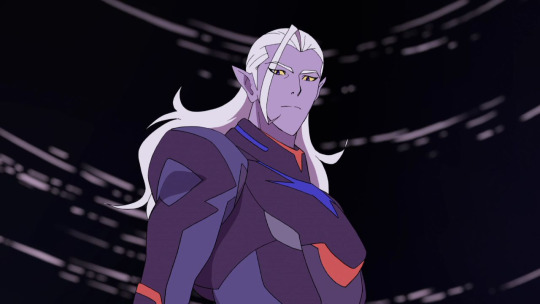
It's time for more unnecessary speculation about Lotor because I miss him. Last time we addressed Lotor's appearance, we talked about what was up with his incredible hair (here), now I'd like to discuss his iconic armor, the potential history behind it and how it services his character.
Even just at first glance in his introductory scene, Lotor clearly stands apart from his fellow Galra and not just due to his features. Even before we see his face, his unique stature and attire speaks volumes about the character we're about to meet as the colors and overall style bears no resemblance to anything we see a typical Galra wear - nor anyone else for that matter - singling Lotor out as a unique and unpredictable individual. So, why does he choose to dress so differently?

One interesting and inescapable truth about Lotor's armor is that it perfectly matches the color scheme of his cat, Kova, to such a specific degree that it can be no accident, so it only makes sense that Lotor himself decided to create or commission a suit to match. But why? Well, given the childhood that Lotor had to endure, it's not hard to imagine the inspiration was simply due to his allegiance to the fellow quintessence-touched creature. A way to honor it as the only true friend and companion he's ever had and the only thing that's ever truly been his or, at least, the one thing he chose for himself. Kova no doubt played a huge role in his lonely life and was probably the only decent thing in it as, for someone who had no real or meaningful connections, this relationship would naturally become incredibly important to him - important enough to showcase visually. In this way, perhaps the decision isn't just a matter of honoring a friend, but also perpetuating his own individuality as defined by his relationship with his cat as something that belongs solely to him.
However, if we dig deeper into this, things get more interesting.
When I was originally writing this meta, I was looking for clues in Lotor's main design that could legitimize the idea that he would have tailored it to honor his Altean side (as he clearly isn't dressed like a Galra), as I think that would make a lot of sense for his character. Unfortunately, there's nothing incredibly obvious in his clothing that matches the aesthetic of the Alteans we see in the show as the style and color palette just don't align. This makes sense, I suppose, given that Lotor would never know exactly how they dressed even if he wanted to emulate them. And then I thought harder about Kova...

Given that he was originally Honerva's pet and she's Altean and therefore is from there as well, one could argue that designing his appearance after Kova was, intentionally or not, reflective of Altean culture to some degree. And if Lotor devised that Kova was originally Honerva's, his signature look could also be a way to remember his mother as well as her culture, both of which he deeply admires and are intrinsically part of himself. At this time, he believes all Alteans to be extinct, making him (and Kova) the sole keepers of their legacy and he chooses to wear that proudly. Ultimately, Kova isn't just his best friend, he's also a connection to his mother and Altea and all the things he holds dear and thus becomes his own personal mascot of sorts.
This decision is also deliciously ironic given that his chosen appearance is simultaneously an unintentional extension of Haggar as well, whom he despises but cannot fully escape. Just as Honerva and Haggar are two halves of the same person and Kova, therefore, belonged to both, the style Lotor chooses is also inextricably a reflection of Haggar just as much as it is Honerva and what they represent to him: corruption as well as purity - which is an interesting contrast in regard to Lotor's character.
Speaking of contrast, it's worth noting that there is, of course, a distinct and purposefully clashing styles between the Galra and Alteans. The former made up of sharp edges and intimidating reds and blacks while the latter is defined by soft shades of blue, gold and pure white. Both designs are successful in respectively encapsulating a race who's known only war and another that promotes peace. With a parent from each, Lotor naturally stands somewhere in between these opposing views both in his internal struggles as well as an outward appearance that doesn't conform perfectly to either. Lotor's style, therefore, is an interesting amalgamation of his roots, an echo of their inherent conflict, and a bold statement to all who see him who he is and where he stands.
So, we have an idea of the inspiration behind the armor, but when did he implement it?
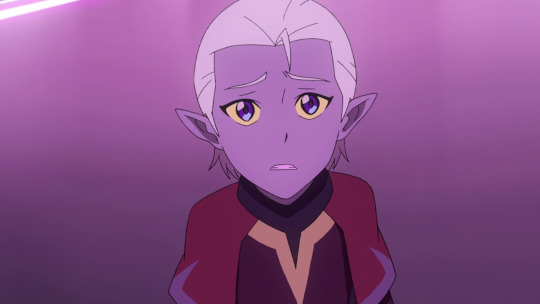
We see in some flashbacks that young Lotor did wear Galran styled clothing. Though he cannot change the reality of his mixed blood, he can try to speak, act and dress as a Galra - all actions that a young prince would be expected to uphold but also probably pushed himself to practice and perfect in order to assimilate himself better into their society and appeal to his father. However, there's a huge unexplored time gap between what we see of Lotor's childhood and him as an adult who has already adopted his very divergent final look with no real explanation. That's why I mainly want to address the flashback in 8x02, as it's the youngest adult version we see of Lotor and marks an influential event that I feel could have had a grander effect with a few tweaks to his design.
At the beginning of the flashback, we see Lotor and Kova together - the proximity affording the audience a strategic reminder of their unmistakably similar color schemes and of their bond. Now, perhaps his appearance remains unchanged here simply to make it easier for the artists and animators so they could avoid designing a new look for him for only one scene, but I personally find it a wasted opportunity to benefit the story further by showing Lotor at a very different point in his life and a different appearance would certainly help reflect that.

Personally, I would have liked to have seen him in more traditional Galran clothing here and maybe even sporting slightly shorter hair - even if only for the selfish desire to see Lotor look somewhat different at some point during the course of the entire show. The hair would help to indicate that he's a little younger here (though we don't actually know how long ago it was) and the traditional armor would supplement the story visually by showing him still bearing some ties to his Galran heritage at this point as he continues to try to prove himself to his father that he is an effective and worthy son. He does want to change things though and help his father see there are other, more merciful ways of reaching their goals and by appearing as a Galra in the best way he can, he could perhaps make his sentiments more palatable.
Of course, things go horribly wrong and this flashback details one of the biggest shifts in Lotor's life. In the span of one scene, he transforms from dutiful Galran prince trying to please his father to exile who has severed all ties to the Galra, all hopes of appealing to Zarkon and is now determined to bring him down. Until this point, Lotor has struggled and failed to be the prince his father and the rest of his people would approve of and changing his entire appearance after his exile would really punctuate his literal and symbolic divergence from the Galra by creating a look and identity all his own with no aesthetic connection to them. Lotor, at last, is taking control over his own life and no longer living in his abuser's shadow. Naturally, the change is openly rebellious - an unmistakable rejection of a culture that rejected him and a slap in the face to all who see him. He's charted his own course and pledged allegiance fully to himself and what he believes in. Lotor's generals are also tasked to wear the same style clothing as him - a clear sign to all who see them to whom they serve.
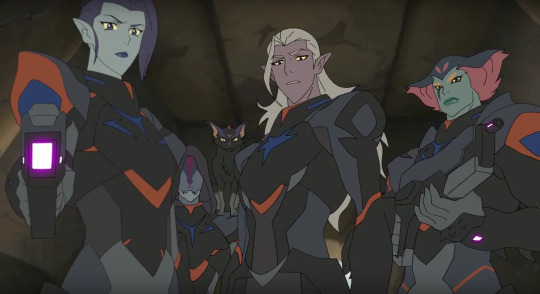
Of course, there could be other explanations that accommodate the writers need for him to maintain this look:
Perhaps Lotor just changed his look as an angsty teen who wanted to rebel perhaps. My issue with this idea though is that I don't think Zarkon would have approved of him dressing as anything less than a Galran prince is expected to and, as we see of Lotor even as an adult in the flashback, he's still trying to present himself the best he can to his father, and I don't think he'd take the risk of angering him just to feel more independent as Zarkon will use any excuse to punish him. I like to think that Lotor's outburst against his tactics in this flashback is the first real time he's ever rebelled against his father, hence the surprise and severe punishment. Lotor would never want to willingly incur his wrath unless over such an important thing as the lives of others - another reason why I think changing into his final look after his exile is the best narrative choice. Only after being formally expelled from the empire, I imagine, Zarkon would no longer care about seeing Lotor maintain a Galran appearance and would no longer protest to seeing him dressed differently.
Or, maybe he only recently adopted the new look while staying on Ven'tar's planet with Kova for a year. Perhaps, in his first real venture outside of Zarkon's shadow and Galran culture, he became more independent, more self-assured and wanted to adjust his attire to reflect that growth. To make something of himself on his own and define himself as an individual who is open to clothing untethered to just one culture. Maybe this decision was also partially bolstered by his inclination to make the people he's leading feel more comfortable around him as well by presenting himself as different than the other Galra they know and fear. Of course, during his conversation with Zarkon, we also learn that Lotor now knows about his Altean roots and that potentially recent discovery could also have played a role in his desire to alter his appearance (using Kova as his muse) as his time away gave room for him to begin to distance himself from the Galra and begin his exploration into his Altean heritage. Again, though, I don't think Zarkon would naturally approve of seeing him in foreign attire (especially inspired by Altea). He doesn't care about Lotor but he does care about maintaining his image as a Galra prince and projecting the strength and authority that title brings over others as demonstrated in this scene.
Ultimately, regardless of the exact origins, this visual separation from the Galra serves to aid Lotor in his quest to transform the universe by presenting himself as someone who stands apart from the rest of his race and their ruthless ways. He's independent with a unique appearance to match his unique manner of leadership and ideas for the future. Presenting a wholly personal choice of style that acts as a natural extension of himself and a love for his Altean heritage as inspired from the only friend he ever really had.
So, there you have it! That's my unnecessarily long take on why Lotor dresses to match his cat.
#vld#voltron#lotor#prince lotor#kova#zarkon#honerva#haggar#v:ld#voltron: legendary defender#lotor meta#vld meta#voltron meta#vld lotor#lotor vld
77 notes
·
View notes
Text
Me, My Self, and I: An Analysis of the Operation Kuron Storyline
Back when seasons 3, 4, and 5 released on Netflix, Voltron fans were split into two camps regarding what was going on with Shiro: One camp insisted that we were still seeing the same Shiro as the one we saw in the first two seasons, while the other argued that the current Shiro was a clone programmed with the memories of the original.
On the surface, the show’s 6th season appeared to side with the clone theory fans, and I saw multiple people who had argued for it being the same Shiro lamenting because they felt that all the development Shiro had gotten after the end of Season 2 had been wasted now that we knew the Shiro we’d been following since Season 3 wasn’t the real one.
Even then, however, fans who supported the clone theory were upset because they felt that the resolution of the original Shiro’s consciousness being transferred into the clone body was effectively killing off a separate, unique character who deserved to have his own life independent of the original Shiro.
Yet while I could understand where both sides’ complaints were coming from, I never had that same feeling of outrage.
At the time, I assumed it was just because I noticed that it served as a bit of meta commentary on how the original 80s cartoon took two identical looking characters in GoLion and melded them into a single character.
But after talking to @leakinghate and @dragonofyang a while back, I realized that there was a deeper meaning and symbolism to the whole Operation Kuron storyline that, in hindsight, I had managed to pick up on subconsciously thanks to being exposed to similar ideas in other stories.
And once I became aware of those similarities, I couldn’t help but look back at Voltron and realize that many of the assumptions the fandom has about the details of Clone!Shiro’s story are not actually supported by the show’s lore.
For example, despite the paladins referring to him as such in Seasons 6 and 7, the idea that the Shiro we see in Seasons 3-6 was a clone in the usual sense that we expect from science fiction - that is, being a unique individual made from an existing character’s DNA with their own separate consciousness who develops their own identity and personality independent of the person they were created from - is not actually supported by the show’s lore.
For starters, the only people who use the word clone to refer to the other Shiro are the human characters, who do not have any intel on how “Kuron” was created. Meanwhile, none of the characters who are involved in Operation Kuron use the word clone to refer to him at any point in the series. In fact, even Haggar herself treats “Kuron” and Shiro like they’re the same person when she’s telling him to lead Keith away in S6E05. When you would think that if there was no point in pretending anymore she would at least acknowledge that he’s not the original.
Furthermore, based on what we are shown of the technological and magical capabilities of the Galra empire, it is not possible for Haggar or the Galra to just download Original!Shiro’s memories into Clone!Shiro’s head.
Pidge and Hunk speculate in S2E03 about the possibility that the Empire implanted fake memories of escaping in Shiro’s head via his prosthetic arm are part of an elaborate trap. But not only are they proven wrong, but the series never even confirms that such a thing is within the mystical or technological capabilities of the empire.
The Galra military is never shown doing anything tech based with memory manipulation or the kind of brainwashing that would be required to make “Kuron” think that he’s the real Shiro.
Meanwhile on the mystical front, the only person in the empire who is shown doing anything that involves messing around with other people’s minds is Haggar.
And the only abilities that we have seen her demonstrate in that regard are:
Looking into someone’s mind and viewing their memories (seen with Zarkon in S3E07).
Using a person as a conduit for Haggar to spy on the person’s allies (seen with Narti in S4E03 and Shiro in Seasons 5-6).
Removing a person’s spirit/consciousness from their body and storing it inside herself (seen in Season 8 with the spirits of the original Paladins).
Forcing someone to comply with her orders and bend to her will (seen with Shiro in S6E04-5, Lotor in S8E06).
Flipping a psychic kill switch and remotely killing someone from a distance (seen with Luka in S8E01).
Projecting someone’s consciousness outside of their body (Seen with Zarkon in S2E03, S2E07, and S2E12).
Transferring a person’s consciousness from one body to another (Seen with Myzax in S1E02 and Prorok in S2E03).
Nowhere does she demonstrate the ability to create an exact copy of a person’s memories and personality that can then be implanted into another person’s mind so thoroughly that they think they are the first person.
Based on what we’ve been shown of Haggar’s capabilities, the only way it’s even possible for the clone to have Shiro’s memories and personality is for Haggar to transferring Shiro’s spirit into a new body.
Which is pretty much the same thing that we’ve already sen her doing when she creates her Robeasts in Seasons 1-2.
She transfers the test subject’s quintessence from their original body into their larger, robotic one. And her words to Myzax in S1E02 Some Assembly Required indicate that the Robeasts are all meant to remain aware of themselves in their larger form and have all of their memories intact.
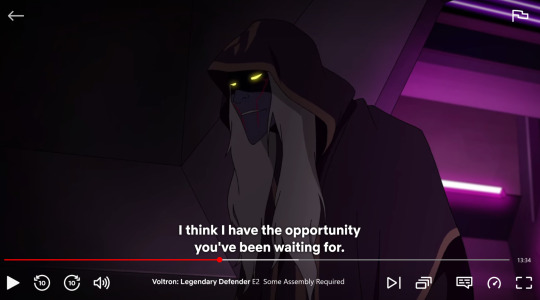
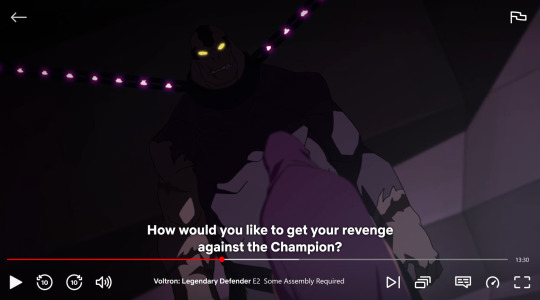
Because why would Haggar bother asking if Myzax wanted revenge against Shiro if he wasn’t even going to remember anything after she turned him into a Robeast?
This basically implies that all of the extra Shiro bodies that we saw at the cloning facility in S6E05 The Black Paladins were basically the organic version of empty Robeast shells - lifeless and incapable of independent movement until Haggar does her ritual to transfer the pilot/model’s quintessence into the new body.
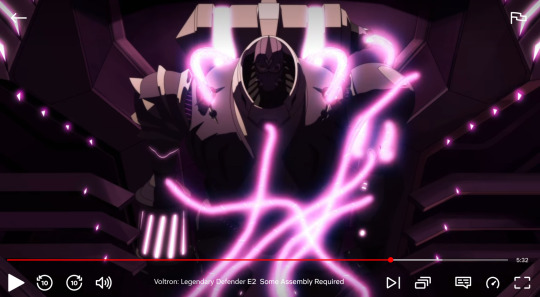
And she has previously demonstrated that physical distance from her target is not an obstacle to being able to transfer a person’s soul from Point A to Point B. Because Season 8 shows that Zarkon was one of the spirits trapped inside her mindscape, even though she wasn’t anywhere near the planet he died on in S5E02.
In fact, “Kuron” being Shiro’s soul moved to a new body would also explain how Haggar and the Operation Kuron staff knew to release “Kuron” when they did. How could Haggar know Shiro was missing from Team Voltron unless she already had the ability to locate, and therefore manipulate his consciousness.
But there’s still one question about the logistics and timeline of “Kuron’s” creation.
Because in S6E06, Shiro indicates that his consciousness has been inside the Black Lion since the end of Season 2.
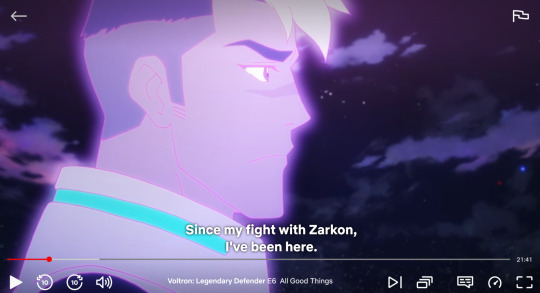
So how exactly could Haggar have yanked his spirit into a new body if he was inside the Black Lion from the end of season 2?
Well perhaps it’s something akin to how Steven’s gem turned into a copy of him when White Diamond removed it in the finale of Steven Universe Season 5.
youtube
That even if she couldn’t get his entire soul before he got absorbed by the Black Lion in S2E13, she only needed a fraction of Shiro’s consciousness in order to animate the new body.
In theory, this could hypothetically allow her to split Shiro’s mind into multiple bodies at once, explaining why S6E05 showed that she had made so many extra bodies.
It would also mean that the merging of the two Shiro’s in Voltron was the equivalent of Steven and Pink Steven fusing back together: Two halves of a single individual being made whole again, rather than one character being sacrificed for another.
youtube
But if the lore indicates that this is one Shiro with two bodies rather than two separate characters, why does Shiro treat his clone self like a separate person?
In one of my older essays, I pointed out how the visuals of Season 6 frame Haggar reclaiming her identity as Honerva in S6E01 as a parallel to Shiro and “Kuron” being merged in S6E07
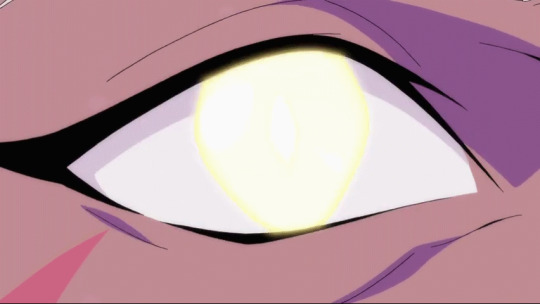
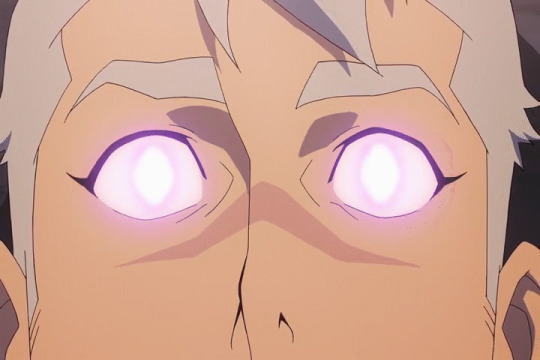
Once Honerva goes through her “merging of two selves”, she tries to distance herself from her actions as Haggar, acting like the things she did to Lotor and others were done by someone else.
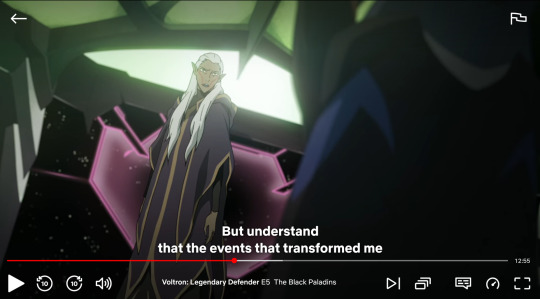
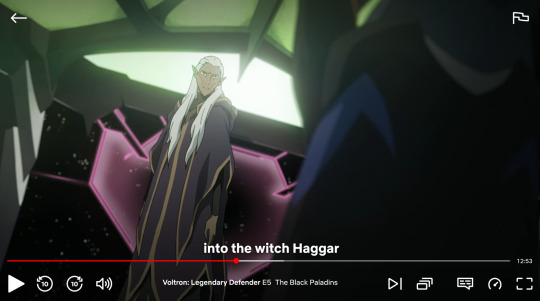
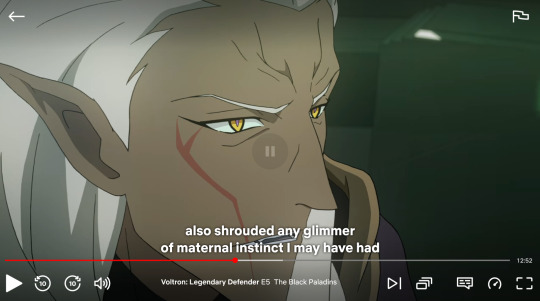
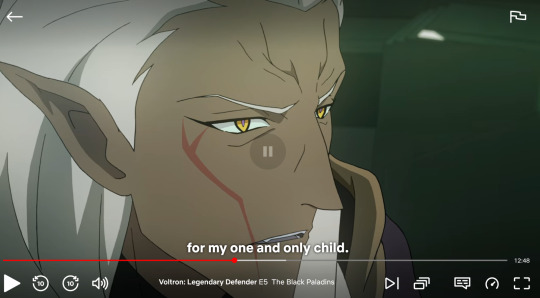
And her reason for doing that is obvious: she doesn’t want to face the fact that she hurt and abused her own son.
So following the parallels between, Shiro treating his actions in Seasons 3-6 like they were committed by a separate person logically reflects a similar level of denial.
Like Honerva, he doesn’t want to face the fact that he’s capable of doing the things he did as “Kuron”.
Because Shiro in Seasons 3-6 is not as patient or compassionate with his team. He’s less considerate of others, and focused on his own priorities above everyone else’s.
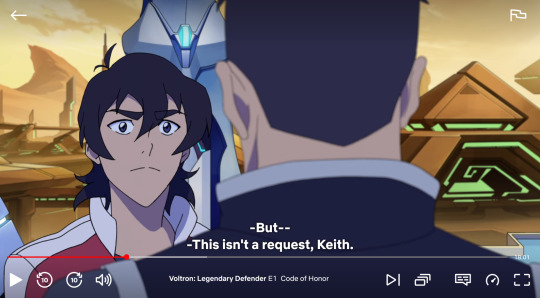
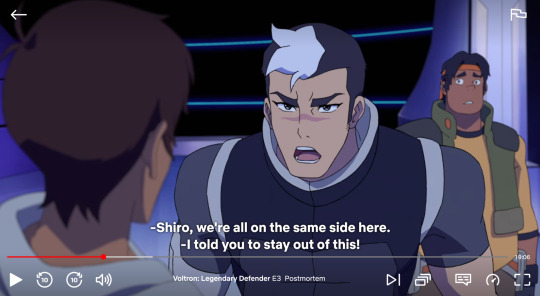
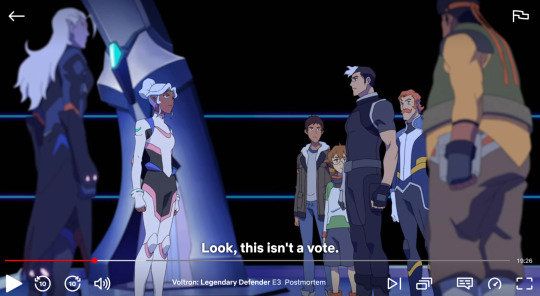
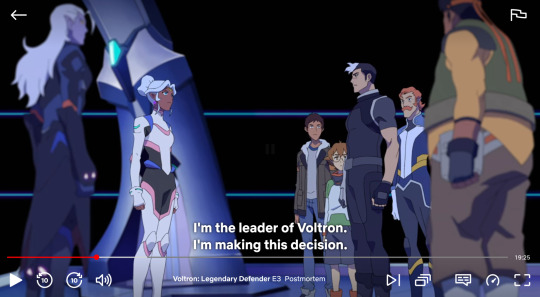
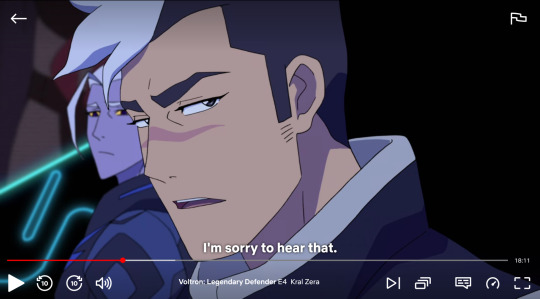
And Season 6, he physically attacks and in at least one case injures the people he cares about.
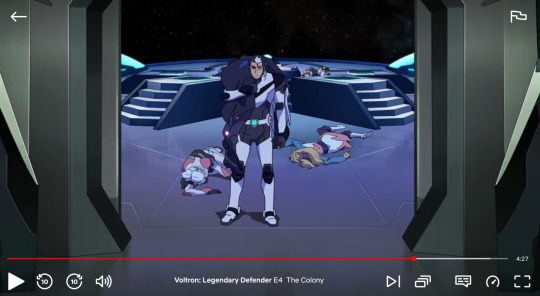
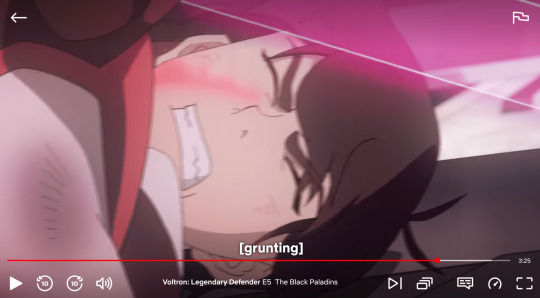
Thanks to WEP’s meddling with Seasons 7-8, the payoff where Shiro recognizes and makes peace with that part of himself got left on the cutting room floor.
But the parallels with Haggar helps to at least make it clear what the writers were going for and what the point of this whole storyline was.
I’ve seen multiple people over the years note that Honerva’s transformation into Haggar, particularly the state we saw her in immediately post-Rift and shortly after Lotor’s birth in S5E02 and S8E02, can be read as a metaphor for Post-Partum Depression or something similar.
If you use their status as parallels to apply a similar logic toward the existence of “Kuron,” then the entire clone subplot can be seen as a fantasy representation of how Shiro is affected by his PTSD.
He goes through a traumatic experience and comes out mostly the same as he was before, but slightly off enough that he doesn’t feel right.
He initially hides his struggles and tries to pretend that everything is fine, downplaying what he’s going through. But eventually the strain starts to become too much and he tries to reach out for help, as we saw him attempt with Lance in Season 5.
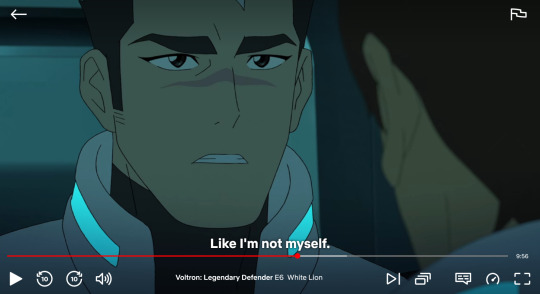
But as we saw, he was brushed aside and his concerns were not taken seriously.
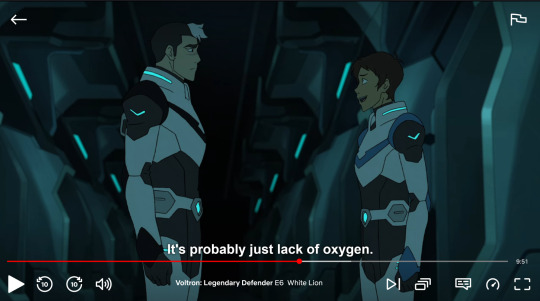
Without support, Shiro eventually reaches his breaking point, culminating in a fight with Keith in The Black Paladins, where - in contrast with his silent and stoic demeanor when carrying out Haggar’s orders - he repeatedly taunts and antagonizes Keith as if he's trying to goad Keith into killing him.
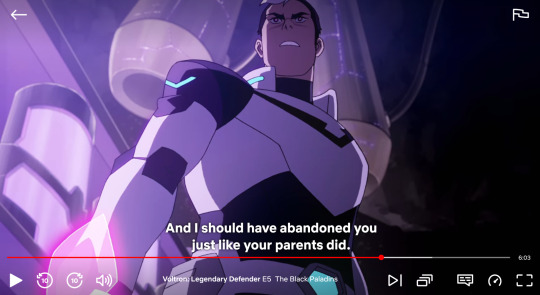
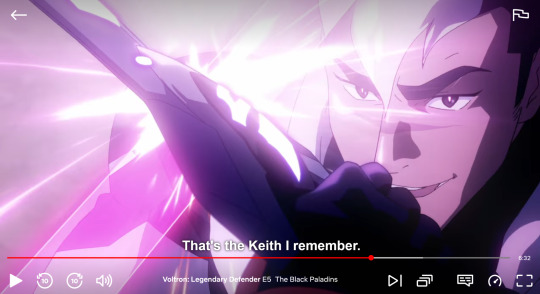
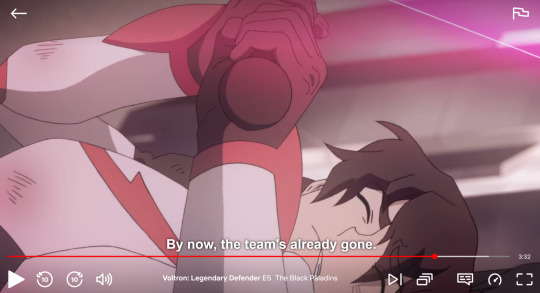
But Keith refuses to leave Shiro or let him die, and makes it clear in S7E01 A Little Adventure that he will never give up on him.
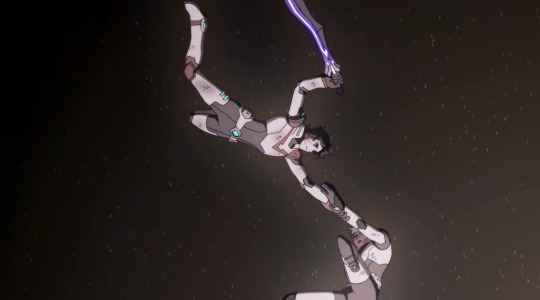
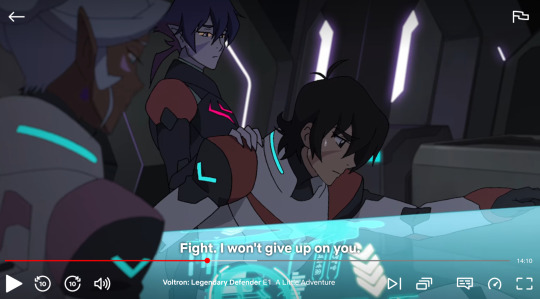
By refusing to let go in S6E05, Keith demonstrates that he will always support Shiro unconditionally, no matter what. This allows Shiro to finally begin to heal and come back to himself.
He’ll never be the same as he was before, but all the pieces of himself are finally whole again.
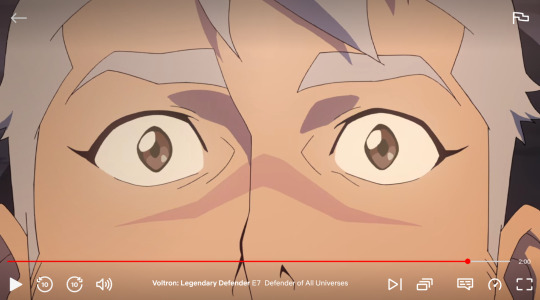
As I’ve outlined in older essays, the main theme of Shiro’s character arc is learning to accept that you don’t have to deal with your problems alone, and that needing support from others does not make you weak.
So when viewed in that context, the entire Operation Kuron subplot serves as a demonstration of what happens when Shiro doesn’t get that help and keeps on trying to deal with his problems alone.
TL;DR: While I understand how the idea became so widely accepted, the concept of “Kuron” as a separate character from Shiro is a fan headcanon that isn’t supported by the show’s lore. Instead, the themes and patterns of the narrative indicate that the “clone” is literally Shiro’s soul in a duplicate body, and the whole Operation Kuron subplot is intended to represent the consequences of his reluctance to let others help him manage his PTSD.
#voltron legendary defender#voltron meta#character analysis#takashi shirogane#vld shiro#operation kuron
70 notes
·
View notes
Text
I’m here
With Twitter dying, I decided to rebrand myself over on Tumblr. All my like 5 followers out there that probably forgot about me, I know so popular. :)
So what will I be doing here on Tumblr
This page I will be dumping my voltron metas and other posts. I plan to submit some to team purple lion, however my main idea’s will be kept here.
1 note
·
View note
Text
its 2018. fall out boy released mania, Brendon urie released pray for the wicked, and twenty one pilots released trench. supernatural is on season 14 without any signs of destiel. Voltron season 8 just came out and decimated both klance and its fanbase. the third trials of Apollo came out and made everybody miserable. dan and Phil are on tour, and the final Phil is not on fire came out. Tumblr is never going to be the same.
#sorry I'm going to a con rn and I'm wearing my lance Voltron jacket which is both layered in meta irony and also very sincere to my past#what a crazy year. I was 13.#fall out boy#panic! at the disco#twenty one pilots#supernatural#destiel#voltron#klance#trials of apollo#riordanverse#dan and phil#dan howell#Phil lester#pinof#I have a genuine love for this period of my life and all of these things (except for Brendon urie)#cringe is dead. I love you fandom
629 notes
·
View notes
Text
Regarding the Blue Lion (More Lion Meta)
It's never explicitly stated what the requirement is to pilot the Blue Lion. But I have my own theory about the lions, based on how much we've seen of the six paladins.
Green and Yellow are pretty straightforward. Green is the keen mind, the flexible strategist, the unflinching heart. Green will keep you on task without losing sight of the consequences.
Yellow is the voice of caution and empathetic connections. Yellow will usually be the first to warn the team away from a threat, and the first to befriend a local. Yellow is often the best diplomat.
Black and Red are a balancing act. Black paladins have a tremendous force of will, and they refuse to give up. But Black can't be without the team, and the team can't be without Black. Black is the indestructible core of Voltron. No matter how fucked up they get, they will not die.
Red is the action-oriented defender. Red is responsible for counterbalancing Black (Alfor & Zarkon, Keith & Shiro, Lance & Keith). If Black is level-headed, Red will be the risk-taker. If Black is impulsive, Red will be the voice of reason. If Black turns dangerous, it's Red's job to take them down.
So what does that make Blue? Blue isn't as fast as Red or Green. Nor does Blue have the heavy armor like Yellow, or the sheer power of Black. So what makes Blue unique?
Blue chooses the hero with a sense of inadequacy. The Blue paladin is the one who thought they'd never get a chance to fly, or fight, but who really wanted to. Blue is the first chance, the first believer.
Blue is also the last goodbye.
Blue isn't built to take hits and survive them, which is ironic because the Blue paladin's way of defense is through life-threatening sacrifice. No matter how many risks Black or Red take, they don't come so close to death as Blue does.
I think Blue takes the loneliest, the most homesick as paladins. For Black, Red, and Green, their anchor is the people they love, and that's all they need. For Yellow, every planet they touch down on has their own beauty. But Blue preserves the memory of a home planet. Blue is the water-logged origin of life (Earth and Altea, both blue).
The Blue Lion picks the unlikely hero who will, one day, have to leave it. Blue is literally the beginning and end of Voltron. But really, that's just how the cycle of water works. Endings, beginnings--this will not be the last story told.
Blue is home.
#voltron#lance mcclain#allura#takashi shirogane#keith kogane#pidge gunderson#hunk garrett#katie holt#my thoughts#it's robot limb meta time#voltron legendary defender#vld
93 notes
·
View notes
Text
I watched voltron recently (ikik it's 2023 voltron's dead etc) so I've become one of the many klance victims who've been sucked into the queerbaiting whirlpool.
Something interesting I've noticed is that klance is regarded as a prime example of queerbaiting and while I'm not disagreeing, ( they had insane chemistry in the first few seasons) it actually wasn't as overt as I thought it would be.
It might be bc a lot of vld fans don't dabble in anime/danmei, so the standards for queer rep in media tend to be lower (you guys deserve better bless). Like how everyone went insane over heartstopper when yoi, given, devilman crybaby, sasaki and miyano, MDZS, TGCF, etc. have been around for a while now, and don't even get me started on bl manga and manhwas. Most Asian shows tend to have a lot of queer coding and rep in general (since fans are more desperate bc of stricter laws y'know) I mean, banana fish, arguably one of the best mlm anime/manga, has been around since the 80's.
I'm used to the "rivals to friends with lots of gay undertones" trope bc I also am a sns victim. Honestly voltron fans got off easy bc if they watched Naruto I think they would foam at the mouth. Sasuke and Naruto definitely had way more development and tension than Keith and Lance, so I had prior preparation for the ultimate sheer disappointment I would inevitably have when watching vld.
81 notes
·
View notes
Text
I know I talk about this sort of thing a lot on here, but...
What makes "fandom drama" worthy of extensive documentation and coverage vs that being considered weird stalker hoarding screenshots for drama/shit stirring?
I'm still reading through the tale of Msscribe and *that* included publicizing IPs to try to prove she had multiple sockpuppets and was even fabricating her own harassment. And her defenders at the time said that even the attempt to publish IPs was creepy stalker behavior along with all the other "defamation."
I haven't gotten to the big Cassandra Clare controversy deep dive, but I know part of that is because she published books. Then the "who owns het omegaverse" drama is widely documented because it's a lawsuit.
Lindsay Ellis covering that got her sent some unactionable legal threats herself. Which brings me to the Homestuck fandom (these sorts of things will *always* bring me to the homestuck fandom) in which Sarah Z got legal threats for just *mentioning* the Kickstarter kerfuffle and linking to Gio's blog.
Which maybe that doesn't count since it involved the actual creators/staff and not strictly by fans between fans?
Maybe once I'm done with the Msscribe stuff I will see that the point was to prove that Msscribe did a bunch of shit to manufacture her own popularity and some of her harrassment, so the end goal isn't strict documentation but to collect evidence to draw a specific conclusion. Or, at the very least, let readers look over the provided information and have their own thoughts.
Are we missing out by not documenting other big fandom happenings? What qualifies as "big"? What can we do to ensure preserving information remains separate from a list of receipts or a callout post, especially if it primarily involves one or two people? Is there a distinction outside of how the information gets used, which you can't control as soon as you publish it?
Obviously I think there is some merit to documenting Homestuck fandom... Drama? Occurances? And not just for my own personal satisfaction, but because there are so many things I and other Homestuck readers miss out on by not having been active in the fandom while the comic was ongoing, especially since the forum is gone AND now that there won't be any more book commentary. Homestuck was in constant conversation with the fandom. There's the obvious early prompt-based happenings of the first few acts and how the kids got named, but there's also lesser known trivia like how Tavros is in a wheelchair because fans theorized he was in a wheelchair.
But it's not just Homestuck.
I think having a clear account of the Voltron fandom's shipwars would be really interesting and valuable since, from my perspective, it helped kick off the "antiship" culture that dominates every fandom space today, not even mentioning how the fairly new ability to yell at individual Voltron staff was particularly terrible.
Then there's the various cults of personality that pop up in fandoms. Homestuck had its fair share, for sure, and I think Steven Universe critics had one or two. I'm kinda talking out my ass and going based on vague things I remember, but to me that's all the more reason to preserve "fandom drama".
But how do we figure out what to preserve? How do we differentiate genuine archival attempts or things that need to be brought together to give full context from veiled harassment and stalking?
#jax yacks#fandom meta#fandom culture#fandom history#msscribe#cassandra clare#voltron#homestuck#steven universe#omegaverse lawsuit
40 notes
·
View notes
Text
thinking abt how after the war dissolving the team stuff for voltron feels so weird and how the after is always going to be somewhat of a problem for stories where a group of people are brought together by an experience so intense and life consuming.
it's like how some heroes and vigilantes could never retire. the only way out for them is death or severe permanent injury. the idea they'd just.. stop one day feels absurd. especially because the fight is endless.
you could technically consider the conflict resolved by defeating Zarkon. the big bad is defeated, Earth is protected from invasion, etc etc. BUT there's still the lasting effects of the empire. the environmental destruction, the military occupation of planets, the millions of people who still need to be liberated and rebuild their society; just because the leader dies it doesn't mean there aren't still factions that remain.
then there's the fact that voltron was a team. like yeah yeah sure they don't need the giant robot anymore, but how do you go back to living without these people who share an incredibly unique experience with you?? how do you become a civilian again after such a great conflict that you were integral to? it would take time to get used to living among people who weren't there. who you didn't fight with and you don't know them in the specific context of watching your back.
I know the paladins were so young and never really wanted to fight a war but idk I feel like even if it wasn't the guilt that kept them from fighting when they knew the good they could do, I think it would be incredibly difficult to escape the "fighting for my life and the sake of the universe" mindset. it carried a strong sense of duty.
they'll return home but they'll never be the people they were before.. as much as I'd love to imagine them going on to a peaceful life on Earth it will always be strange because they'll always be a paladin a part of them is always going to live in the universe beyond.
19 notes
·
View notes
Text
Finished Star Trek TAS today and I got contemplative about the science fiction genre in movies and tv
For the record, tas was fine overall. You know it’s fun to laugh at the animation errors I did plenty of that. But it’s decent 70s kids fair. I wouldn’t put it on for kids today mind you, I’d just show Star Trek prodigy, but still. It very much is a product of its time. However at the same time it demonstrates the biggest hurdle sci fi has faced throughout the ages. The obsession with scale over characters.
There’s a tendency in sci fi where when the people working on a given story get seemingly unlimited resources to make a thing look as epic and grand of scale as possible, they focus on that over making the characters interesting and worth caring about. Not always, but generally it happens a lot. You see it with the big three, Star Wars, Star Trek, and Doctor Who. To pick on Doctor who for a minute, they pour buckets of money on explosions and guest stars and having a golem Doctor show up in their season 3 grand finale but the episode that season that’s regarded as peak fiction is the one where the monsters don’t even move on screen. They’re literally just statues.
Star Wars has both the prequel and and sequel trilogies for me to point to as evidence of this. For the prequels it was look at our awesome special effects and fight scenes. Oh shit we forgot make the overarching story understandable and matter to the cast before the third movie. And the case of the sequels also have consistent character development and themes. Oops.”
And lastly Star Trek. While my favorite episode is conscience of the king, my second is the empath. The most cash strapped episode of the show. It was filmed almost entirely on a black stage ffs. And yet I felt more emotion watching Kirk, Spock, and McCoy risk their lives and be willing to die for each other than I did watching agent seven and his cat hack a spaceship in 1968 Florida while Kirk and Spock stalk them.
The reason completing tas brought on this thought process was there were many writers who jumped at the chance to work on this show because of the lack of limitations of live action. Their only limit was their imagination and the 24 minute runtime. And as a result they got so caught up in the spectacle of “look at this cool new alien threat/concept,” that most of the time they forgot or didn’t have time to give the characters anything to do besides solve the problem. Or just rehash old episode ideas. But listen, they could’ve had good character interactions within 24 minutes. Doctor who is the easy one to point at but honestly if we jump forward a couple decades, (and genres) Batman and Superman tas managed to have self contained 20ish minute episodes with heart for the recurring cast. It’s not impossible to do.
Star Trek, Doctor Who, and Star Wars, were not successful just because they had cool sci fi ideas, costumes, and special effects that could be merchandised into eternity. They have endured for so long because people are invested in these characters. And if you cannot convince people to care about the characters outside of pop culture recognizability, then you will not retain an audience through the weaker stories, regardless of how much money you sank into how nice the ship looks. Instead it is doomed to fizzle out. For a contemporary example outside of movies, look at Netflix’s Voltron.
Last example and then I’m done. Netflix’s voltron perfectly displayed how you can get an audience invested in a cast of characters and then squander it because the producers/writers didn’t care about character development. After season 2 stuff stopped being character driven and started going “well the writers wanted to tell a gritty, depressing war story.” And in the end what was once one of the most popular Netflix shows is now only ever discussed in the same vain as game of thrones. Just wasted potential and missed opportunities.
I’ll end this rambling blog by repeating that imo low budget character driven sci fi is better than high budget sci fi focused on worldbuilding and cool shit you can do because of special effects or the fact it’s a cartoon. Limitations help make some of the best stories out there because they force you to think outside the box.
And it pains me that after so long a lot of the people who write this stuff don’t get that.
#star trek#star trek tos#Star Trek tas#doctor who#Star Wars#sci fi#meta#voltron legendary defender#Star Trek meta
29 notes
·
View notes
Text
sometimes i see a post and its like. hm. you actually care very little about the story or characters or plot at all bc all you want is for the token male twinks to kiss.
#i KNOW i know. tumblr. twink kissing website.#but still. genuinely.#my criteria for if i trust someone's takes on voltron are their opinions on allura and hunk. and ships other than klance.#and the non-romantic relationships also. that's a big main one actually.#has not led me astray yet.#like to clarify i LIKE klance ok. i am an enjoyer of them. but idk.....the way that theyre the Only thing anyone writes/cares about.#like yeah klance was done dirty but what about the characters of color. what about the disabled characters.#what about the platonic relationships. what about the familial relationships. what about the themes of war and genocide and imperialism.#what about the very real queerbait that happened right in front of us but everyone ignored#and whined about the fake made up queerbait that happened in their heads.#idk. people can engage with media however they want and its not a horrible world ending thing if they only view it thru the twinks kissing#but i dunno. viewing media with the shipping lens can blind you to all the other things.#AND I KNOW THE IRONY OF POINTING THIS OUT FOR *VOLTRON* OF ALL THINGS. I KNOWWW I KNOW I KNOW.#its not a problem that is exclusively this fandom either i see it everywhere. side eyes buddie fandom.#but idk man. im sick of not being able to find fic/art/meta that is focused on things other than the twinks kissing.#i think thats why im putting such a big focus on the other relationships in quintenary stars tbh. like there IS klance#or will be eventually but its just one of the relationships that will be happening. theyre found family theres siblings theres friends#theres the Themes and the Motifs and the storytelling devices. et cetera et cetera.#anyway this isnt really directed at anyone im just thinking out loud#winter speaks#voltron#anti klance#<- not really???? but i dont want ppl yelling at me so.
11 notes
·
View notes
Note
Hi! I just wanted to let you know that I'm super appreciative of all the hard work you put into your metas! I recently read through your Lotor, Honerva and Zarkon 'madness arc' metas and thought they were absolutely brilliant! I find Lotor and his family endlessly fascinating and think you captured the complexity and nuance of each of their individual stories perfectly! I can't imagine how much time and effort it took you to put all these together, but they deserve way more attention!
Aaaa, omg, omg 😳 Thank you a million times ❤️💝🥰 for such a wonderful comment and a heartwarming surprise in my inbox! I had tears in my eyes as I was reading it. Yes, it took me some time to write these metas, in between work and play - altogether about a year or so, haha.
Your own metas are an absolute treasure and everything that you’ve shared along the years is just so inspiring, so this makes your comment even more touching for me. 🥰
I wanted to send a meaningful Thank You, so it took me a bit to finalize it, but here’s the excited Pidgeon side of me, jumping in joy at your comment, saying “Thank youuu” from the bottom of my Voltron-nerdy heart!

#thank you 😘#you made my day and my week#Voltron#voltron meta#lotor#Lotor meta#Honerva meta#Zarkon meta#voltron legendary defender#vld
17 notes
·
View notes
Text
Lotor: The Man Behind the Mask
AKA The Many Faces of Lotor and Which is His True Face?
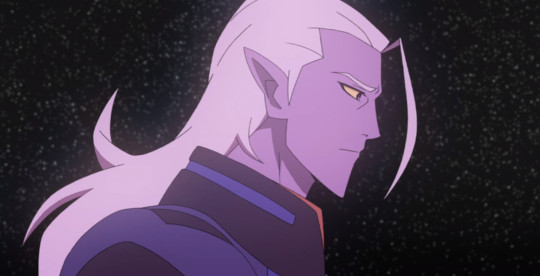
To say that Prince Lotor is a multi-faceted character would be an understatement. Born into a life of tragedy, the many masks he comes to wear are borne of his circumstances to not only further his own agendas undetected but most notably to aid in his own self-preservation both physically and emotionally. A proverbial sword and shield to protect himself. These false faces allow him to do and say what’s necessary to keep himself alive to fight another day - a practice that’s unfortunately hard-wired into him from centuries of abuse.
The character we're first introduced to is probably what the audience expected: an antagonist (albeit a more complex one than expected) that leaves the audience questioning his true motivations. An aspect that makes him more intriguing but also works against him with many fans using it as evidence to validate their worst perceptions of him. But, as we see more of Lotor throughout the series, we begin to explore the depths of him and uncover evidence to the contrary.
So, which is his truest face?
THE MASSES
We don’t get to see Lotor interact with the masses many times in the show, but the most notable occurrences are his introductory scene in the arena and the Kral Zera - both occasions in which he presents himself as a powerful, capable warrior, a persuasive public speaker and a leader worthy of the Galra’s loyalty.
In the first occasion, Lotor almost immediately undermines his previous show of good will towards the assembled Galra by confessing to his generals in private that “the masses are easily manipulated.” This statement would, understandably, leave audience members to believe Lotor is nothing more than a liar and manipulator as a key attribute used to define all of his subsequent actions.
At first glance, this looks pretty damning. Alone, with people we can easily infer he’s closer to, he seemingly reveals that all the magnanimity of his previous words and actions were false and showcase to us a key element of his character to watch out for: an effortless duplicity that is utilized to hide more malicious intentions. At the time, it seems to scream to the audience: ‘don’t trust him’. However, as we learn on his journey, there is more to him that meets the eye, and this line should not be taken at face value.
Before we take this as unwavering proof that he’s a villain and everything that follows should be looked at through the lens of presumed deceit, I think we have to consider the context and audience here. This line was in response to a stadium full of Galra warriors who dutifully and unquestioningly serve his father - someone he’s trying to stop. Swaying the minds of the Galra is a necessary step in his quest to ultimately improve their way of life but he also doesn’t think very highly of them. His regard of them is different than that he holds towards other people and cultures as we see later. I also believe he says this to benefit the generals, but I'll get to them later.
Unfortunately, we don’t get to see him spend time with the members of either of the peoples he looks after, but we do know that he deeply loved his time on the mining planet and there’s no doubt he cared for the Alteans just as much if not more as they were his own people. It’s also not hard to imagine that both groups of people appreciated him just as much. We don’t know how close he truly got to them, but it’s safe to surmise that Lotor is a person that respects others enough to treat them with equality, enjoy working beside them and genuinely wants to improve their lives. Though we later learn that he was ultimately lying to the Alteans, it’s clear that’s definitely not something he enjoys doing.
Among the average civilian or disenfranchised person, we can infer Lotor is more than likely very cordial and respectable based on how he speaks of them and how they perceive him in return. Despite his status as a prince, he’s clearly not preoccupied with maintaining an air of authority among the common folk in any way meant to remind them of his status above them, even allowing himself to bond with people on such an equal level that Zarkon saw it as unfit for his station.
Basically, though we know he has a turbulent relationship with the Galra as a whole, we can also see that he fights for the rights of other half-breeds such as himself and treats people in his care with respect and equality.
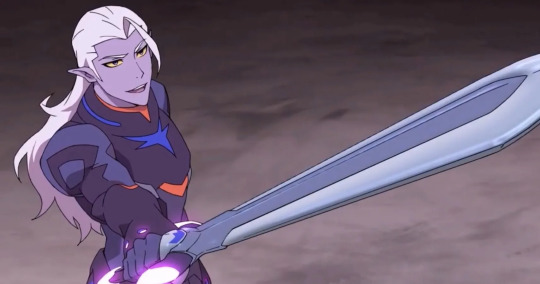
ZARKON
As a child, Lotor had to present himself as the perfect prince in an attempt to earn Zarkon’s love, and it produced a facade he probably maintained most of his life despite it getting him nowhere. Of course, as a child desperately seeking their parent’s affection, this behavior - though tailored specifically to appeal to his father - wasn’t inherently disingenuous and it’s only later in life that he learns to use it as a weapon.
Knowing that Lotor has tried to portray himself as respectable and eager to please thus far, his outburst of anger in retaliation of his father’s demands in 8x02 may have possibly been the first time he’d spoken out against him in such a way as, up to this point, Lotor still seemed to genuinely believe his father would listen to him and is surprised by his decision to destroy the planet. The mask finally slipped but, I might add, only in an attempt to help others. This speaks volumes about the kind of person he is and what his deepest motivations are as it shows he cares more about protecting the mining planet than he does for his own safety as he knowingly incurs the wrath of his violent father. Of course, upon realizing that his interjection would punish them too, he immediately tries to submit himself before Zarkon once more to keep them safe.
Despite his efforts, Lotor unfortunately fails to protect the people and this tragic situation no doubt led him to reinforce the old facade of the obedient son who would never dare act out against his father again - a mask he uses to his advantage in 4x03. After their conversation, we see Lotor smirk suspiciously upon taking his leave, clueing to the audience that his behavior with Zarkon was entirely an act to keep his father from suspecting him of any wrongdoing.
After Zarkon uncovers his ruse, Lotor’s submissive mask drops once more and, upon meeting again, Lotor no longer holds back from sharing every ounce of disdain he bears for his father before fighting him to the death.
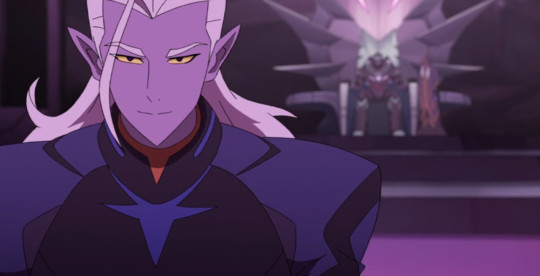
HAGGAR
Unlike his father, where he hides his emotions under a guise of respect and servility initially, Lotor shows no restraint in sharing his unbridled anger and contempt for his mother, Honerva. These feelings never waver, in fact, they only seem to intensify, punctuating a heated final confrontation where Lotor vehemently renounces her as an abomination that he will never accept as family. This distaste seems to have evolved over his life as her role to him changed. As a child, she was nothing more than his father’s witch and not someone he needed to please. Their relationship was never a good one so there’s no need to pretend otherwise.
I believe his anger towards her comes, not only from rebelling against the fact that his mother was essentially stolen from him by Haggar (which shatters his dreams of having a loving mother) but also her mistreatment of him throughout his life and even fundamentally disagreeing with and despising the kind of person she (and Zarkon) are: selfish, power-hungry and uncaring of the lives of others. He denounces them for their behavior because he knows it’s wrong and doesn’t wish to fall prey to it as well - which is a great indicator of the kind of person he is and what values he agrees with and doesn’t.
In a way, this is a true face to Lotor as well. His feelings of unfettered rage towards Honerva are not censored by any mask he’d wish to portray. There is no part to play here as there’s nothing that will keep him safe from her scrutinizing eyes on him at all times. Nothing to hide because there’s nothing to gain from it. So, instead, to keep her off his trail, he goes to great lengths to evade her detection through calculated action rather than any false pretenses.
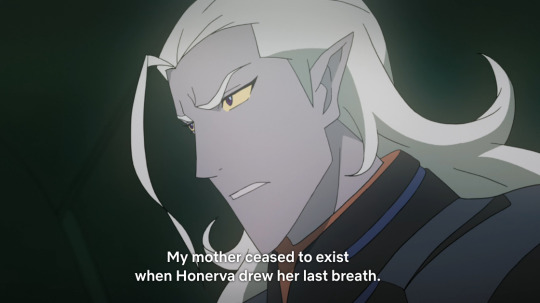
THE GENERALS
Though they’re the closest thing he has to friends for a time, I still don’t personally believe Lotor was close enough to his generals to reveal his true self (though he obviously reveals more to Axca as he trusts her the most). Overall, he still maintains an air of authority with them, seeking to portray himself as the calculating and confident leader clearly stationed above them though he still treats them with respect. Though it’s clear he cares for them, and they hold some degree of respect for him in return, he’s still very much their leader more than their friend. They may believe in him and his mission for a time, but they don’t follow him solely out of admiration and are willing to sell him out if it benefits them - which they do.
They’re, for the most part, his loyal allies, but not anyone he’d confide in or show vulnerability with as demonstrated by his lack of explanation regarding his actions towards Narti and his refusal to share his full plans with them. They respect him for a lot of reasons but don’t entirely understand him or what he truly wants which is why they often seem perplexed by his decisions. With them I think he maintains, to a degree, how he would present himself to the general masses. He has to remain collected and in charge to preserve their loyalty to him and can’t sully that depiction with the perceived weakness that comes from showing vulnerability.
Jumping off my earlier statement about the “masses are easily manipulated” line, it ties into the perpetuation of the persona he’s trying to evoke to them and which they whole heartedly support. He’s telling them what he thinks they want to hear. We also know he doesn’t tell them the full truth, so why should we believe this is somehow some deep reveal into the center of his character when we also know that he doesn’t showcase side of himself with them? It’s another piece of a persona, nothing more.
This mask was not created in an attempt to manipulate but in a desire to achieve and preserve some degree of companionship and loyalty from his generals. Lotor has no one but them and he can’t afford to lose their fealty, so he tries to keep it in the best way he knows how: by being a successful leader worthy of being followed.
Bottom line, beyond Lotor’s genuine affection for his generals - which is very much an extension of the compassion he’s capable of - he does not show his true self with them.
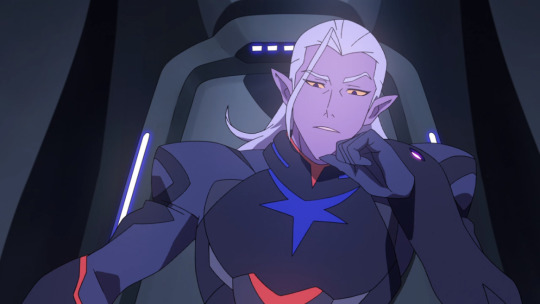
THE PALADINS
Lotor sustains his typical air of confidence upon meeting the paladins face to face in a continuous effort to portray himself as a worthy asset to them (not too dissimilar from his interactions with his generals). Though he shares vital intel with them to prove his loyalty to their shared goals for peace, he doesn’t go out of his way to ingratiate himself to them. He’s cordial and honest, as is generally his nature, but not afraid to share his opinions even if they’re opposing or adversarial.
For example, in their first scene together Lotor has no trouble calling out Allura for voicing her discrimination towards his race and generally seems tired of waiting for the paladins to truly listen to his advice and start making real strides in the war. He's interested in action, not being liked. If he truly wanted to manipulate them, I imagine he would have been far more sycophantic to worm his way into their good graces - an act he’s familiar with due to his father whom he was trying to lie to. We know what a groveling Lotor looks like and this is not it. Of course, there's also no need to lie to them to get what he wants when they have the same goal.
There’s frustration there between both parties at times and definite growing pains as he finds a place for himself in their group, but certainly not anger or resentment of any kind on his part. That being said, when the paladins do come to trust him and there’s no disagreements in their way, Lotor defaults to his natural state: dignified, helpful and amiable. I’m not sure how much affection Lotor truly manages to garner for the paladins by the end of their time together, but he does refer to them as ‘friends’ at one point and though that doesn’t mean they’re people he would necessarily pour his heart out to, I’d say they definitely count as favored allies that he’d support and protect just like anyone else he cares even remotely about.
However, similar to his generals, whatever degree of fondness he may have developed for the paladins is still ultimately moderated to keep them at arm’s length though, I believe that given the proper time and trust, this could have changed.

ALLURA
With Allura, we see a new, softer side to Lotor. I could write an entire meta solely about their interactions and how they’re not manipulative, but I’ll be brief here. As I said with the paladins, there’s no real evidence to suggest Lotor was just saying and doing everything he did solely to appeal to Allura and ultimately seduce her to his side. Instead, what we see is both of them slowly and organically becoming more comfortable and trusting with each other, enough so that they begin to reveal deeper sides of themselves. Just as Allura is willing to share her insecurities with Lotor, he too divulges the innermost parts of himself that he doesn’t reveal to anyone else.
If a mask is meant to hide the deepest parts of oneself, Lotor being so openly vulnerable, honest and trusting with Allura is enough to tell us that what he shares with her isn’t an act - he’s just finally comfortable enough to show his true face and the hidden parts of himself he hasn’t with anyone else. For a man who is all about survival and whom trust doesn’t come easy, this would be counterproductive and a potential liability he normally wouldn’t risk. So why does he risk it for her?
Relationships are built on trust and that takes time and true understanding to achieve. It takes a great deal of trust to reveal your true self to someone and Lotor simply isn’t at that level with the generals or paladins. He hasn’t really had anyone to share his true self with until Allura. He’s never met anyone else like her and their shared history and desires facilitates a swift journey from enemies to friends and even to something greater - an emergence of emotional vulnerability and affection that Lotor has never experienced before: love.
This is an aspect of his identity he’s no doubt unfamiliar with unfortunately or, perhaps, has never truly experienced before in his countless years of being whatever he had to be to survive. As we’re discovering this version of Lotor, he may also be discovering himself too.
There’s so much I could say about their relationship and how it brings out the best in both of them, but I won’t go off on a tangent here. Needless to say, the reason Lotor feels so different in S5-6 is because interacting with Allura is finally giving us the opportunity to see new aspects of his identity that’s open and unguarded. He’s finally put down his sword and shield... which leaves him vulnerable to attack.
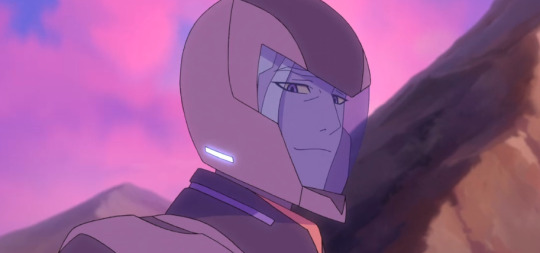
QUINTESSENCE POISONING
I want to address this specifically in its own meta but, for now, I’ll say that I found this depiction of Lotor a betrayal of the character and purposefully over-exaggerated to compensate for and push a narrative the writers failed to achieve organically. Essentially, I believe they made him so villainous - so vile despite how out of character it feels - simply to validate this new agenda that he is and always was, in fact, that very villain and, if that was always their intention for the character, they did not succeed.
Though we know that quintessence can corrupt and see that firsthand in how it turned his parents into beings acting without remorse and motivated purely by evil-intentions, even they have never been shown in such a negative and manic light, making Lotor look even more deleterious here by comparison which is an... interesting choice.
That being said, the turbulent emotions presented here do stem from underlying trauma, namely the pain of being betrayed by the one person he trusted more than anyone. The one person he showed his true face to. The person he loved. Having his true feelings be rejected and touted as nothing but more lies and deception as someone who doesn’t share them idly would be beyond devastating. Now, having put down his shield for Allura, she’s struck at the very heart of him. The pain of it unleashes a tidal wave of emotion and, like a wounded, cornered animal, he lashes out. This creates a situation which we see a side of Lotor we haven’t before. One that, though borne of genuine emotional suffering, does not actually reflect who he truly is.
Exacerbated by his exposure to the quintessence field and perhaps even that which already resides in his blood, Lotor reveals intentions of great evil - last minute motivations stemming from deeply rooted fears and insecurities that, unfortunately, are pulled to the surface here in the worst way possible but are not necessarily indicative of him having harbored and planned to enact these darker motives all along. Recoiling from the pain, it makes sense that his natural defense mechanism would be another mask - the ultimate mask.
If this was the true him, he would have truly fooled us all despite the extensive evidence to the contrary, as there is nothing to support his sudden dark desires here but plenty of prior evidence that refutes it despite the writer’s efforts to show otherwise. To say that all of this is the true, final reveal of who he is after all is insulting not only to the character but to fans.
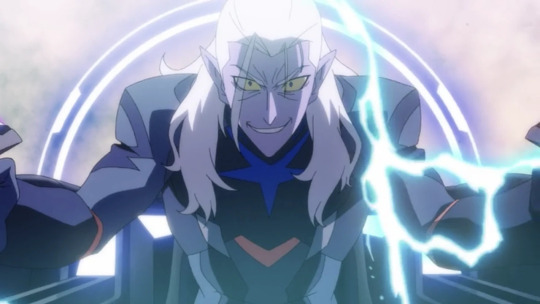
ALONE
To best know who someone truly is, we have to look at who they are when they’re alone. A great example of this is when we see Lotor alone in 4x06 as he overhears a message that there is an on-going attack that will result in mass casualties. Lotor doesn’t hesitate to potentially sacrifice his hard-won freedom to head straight back into Galra territory to try and stop his mother’s heinous plans. This is yet another scenario that showcases that, at the end of the day, Lotor is a character who simply wants to help people no matter the cost to himself.
We also see Lotor alone during his trial on Oriande where upon repeatedly being attacked by the White Lion, he understandably goes on the offensive and fights back to protect himself. After failing this test, Lotor is devastated. Rather than revealing any clues to potential villainy, this interaction instead simply shows that Lotor still has things to unlearn and is aware of that and capable of change. His anger here comes from his desperation and desires for self-preservation upon being attacked, not from a place of genuine malice.
I think it’s also worth noting Lotor’s expressions when he’s in his cockpit throughout the show but especially during his fight with Allura right before his ‘turn’. No one else can see his face but the audience so there’s no one to appeal to. No act to put on. We can clearly see he’s upset and remorseful and it feels like a sudden reversal from his previous scene with the generals because it is - not because his pleading with Allura is an act - but because his talk with his generals was. They are understandably confused here because his recent speech to them would have them believe he didn’t truly care about Allura and was just using her the whole time. This display says otherwise.
To further emphasize this point, his words and expressions here are consistent with his attempts to appeal to Allura in 6x04. The fact that his interaction with her is the same - whether he’s alone or in public - also shows us that it’s genuine. He doesn’t hesitate to share his true feelings to her when he’s trying to defend himself, nor does he bar his words in front of the paladins and generals when he’s trying to talk her down later. They might as well be speaking in private because it wouldn’t change his reaction. He’s completely focused on her and unconcerned with his unencumbered feelings being on public display - something he’s never done before and obviously wouldn’t be comfortable with. All of this continues to prove that, when it comes to Allura, he is his authentic self and his feelings for her are indeed true.
There may be more significant instances of seeing Lotor alone that I can’t recall, but, in summary, if Lotor was truly an evil, selfish person, we’d see hints of that most clearly in the instances where he has nothing to hide.
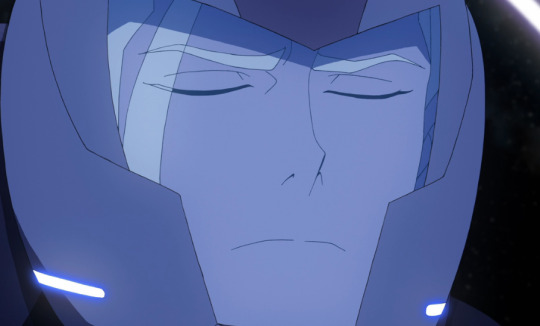
CONCLUSION
So, what is Lotor’s true face then?
As I’ve stated, Lotor is a man who has had to adopt different personas to survive, and we get to see the multi-faceted nature of his character on full display throughout the series depending on who he’s with and in what context. Regardless of some blunders in writing, overall, I think the show did a decent job portraying the different sides of him that would have logically emerged given his unique life and circumstances.
Of course, seeing the ease and skill in which Lotor can slip on these masks would naturally leave audiences to continually question him and his true intentions. As the show reveals more and more of his true self however, the answer becomes increasingly clear that, despite the resulting duplicity of his nature, there is no evidence to support that he's anyone other than someone who wanted to do exactly what he said he did and whose goals are ultimately to help and protect others - a desire which was shown through his words and actions on multiple occasions. For all his faults, Lotor does have genuinely heroic traits despite being raised in an environment that didn’t cultivate them. A flower struggling to bloom in spite of the aridity of the soil in which he was born.
Despite the intended desire to hide his true self for his own protection, these fabricated facades do inadvertently reflect shades of his inner self too - a kernel of truth buried in each even as he has to transform to become what he thinks he needs to be to survive. By default, he tends to hide his true emotions underneath a facade of control and confidence - most notably seen in his interaction with the generals, the paladins initially and the masses (mostly Galrans). This portrayal of the proud and cunning man however is just a front to hide someone underneath who is more concerned with knowledge than power and protection rather than violence and it’s his bond with Allura that reveals the truest face of all: someone who is genuinely capable of kindness, vulnerability and even love. Given the right time and treatment, the inherent goodness in him could have been allowed to flourish and win and his true face could have been the last one we saw him with...
#voltron#lotor#prince lotor#vld lotor#vld#v:ld#voltron: legendary defender#voltron legendary defender#voltron meta#lotor meta#vld meta#voltron analysis#vld analysis#allura#lotura#princess allura#zarkon#honerva#haggar#no4forLotor
178 notes
·
View notes
Text
An Updated Guide to the Timeline of VLD
Last Edit: 07/23/2023
After reviewing my timeline notes in more detail, I decided I wasn’t happy with editing my original VLD timeline guide, but I didn’t want to just delete the earlier meta outright. So I decided to start over and make a brand new meta that reflected my current research notes without me having to constantly go back and edit the old one every time I realized I had missed something.
And boy am I glad I did because in the process I noticed details that I completely overlooked when I made the last timeline guide that trying to edit the original post would’ve led to redoing the whole thing anyway.
So now I present to you my most complete and up-to-date notes on the timeline of Voltron Legendary Defender as of April 2023. Under the cut because this is going to get long.
Part I: The Time Period of the Show
While the show never gives exact dates on when major events in the series take place, we can narrow down when the Paladins left Earth by examining context clues and supplemental material. From there, we can use that to determine a rough idea of the show’s timeline.
Pidge’s flashbacks in S1E05 Tears of the Balmera and the fact that Iverson doesn’t mention her, Lance, and Hunk’s bickering being a pattern when he berates their failure in the simulator during S1E01 The Rise of Voltron indicate that the day of Shiro’s return to Earth was the trio’s first time in the simulator together, and that this was fairly early in the school year.
From a Watsonian perspective, it’s not out of the question that a future Earth might follow a different school calendar. But from a Doylist perspective, since the show never says otherwise, we can take it as a given that since VLD is an American cartoon, the Garrison follows the same academic schedule as American schools. Which start the school year in late summer/early fall and end in late spring/early summer.
At the start of Lance, Pidge, and Hunk’s simulation run in S1E01 The Rise of Voltron, Lance calls out “Galaxy Garrison flight log 5-11-14.”
And Matt’s tombstone in S4E02 Reunion confirms that these numbers represent a date:
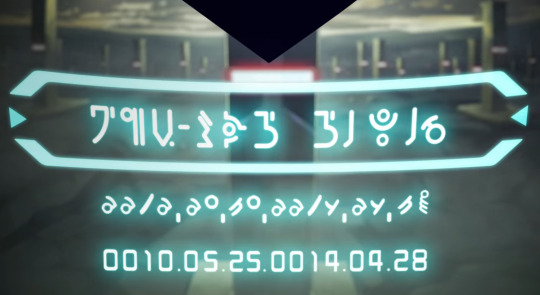
Pidge confirms that the 0010.05.25 represents a birth date, since looking at it is how she determines that Matt’s birthday is wrong. Because this is obviously a tombstone, we can logically conclude that 0014.04.28 represents a death date.
Lance’s 5-11-14 flight log number in S1E01 is most likely a reference to the fact that the show started production between April and June of 2014.[1][2]
And when Keith shows the other paladins his notes that he’s compiled on his search for the Blue Lion, a page-a-day calendar can be seen on the back wall showing that the paladins left Earth on the second of whichever month it was.
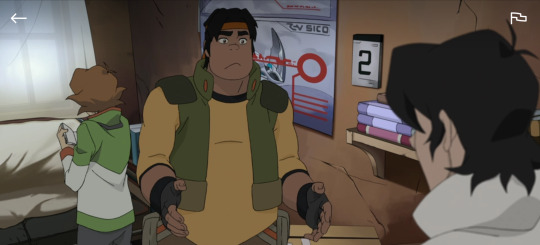
Meanwhile in S1E02 Some Assembly Required, Hunk refers to Shiro’s rescue from quarantine as Monday night. This would put the paladins’ departure from Earth on Tuesday afternoon, as Iverson confirms in S7E07 The Last Stand: Part 2 that the Paladins left Earth the day after rescuing Shiro.
So, if we look at the months in 2014 near the start of the American school year where the 2nd day of the month was a Tuesday, we can narrow down when the Paladins left Earth.
And the only option that meets all of those criteria is September 2nd, 2014.
Obviously the show doesn’t take place in 2014 because the technology the characters use in their daily lives on Earth is significantly more advanced than what we have in real life even in the 2020s. Not to mention Veronica name dropping World War III in S7E07 The Last Stand: Part 2 as a historical event.
However, it’s also obviously can’t be too far into the future, because other than having more advanced technology, much of what we see of Earth civilization looks fundamentally similar to our present day in terms of things like clothing and architecture, just with some futuristic flourishes here and there:
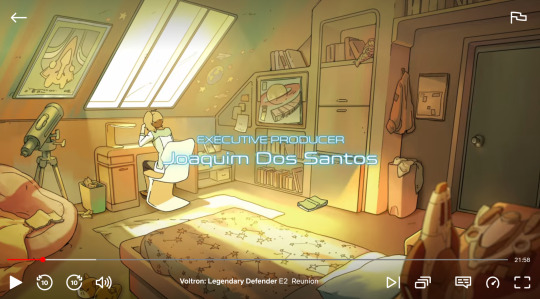
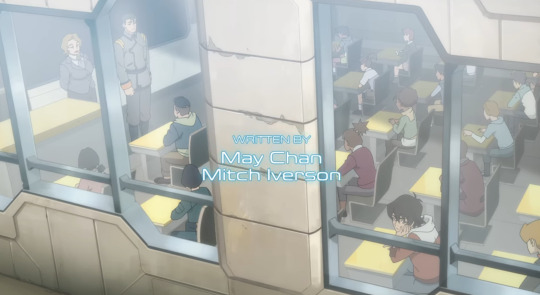


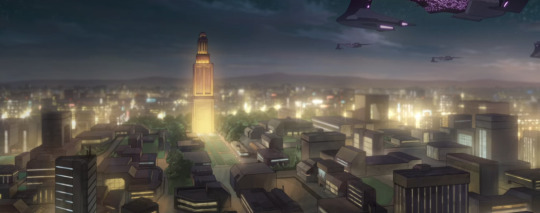
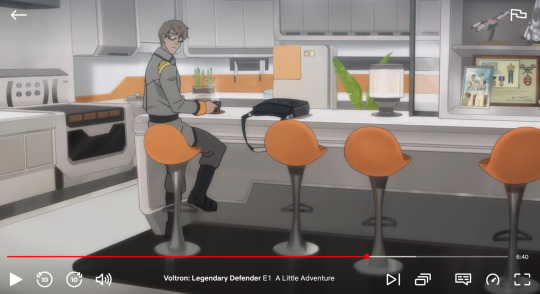


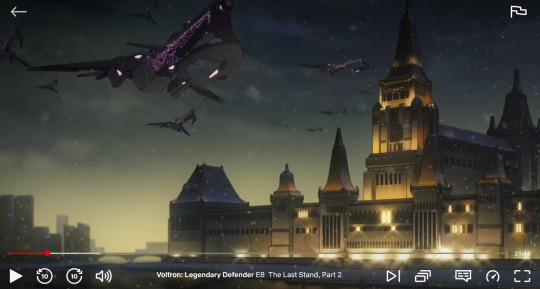

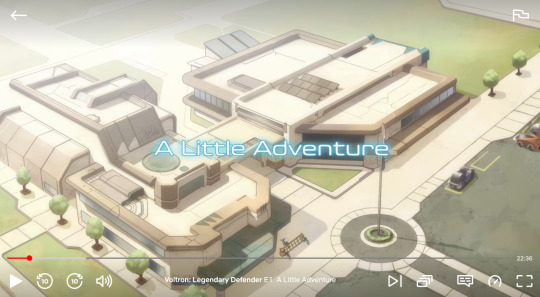
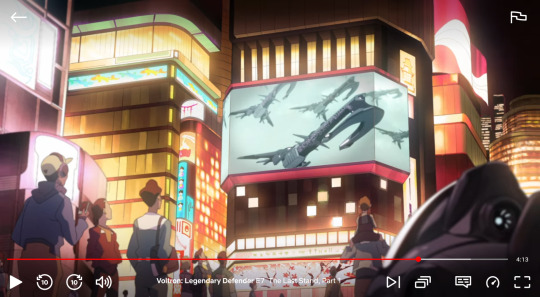
The fact that the years on Matt’s tombstone in S4E02 both begin with 00 as the first two digits raises the possibility that Earth decided to create a new calendar that started 14 years before the paladins left Earth.
However, it’s more likely that the production staff simply wished to leave it ambiguous how many centuries into the future the show takes place, as from a Doylist perspective there is no purpose to having Earth be on a different calendar system unless it’s relevant to the story.
Not to mention that it doesn’t make sense from a Watsonian perspective, since a change as widespread as the mass-adoption of a new calendar system would have to be in response to a major event that deeply changed society on such a widespread level that the society decided to define it’s calendar by how many years have passed since that event.
And the known event in the history of VLD’s Earth that might have this level of significance is World War III, which the showrunners have said in interviews resulted in “everyone on the planet realizing war sucks. We’re one Earth.”[3]
However, none of the characters act like it’s a recent event that happened within their lifetimes. The one time it’s mentioned in S7E08 The Last Stand: Part 2, Veronica speaks of the conflict as if it was a long time ago. Long enough that she has to preemptively clarify that the underground tunnels used to reach the Garrison’s supply depot are still structurally sound.
On top of the logistics not working out for World War III to have been the cause of a dramatic change in Earth’s calendars, Matt being Pidge’s older brother means that he would’ve been born before the hypothetical calendar change would’ve been adopted.
Yet S4E02 only shows Pidge’s attention being drawn to the year on Matt’s birth date being wrong when her tear slides over to the 10, when the lack of anything before it would’ve stood out first if he was born before the calendar reset to Year 0.
So we can safely take it as a given that the extra zeroes in the years on Matt’s tombstone are there to maintain a sense of ambiguity over what century VLD takes place in.
Which fits with how showrunner Joaquim Dos Santos described how the writers kept the history of VLD’s Earth “nice and nebulous” rather than going into detail on the logistics of World War III.
However since we know that the dates we do have used the 2014 calendar as a basis, and that the Paladins left Earth on Tuesday, September 2nd, all we have to do is find a year ending in 14 where September 2nd is on a Tuesday that’s far enough into the future that there’s enough time for all the advancements of VLD’s earth, but not so far ahead that it’s completely unrecognizable to the 21st century audience.
Which works out well because the next year ending in 14 with September 2nd on a Tuesday is 2414.
Part II: Known Character Birth Years
If we treat it as a given that Season 1 of VLD starts in the year 2414, then we can use that to narrow down the exact birth years of the human Paladins, as well as Allura, Lotor, Matt Holt, and Kova.
Kova is the oldest character whose birth year is known to us, as Haggar states he is 28 deca-phoebs old shortly before the destruction of Daibazaal and Altea.
Allura and Coran were in cryo-sleep for 10,000 Earth years, and Coran’s pedantic comment in S1E01 about the castle being 10,600 years old and built by his grandfather indicates that this number is exact.
This would put the destruction of Altea and Daibazaal in 7586 B.C.E., as Coran’s narration in S3E07 The Legend Begins indicates that the other planets in their solar system were conquered quickly after Zarkon and Haggar woke up from their Rift baths, meaning that both the Altean and Galran homeworlds were destroyed within a very short window of time.
Since Kova was 28 when Daibazaal was destroyed, he would’ve been born in 7614 B.C.E.
Meanwhile, S8E02 Shadows showed that Haggar only became coherent again after she gave birth, and flashbacks in S8E10 Knights of Light: Part 2 depict her participating in the conquest of the system. Which indicates that Lotor was born in between the destruction of both his parents’ home worlds.
In an interview recorded at WonderCon 2017, Lauren Montgomery and Joaqim Dos Santos talked about how despite initially having more knowledge and experience than the other paladins she was “just as young as anyone else”, and that she was handling overcoming her prejudice against the Galra “like any teenager would.” [4]
This indicates that Allura is still a teenager herself in the first 2 seasons.
Something which is supported by the fact that Allura was born less than 28 years before the fall of Altea yet looks to be around Keith, Lance, and Hunk’s age. Which indicates that while Alteans can live for hundreds of years as evidenced by Coran helping his grandfather build the Castle of Lions 600 years before the war against Zarkon, they age at roughly the same rate as normal humans until they reach adulthood.
Since she’s visibly older than Pidge, the showrunners’ remarks about her acting like “any teenager” put her age before being put into cryo-sleep somewhere between 17 and 18, the ages listed for Lance, Hunk, and Keith in the Paladin’s Handbook.
And we can presume that the ages listed in the Handbook are mostly accurate given that Colleen Holt confirms in S8E01 Launch Date that Pidge was 15 when the paladins left Earth, which is the same age that the Paladin’s Handbook gave for Pidge as of the end of Season 2.
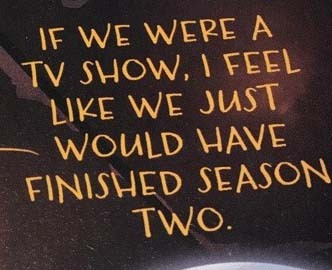
So, if Allura is the same age as Keith, Lance, and Hunk, then she would’ve been born between 7603 and 7604 B.C.E.
As for the human characters, the cast and crew of Voltron have consistently said that Shiro was the oldest of the paladins, and that his age was somewhere in his early twenties. The only time a specific number was given was in the context of providing a maximum limit to his age range. Saying that while he was at least 20, he wasn’t older than 25.
However, the fact that his official birthday is February 29th means that it’s impossible for him to actually be 25 as the Voltron Paladins’ Handbook claimed.
Because leap years only happen once every 4 years, in years that are divisible by 4 into a whole number (The only exceptions are years that are by 100 but not 400).
It’s not possible for Shiro to be 25 in Season 1 because that would require the year of the Kerberos mission to be a leap year, since Shiro’s 24th birthday would mark the 6th time that February 29th occurred on the calendar since his birth.
The year before 2414 would be 2413, which cannot be divided by 4 into a whole number (trying gets you 603.25). However the year before Kerberis, 2412, is divisible by 4 into a whole number (603), meaning that 2414 is in between two leap years.
With all of this in mind, the only way for Shiro to be older than 20 but younger than 25 in 2414, is if he turned 20 in 2412, as his 20th birthday would mark the 5th time since he was born that February 29th occurred on the calendar. This puts the year of his birth in 2392, making him 22 years old when he returns to Earth in Season 1.
Meanwhile, Pidge being 15 when the Paladins left Earth in 2414 would mean that she was born in 2399.
Meanwhile, the Coalition Handbook, which is written from the perspective of 1 deca-phoeb after the Paladins left Earth, talks about Krolia’s arrival on Earth being “about 19 Earth years ago,” indicating that Keith’s parents met in 2396.
The Handbook’s indication of a 1-year timespan from Season 1 to Season 5 is confirmed by Sam’s debrief during the flashback portions of S7E07 The Last Stand: Part 1. Commander Iverson mentions that Sam’s return to Earth in S5E05 Bloodlines happened a month before the meeting and says that the Keberos mission was two years ago.
Krolia’s arrival being about 19 years ago appears to reinforce the Paladin’s Handbook listing Keith as being 18 by the end of Season 2. Pidge’s age means that S2E13 Blackout can’t happen any later than April 2, 2415, meaning that Keith – whose birthday is October 23rd according to the show’s official social media accounts – turns 18 at some point during the first 2 seasons of the show. This puts his birth year in 2396 and indicates that his parents had to have met sometime that January, as we’ve seen little evidence to suggest that Galra pregnancies are any longer than human ones.
So, if Pidge and Keith’s ages in the Paladins’ handbook are accurate, then we can assume Hunk and Lance’s ages are too.
Lance’s birthday is listed by the show’s official social media accounts as July 28, so the timeframe of Seasons 1-2 means he would’ve already been 17 by the time the Paladins left Earth. This means that he would have been born in 2397.
Hunk is a little tricky since his birthday is January 13th, as neither the show nor the handbooks give any details to definitively confirm whether he turned 17 during the first 2 seasons, or if he was already 17 when they left Earth.
However, some context clues regarding the nature of the Garrison’s Cadet Program and the glimpses of his backstory that we got in S7E01 A Little Adventure can help make some educated assumptions.
In her goodbye to Matt at the Kerberos launchpad in S4E02, Pidge says “I can’t believe I have to go through middle school without you.”
Since Pidge makes no mention of attempting to enroll at the Garrison while Matt and her father are in space, this logically indicates that Pidge is entering 8th grade and that the Galaxy Garrison cadet program is for students at the high school level (Grades 9-12).
The fact that the MFE pilots had graduated by the time Sam returns in 2415 supports this, as their presence as background cameos in S1E01 and in the flashbacks of Keith and Shiro’s past from S7E01 indicate that they, Lance, Keith, and Hunk all enrolled in the cadet program the same year. This means that when the Paladins left Earth, Lance and Hunk were starting their senior year of high school
Keith and Lance being 17 and 18 during Season 1 is consistent with that, as 17 and 18 are the typical ages at which most American teenagers graduate from high school [5].
In the United States, many schools in grades K-12 use students’ birthdays to determine grade placement, with students who are born before a certain cutoff date (usually around the beginning of the school year) being placed in a higher grade level than students born after the cutoff [6].
For example, Lance and Keith are shown to both be in the same class at the Garrison in S7E01 even though Keith being born a year earlier means he’d theoretically be in the grade above Lance. But Lance’s birthday is in July, and Keith’s is in October.
So, if Lance’s July birthday is before the cutoff for enrollment for their grade level, then logically the same is true for Hunk’s January birthday, meaning that Hunk is already 17 during Season 1, putting his birth in the same year as Lance’s.
And knowing how the Garrison’s Cadet Program functions as an equivalent to high school means that we can figure out how old Matt is.
In the Shiro’s Story Ready-to-Read book, Shiro describes how he and Matt were selected for the Kerberos mission after they finished school:
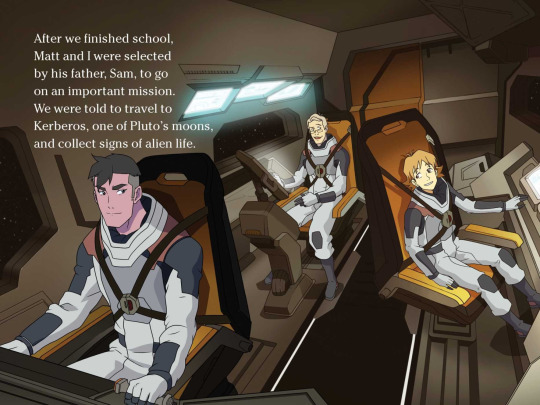
Since Keith is still wearing his cadet uniform when he confronts Shiro about his disease, this means that Sam and Sanda’s argument about Shiro being on the mission had to have happened during a period when classes were in session, as the flashback of their hoverbike racing in S7E01 and the lack of comments from Hunk about being caught out of uniform in S1E01 indicate that students are permitted to wear casual attire outside of school hours.
This means that Shiro and Matt had to have graduated the year before the Kerberos Mission, and then spent the following year training and preparing.
From this, we can conclude that Matt’s senior year at the Garrison corresponded to Keith, Lance, and Hunk’s freshmen year, putting Matt in the cadet program’s graduating class of 2412.
This would mean that Matt started classes at the Garrison in the fall of 2408.
And when Pidge says that his birthday is wrong in S4E02, she only does so after the camera draws viewers’ attention to the year. Which indicates that the month and date are correct, putting Matt’s birthday on May 25th. Based on what we’ve established about cutoff dates for grade placement, this would mean that Matt was 14 years old when he started classes at the Garrison, putting his birth year in 2394.
Part III: The Main Narrative
Knowing that Season 1 begins in September 2414 allows us to use the date of the Paladins’ departure from Earth as a baseline from which to determine a timeline of the show’s main storyline.
As previously established, the meta references and context clues within the first season place the paladins’ departure from Earth in S1E01 on Tuesday, September 2nd, 2414.
Since this is “1 year later” from Shiro’s capture on Kerberos, this puts the crew’s abduction in September 2413.
Since the Paladins’ Handbook reflects events up to the end of Season 2 and refers to Shiro’s capture as being “about a year ago,” we can safely assume that entirety of Seasons 1 – 2 take place before the end of 2414 in order for the character ages in the guidebook to be accurate by the end of S2E13 Blackout.
And for the first several episodes of Season 1, we’re given enough information to pinpoint exact dates for when much of the first season takes place.
Arus’ environment is shown to be nearly indistinguishable from Earths’ so we can assume that days on Arus last for about the same amount of time as days on Earth.
Coran states indicates in S1E01 that the search for the lions took about 2 hours, immediately after which the paladins had their first battle with Sendak.
The beginning of S1E02 Some Assembly Required is confirmed to take place the following morning, as Allura refers to the battle against Sendak in S10E1 as “yesterday”. Coran then tells Pidge that the prisoners they rescued need to remain in the cryo pods to heal “until tomorrow,” putting the events of S1E03 Return of the Gladiator on Thursday, September 4th.
S1E04 Fall of the Castle of Lions takes place entirely at night, with the Arusian’s re-enactment of Voltron’s battle with the Myzax robeast and Coran’s comment about letting the Arusians see the inside of the castle indicating from context that this is still on Thursday the 4th. This puts the daytime events of S1E05 on Friday, September 5th.
S1E06 Taking Flight takes place on the 6th, as Allura states at the end of S1E05 that Lance should be fully healed from his injuries after a day in the cryo pods.
Shay’s Belmera was close enough that Hunk and Coran could fly there from Arus in a small shuttle pod, have dinner with Shay’s family, fix their shuttle pod, wander around in the tunnel looking for the crystal, get captured, get rescued by Shay, and then get back to Arus all in less than a day.
So even if they spent several hours talking to Rolo and Nyma in S1E06, they still would’ve reached the Balmera in S1E07 Return to Balmera the same day.
Since S1E08 Rebirth ends with Hunk showing Shay her first sunrise after the Balmera is liberated, this brings the paladins to Sunday, September 7th.
The first volume of the tie in comics is stated to take place right after this, as the paladins are leaving the Balmera in Issue #1. The bulk of the action happens over the course of the following day, as Issue #1 states that the Paladins’ battle against the guardian monster took place the day after they left Allura at the Castle, and the sky on Krell shifts from morning to afternoon colors over the course of the Paladins’ time there, along with the fact that the sky outside the Fripping Bolgogian is in sunset colors in both Issue #1 and Issue #5.
So the first 8 episodes of Season 1 and the first volume of the comics all take place from September 1st to September 8th.
From here, the timeframes indicated become murkier, as while many events seem to take place very close together, the fact that the guidebooks put Keith as 18 by the end of Season 2 means that S2E12 Best Laid Plans cannot take place any earlier than October 23rd, 2414.
There are a few instances where we can estimate the time between certain episodes, however, we don’t have enough concrete information to confirm an exact time frame by Earth’s calendar for anything after the first volume of the comics.
However, the fact that the Voltron Coalition Handbook refers to the Lion Shuffle as “many quintants ago”, even if that’s an understatement, indicates that since the second handbook is written from the perspective of Fall 2415, we can assume that Season 3 took place in 2415 as well.
Meanwhile, context clues in S3E01 Changing of the Guard and the 2 subsequent episodes indicate that only a short time passes between the end of Season 2 and the beginning of Season 3.
S3E01 shows that the Paladins have been splitting off to pursue their own objectives during the timeskip between Seasons 2 and 3, with Hunk and Lance liberating planets with the Blade of Marmora while Pidge looks for clues to her brother’s whereabouts while Keith searches for Shiro. Acxa’s reports in S3E02 Red Paladin on where they’ve been spotted by the empire only indicate a handful of sightings, suggesting that it hasn’t been that long since the end of Season 2. This is supported by the fact that Lance and Hunk brought the leaders of the planets they had liberated since S2E13 to the Castle to talk about joining the Coalition, and only 5 planetary leaders were present for the meeting.
Furthermore, as S3E05 The Journey depicted with Shiro, a human can survive up to 7 days without food or water. So in addition to Keith’s grief over Shiro’s disappearance still being fresh, the fact that he’s still looking for Shiro among the wreckage from S2E13 suggests that the start of S3E01 is within that 7-day window.
On top of that, Throk indicates to his friend when they’re sitting in the arena that he’s been trying to speak to Zarkon for several days without success.
But on the other hand, enough time needs to pass that planets like Puig will have heard of Voltron’s defeat of Zarkon before the paladins arrive
All of these details indicate that the time between the end of S2E13 and the beginning of S3E01 wasn’t more than 2 or 3 weeks.
So if the end of Season 2 was still in 2414 and the first 3 episodes of Season 3 were in 2415, that means that the final battle of Season 2 took place in December 2414, and the opening arc of Season 3 took place in January 2415.
Meanwhile, S3E05 shows that Shiro travelled in a stolen Galra fighter for 7 days after Thayserix before Keith found him at the end of the episode. Even if there’s some time dilation involved, the fact that the Paladins are surprised Lotor was able to construct the first Sincline ship so quickly in S3E06 Tailing a Comet indicates that it hasn’t been that long since Lotor stole it in S3E04 Hole in the Sky, meaning that all of Season 3 took place in January.
S7E07 indicates that Sam’s debriefing happened a year after the Paladins left in Season 1, putting the meeting scene in September 2415. This would be consistent with Iverson’s introduction of the MFE pilots indicating that they’ve graduated from the Cadet Program.
The next time-skip jumps to 1 year after Sam’s debriefing, indicating that Matt contacted Earth in September 2416.
Matt tells his parents that Voltron hasn’t been seen in 6 months, putting the last 4 episodes of Season 6 in March of 2416.
He also mentions that the Coalition and Blade of Marmora memories are being hunted, and that their army had been “all but wiped out”, indicating that the Druids’ counterattack had clearly been going on for some time before Matt contacted his parents. However in S8E02, Macidus tells Haggar that “it has been phoebs since Emperor Lotor disappeared,” and that “the Blade of Marmora still challenges,” indicating that the purge of the Coalition and BoM had not yet begun as of two months after Voltron’s battle with Lotor, putting the beginning of the attacks on the Blade and Coalition somewhere between May and August of 2416.
Meanwhile, because of the 3-year time jump, this means that the Paladins began their voyage back to Earth in March 2419.
Near the beginning of S7E06, Shiro indicates that it’s only been a few weeks since he woke up in the clone body at the end of S6E07, and when Lance asks how long they’ve been out there, Romelle says “going on four movements” before he then asks how much longer it’ll take to reach Earth.
Coran’s comment in S1E02 about his Paladin lunch helping the team form Voltron “six times a movement” is said in the same manner that we’d say “seven days a week” in real life, suggesting that one movement is 6 quintants.
Which means that by the beginning of S7E06, the Paladins have spent more than 18 days flying back to Earth, but less than 24.
Meanwhile, the Paladins mention in S7E03 The Way Forward that, from their perspective, their battle with Lotor was “a few weeks” ago, indicating that at least two movements had passed since the end of S6E07 Defender of All Universes by the time they encounter Ezor and Zethrid’s pirate crew at the end of S7E02 The Road Home. However, it’s ambiguous whether all of those movements were spent on travelling or if it took the Paladins a few days to finish the preparations for their voyage before leaving the Dalterion belt.
And Pidge’s insistence in S7E06 that they still have one and a half Earth years of travel time left gives me the impression that we’re still in the same calendar month.
From all of this, we can conclude that the entire first half of Season 7 up until the Paladins fly out of that energy burst and reach Earth takes place within the month of March 2419.
Depending on how long the Paladins spent repairing the lions and preparing for the voyage between the end of S7E01 and the beginning of S7E02, this means that their landing on the Dalterion Belt and Shiro being merged with his clone had to have occurred somewhere between March 1st and March 8th, which would also apply to the timing of the Paladins’ battle with Lotor in S6E07.
With Sam’s debriefing being a month after he landed, and him being released from quarantine after about a week, he would’ve had to have landed and been released in August 2415 in order for September 2416 to still be “just over a year” after he started working to upgrade Earth’s defensive capabilities.
With the debriefing scene being “four years ago” from the beginning of S7E07, this would put the Paladins’ return to Earth in August 2419.
The liberation of Earth appears to only take a couple of days at most, and according to Shiro in S8E01 Launch Date, rebuilding took “several months” before the Paladins were ready to return to space.
This puts the beginning of Season 8 in early 2420, and a line from Rizavi in S8E01 helps to narrow things down.
When Pidge sees the Killbot Phantasm game, Rizavi mentions that it came out just before Sendak invaded, and that because of that there hadn’t been enough time for any players to reach the final level. She then tells the shopkeeper that she waited 3 years to get to the end of the game.
Meanwhile, Macidus tells the Paladins in S7E05 The Ruins that he has been marooned on the planet they found him at for “the last two decaphoebs,” and that the Druids’ purge against the Blade of Marmora was them “carrying out her final orders.”
Since the Paladins would have encountered him in March 2419, this would put the fall of the Blade of Marmora and Kolivan’s capture in March 2417, 7-10 months after the beginning of the counterattack against the Coalition that Matt spoke of in S7E07.
S8E02 Shadows confirms that Sendak invaded Earth on Honerva’s orders in the hopes of drawing out Voltron. Given, the potential narrative symmetry, it’s likely that Sendak’s invasion of Earth took place around the same time.
Which would be consistent with how the MFE pilots are referred to by Admiral Sanda as cadets in S7E07 when they had already graduated from the cadet program the previous year because they, like Shiro appear to be in a post-graduate program to continue their education after high school:
At WonderCon 2016, showrunner Lauren Montgomery referred to Shiro as a “slightly older student.”
Meanwhile in S7E01 he appears to be assisting Iverson and other Garrison instructors with classes, but is not treated by other characters as if he’s a full-time teacher himself.
During the briefing scene in S7E7, Commander Iverson gives Shiro’s rank as Lieutenant, reflecting the tradition of fictional military organizations in science fiction to utilize the ranking systems of real world militaries, particularly with naval ranks such as Commander and Admiral which are exclusively used for naval officers.
During his visit to Keith’s school and his time overseeing simulator drills with Keith’s class, Shiro’s uniform only has two stripes on the shoulders of his uniform, and he’s never addressed by any specific rank.
However in the scene where Sanda and Sam Holt are arguing about Shiro’s inclusion on the Kerberos mission, his uniform now has three stripes on the shoulder, which he has been consistently shown to have in Pidge’s flashback to the crew’s disappearance being announced in S1E05, which show photos of Shiro, Sam, and Matt that would’ve been taken specifically for the mission’s publicity. And when Sam is debriefed in S7E07, Iverson identifies Shiro as a Lieutenant.
In our world, it takes an average of 4 years after enlisting in the navy for a person to be promoted to lieutenant. However, if someone enlists before or while in college, promotion to Lieutenant can be achieved with the completion of a Master’s Degree.
Depending on the field, a Masters’ degree would require an additional four years after completing a Bachelor’s degree. However, some universities that specialize in specific subjects (like mine did) offer a Master’s program that only takes an additional 1-2 years after receiving a Bachelor’s degree to complete.
Since the Garrison’s cadet program is teaching what 21st century viewers would consider advanced college-level science to high school students, it’s plausible that the Garrison has an advanced program for graduates of the cadet program to continue taking classes. Which makes sense because the Garrison’s cadet program is clearly an example of a vocational school, which focuses education at the secondary (high-school) and/or post-secondary (college) level on teaching students the skills and knowledge required for a specific career path, as opposed to a more general education.
It explains why tie-in books indicate that Shiro and Matt graduated from the Garrison at the same time. While Matt was completing his regular education in the cadet program, Shiro was finishing up his advanced education track.
Because Shiro makes multiple comments that imply an in-depth knowledge of physics and astronomy: From knowing enough constellations to recognize in S1E01 that the Blue Lion’s wormhole has left them in unfamiliar space, to being able to calculate the approximate speed of the black lion’s fall at the start of S2E01 Across the Universe in his head despite the pain of a glowing magic wound in his side and the general exhaustion of the battle they’d just come out of.
It even explains why S7E01 has Shiro was helping with classes and Adam mentioning having a class to teach, because many high schools and colleges offer work-study programs to where students can work part-time jobs at the school in exchange for financial assistance, as well as to get hands on work experience in a particular field so that they can transition from school to working more easily. Which also explains why Sam and Adam both mention Shiro having gone on multiple space flights and missions by the time he’s selected for the Kerberos mission even though the timeline indicates he’d only be 20 by the time he was chosen for Kerberos.
And since my analysis of Garrison lore indicates that the grey/green uniform that Shiro wears when visiting Keith’s school is reserved for those whose work in administrative roles and other capacities in the day-to-day running of the Garrison, this would indicate that he graduated from the cadet program at least a year or two before, and received the new uniform as part of the work-study program when classes started up the following school year.
So, the MFE pilots continuing their education after completing the cadet program would explain why Sanda would still refer to them as cadets even if they’ve already graduated from the cadet program: because even if they’re not in the cadet program anymore, they’re still students.
The pattern we’ve established regarding the human characters’ birthdates and grade levels means that Shiro would’ve graduated from the regular cadet program in 2410 (meaning he would’ve enrolled in 2406) and finished his advanced studies in 2412, making the Garrisons’ post-graduation education options a 2-year program.
This means that the amount of time that Sendak’s invasion of Earth had to have been before May of 2417. So, a March 2417 invasion around the same time the Druids and the Blades wiped each other out fits within that window.
And if that is the case, then Rizavi’s “three years” comment would put S8E01 in March 2420.
From the perspective of the crew of the Atlas, the first half of the season takes place over the course of about 48 Earth days. S8E08 Clear Day appears to take place within a couple days after the end of S8E07 Day Forty-Seven, as Hunk introduced the Altean robeast Pilots to Allura and Coran near the end of the day, and the following episode opens with Tavo agreeing to speak with Allura due to Hunk’s efforts at reaching out to the Alteans with food.
However, the leader of planet Drazan indicates that thanks to time dilation, the Atlas’ internal clocks are about 24 days behind the rest of the universe by the beginning of S8E08, as Coran notes that according to their calendars, Clear Day shouldn’t be for another four movements.
Depending on when in March the Atlas left Earth, this put the Clear Day celebration somewhere between May 12th and June 10th, 2420.
Based on how quickly events move following the events of S8E08, this would put the final confrontation with Honerva somewhere between the middle of May and the middle of June, which would put the epilogue in May or June of 2421.
Given that the fact the timeframe of the show was determined based on a meta gag about the show’s production, my instinct leans towards the second half of Season 8 all taking place in May, as it would mean that the entire main plot of the show – which was contracted for 78 episodes (the hour-long pilot being 3 episodes stitched together) – took place over approximately 7 years and 8 months.
Part IV: Backstory Dates & Other Timeline Trivia
Now that we’ve hammered out the timeline for the main events of the story, we can start filling in dates for elements of the characters’ backstories and other areas of the timeline not covered by the previous sections.
The First Kral Zera:
In S5E04 Kral Zera, the Archivist states in 2415 that the Kral Zera has been burning for “over thirteen millennia,” putting the first Kral Zera and the official founding of the Galra Empire as a political entity sometime before 10,585 BCE. Since he said thirteen, rather than fourteen, we can logically assume that it couldn’t be any earlier than 13,999 years before 2415, which would be 11,584 BCE.
The Daibazaal Rift:
Kova appears to be fully grown when Zarkon first meets him in Honerva’s lab in S3E07 after the discovery of the Rift on Daibazaal. Using Earth cat development as a basis for comparison, this would indicate that Kova is at least 1 year old by this point, meaning the earliest that the Trans-reality comet could have crashed was 7613 B.C.E.
However, it cannot have happened any later than 2 years before Allura’s birth. When Honerva shows Alfor that their Quintessence experiment is running after he thanks her for the gift celebrating Allura’s birth, he notes that the experiment has been running for a full year by that point. But despite the experiment being positioned right next to her workstation, it was nowhere to be seen when she and Zarkon were having their first meeting before the timeskip.
Meanwhile, before the episode transitioned from Honerva and Zarkon’s first meeting to Alfor showing his daughter off to Zarkon, Coran’s narration refers to Alfor visiting often “as the years passed,” indicating that more than one year passes between the discovery of the rift and Allura’s birth.
This means that since the experiment would’ve begun in 6704 or 7605 B.C.E., the Rift cannot have been opened any later than 7605 or 7606 B.C.E.
The Difference Between 1 Year & 1 Deca-Phoeb:
When Shiro and Allura are detected during their infiltration of a Galra cruiser in S1E10 Collection and Extraction, the computer identifies Shiro as "Fugitive prisoner 117-9875."
The format of his prisoner ID number indicates the year on the empire's calendar that Shiro was captured, meaning that the Galran calendar lists Earth year 2414 as imperial year 9876.
Initially, I thought this meant that the references to Altea being destroyed "10,000 years ago" were a generalization and that it wasn't exactly 10,000 years.
However, Coran's insistence on correcting Hunk that the Castle of Lions is 10,600 years old in S1E01 indicates that it was indeed exactly 10,000 years between Altea's destruction and the return of the Blue Lion.
Which left me with a bit of a conundrum of how to reconcile the two timescales. Then I remembered that S1E06 established that Earth and intergalactic time measurements weren't exactly 1:1, with Pidge and Coran's comparison showing that ticks were slightly bigger than seconds.
So I decided to do the math and see if how 9876 decaphoebs would compare to 10,000 years. And dividing both numbers by 9876 gives me 1 Deca-Phoeb = 0.9876 Years.
Meaning that Shiro's prisoner ID and the references to Altea's destruction being 10,000 years ago are both correct.
Shiro and Keith’s First Meeting:
Since the Galaxy Garrison’s cadet program is shown to be for high school students, and that Keith, Lance, and Hunk were meant to graduate in 2415, we can deduce that Shiro and Keith first met in the spring of 2411. Most high school enrollment is done in the spring, so it makes the most sense for the Garrison to send Shiro to local schools to convince students who will be freshmen at the start of the next school year to enroll, as opposed to trying to persuade kids to transfer in the middle of the year.
Based on the fact that Lance was in 9th grade as a 14-year-old, the Garrison likely starts classes in August, which is consistent with the fact that Keith’s map of his search for the Blue Lion places the Garrison near the Grand Canyon National Park in Arizona.

Where, according to my own research and the experience of friends who live there, the school year typically begins in late July or early August and ends in May.
This would mean that Shiro just only a month or two past his 19th birthday when he and Keith first met, while Keith was around 14 and a half.
Pidge’s Grade Level:
Though we don’t know exactly when it happened, the fact that Pidge is still in 8th Grade when she turns 15 means that somewhere along the line she had to repeat a grade during middle or elementary school.
Details and Aftermath of the Kerberos Mission:
In S4E02, Matt mentions planning to use their family code to keep in touch with Pidge during his mission, so the fact that Pidge never mentions receiving any message with the code letting her know that they landed safely indicates that Matt, Sam, and Shiro were abducted shortly after arriving on Kerberos.
The news broadcast announcing their disappearance is dated five months after the launch, and earlier in the flashback, Sam mentions that he and Matt “will be eating freeze-dried peas for the next two months.”
Since their abduction happened in September 2413, this puts the mission’s launch in July of 2413. From a logistics standpoint, a summer launch makes sense for the Garrison so that they won’t have to worry about disrupting classes, or cadets sneaking around to watch the launch and getting hurt.
This would mean that the crew’s disappearance was announced in December 2413.
Pidge’s confrontation with Iverson during S1E05 indicates that she was not aware of the involvement of aliens prior to her enrolling at the Garrison, as she only mentions that the Garrison’s probes show no sign of a crash on Kerberos and doesn’t bring up the transmission from the Galra warship to Zarkon’s central command that S7E07 reveals the Garrison had managed to record.
The Paladin Handbook states that a rescue mission to Kerberos recovered the remaining equipment, so the fact that Pidge doesn’t mention finding reports from the rescue team on Iverson’s computer in S1E05 indicates that the rescue mission hadn’t left yet when the disappearance was made public.
Since S7E07 shows video footage of Shiro, Matt, and Sam on Kerberos getting cut off as the Galra cruiser approaches, the probes were presumably destroyed by the cruiser as it arrived on Kerberos, and the Garrison sent new probes to try and reestablish contact before making the crew’s disappearance public.
A further piece of evidence for the Garrison beginning classes in August is that Pidge’s comments in S1E01 indicate that she’s been listening to Galra radio chatter for several nights now and can recognize that the level of activity on the night of Shiro’s return to Earth is higher than normal. A month would give her a decent amount of data to work with to identify patterns of activity.
The VR Game and The Zel:
In the opening of that one VR game Voltron: VR Chronicles, Zarkon and Haggar discuss a technologically advanced species known as the Zel, whose population was decimated by the empire a millennia ago, but whose homeworld remains hidden from the empire.
The game features Shiro still piloting the black lion, and Haggar indicates in the first cutscene that they’re still able to track the Castle of Lions through Zarkon’s bond with the Black Lion, which puts the game before the events of S2E04 Greening the Cube. However, the paladins don’t give any indication that they’re aware that Zarkon can track them like that, meaning that it has to take place before Allura gets captured in S1E10 Collection and Extraction.
Given the timeline established for the first 2/3 of Season 1, the only places the events of the VR game could fit is between volume 1 of the comics and the beginning of S1E09 Crystal Venom, or during the travel montage in S1E10. However, the lack of any mention of getting back to their journey to the coordinates of the hidden Quintessence refinery in S1E10 means it has to take place between S1E08 and S1E09, particularly since Lance notes the game’s robeast boss fight - a recolor of the same one that attacked the Balmera - is giving him deja vu.
In the VR game, Hunk also indicates that travelling via wormhole is still a relatively new experience for him, so it’s most likelt that this game still takes place sometime in September 2414 after the events of the comic.
All of which means that the empire’s battle with the Zel that Zarkon and Haggar talk about would have occurred somewhere in the year 1414.
Timeframe of Seasons 4 – 5:
S4E01 Code of Honor opens with Keith indicating that Lotor hasn’t been seen in months. Since their last encounter with Lotor’s forces was in early January 2415, and Keith says months – as in plural – the earliest the beginning of the episode could take place is some time in March 2415. However, based on the timeframe of Season 8’s Clear Day, it can’t be any later than the end of April.
S4E04 The Voltron Show! establishes that the planet Drazan has a 721-day year and only 1 of those days ever gets clear skies, with Team Voltron missing that year’s Clear day due to Coran’s miscalculations.
However, in S8E08, Drazan is celebrating another Clear Day and explicitly states that this is the first one after the one that Voltron missed in Season 4. Which means that a day on planet Drazan is longer than an Earth day or standard quintant.
We’ve already narrowed down that Season 8’s clear day took place somewhere between May 12th and May 24th 2420, so if we assume that the paladins missing the previous Clear Day happened within the same window of time in 2415, this would put the beginning of S4E04 sometime in May 2415.
(Which, incidentally, means that a year on Drazon would be equivalent to about 5 years on Earth, while a day on Drazan is approximately 60 hours or 2.5 Earth days).
Meanwhile, Coran indicates in S4E04 that Keith’s departure from the team has not spread very far yet, indicating that the episode begins a short time after the end of S4E01 since Keith no longer piloting the Black Lion is not common knowledge yet. This means that Keith leaving the team would have also taken place in May 2415.
S4E01 shows a montage of time passing while Keith works with the Blades, indicating that a notable amount of time passed between the beginning and the end of the episode. Furthermore, Allura’s comment about how Keith keeps saying he’s sorry for not being there, but his actions say otherwise indicate a consistent pattern of Keith being too busy on Blade Missions to perform his duties as the Black Paladin. This indicates that Keith was flaking on them for at least a couple weeks before the crisis where Shiro had to reconnect with the Black Lion.
Meanwhile, the fact that Coran states that Keith’s departure from the team at the start of the season is not common knowledge yet in S4E04 indicates that S4E04 actually takes place before S4E02. This is reinforced by the fact that Lotor’s urgency to access the Quintessence field in S4E05 Begin the Blitz indicates that very little time has passed since the end of S4E03 Black Site, which contrasts how S4E04 clearly took place over the course of several days, if not multiple weeks.
The timeframe for Sam’s return to Earth that I identified in the previous section puts all of Season 5 in August 2415, as events are indicated to happen fairly quickly:
S5E03 Postmortem clearly starts the morning after Zarkon is killed, and Lotor states that the Kral Zera will be held sometime in the next two days.
The hostage exchange in S5E02 Blood Duel likely only took a couple days at most of back-and-forth communication to negotiate the terms and details after the end of S5E01 The Prisoner.
S5E04 shows that Sam was making the final preparations to leave for Earth when Shiro and Lotor went to the Kral Zera, meaning that both Sam’s departure and the Paladins’ arrival at Central Command would’ve taken place a day or two later.
Pidge, Lance, and Hunk are shown spending most of a day goofing around on Central Command with their reprogrammed Sentry while Lotor and Allura are looking through Haggar’s lair.
After Allura finds the compass stone, they appear to head to Oriande if not that day then the following day, and when the castle loses power thanks to the White Lion, we’re told that the Castle only has another quintant of air left.
Assuming they spent a night recovering from oxygen deprivation like Shiro did in Season 3, then they would’ve returned to central command the following day. Right when they got back, Lotor had to receive a briefing on the state of the empire. A few hours later, he did his speech, following which Voltron went to help protect the Omega Shield
While it’s unclear exactly how many days passed between the end of S5E04 and Keith’s half of S5E05, Hunk indicates in S80E3 The Prisoner’s Dilemma that Keith and Krolia had already started their trip through the Quantum Abyss by the time the Paladins came to the aid of the Omega Shield.
So we can confirm that the entirety of Season 5 takes place in August 2415.
From there, we can narrow down a rough idea of when the rest of Season 4 takes place.
While it’s not stated exactly how much time passes between S4E06 A New Defender and S5E01, it’s implied to not be that long. In S5E01, Nyma thanks Pidge and Matt for helping with repairs on the Coalition’s fleet, saying the ships were “pretty banged up after the invasion.” This implicitly indicates that the attack on Naxzela and the rest of the Galra forces in that section of the universe was recent enough that repairs to the rebel ships that survived the battle were only just now being finished.
However, enough time needs to have passed that Lotor has been able to give them several locations for Galra bases to attack that were low-risk before he runs out of easy targets to give them.
So, it’s likely only been a couple of weeks at most since the end of Season 4. Since S4E02 and S4E03 happen only a day or two together, and S4E05 is implied to take place just a day or so after that, this puts the remainder of Season 4 sometime in late July, since Sam would’ve had to land on Earth in mid August in order for both his debriefing and Matt contacting Earth “just over a year” after said debriefing to be in September.
Which means that the third volume of the comics most likely also takes place in July, since the first issue of this arc depicts the Paladins attempting to drive a Galra fleet out of the Coalition’s new territory without letting them fly in the direction of the planets that were already liberated in S4E06 A New Defender, and the central conflict of the arc revolved around the paladins attempting to test if the information Lotor was providing them with was accurate.
Meanwhile, the scenes of Haggar gazing into Zarkon’s mind and remembering her past in S3E07 are implied to take place concurrently with S4E02.
S3E07 ends with Haggar waking Zarkon up, yet we don’t see him up and around until S4E02, which takes place several months after the end of Season 3.
Now, which sounds more logical?
Haggar wakes Zarkon up in October 2414 and he spends the next eight months or so sitting on his ass doing nothing while his empire keeps crumbling under rebel uprising?
Or Lotor’s lack of involvement in the empire for months as seen in S4E01 Code of Honor making Haggar desperate enough to tap into Zarkon’s mind, at which point he immediately gets out of his bed and takes the throne back from Lotor in S4E03 Black Site?
The latter would certainly be a logical sequence of events. And it would better explain why she’s suddenly looking at her old appearance as Honerva at the beginning of S4E03 if her recollection of her past was just yesterday than if she remembered months ago and is only now deciding to look at her old face.
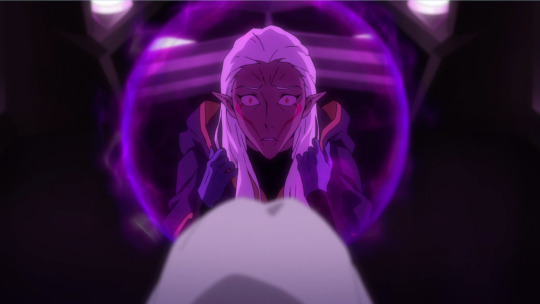
Warlord Lahn Raiding Ranveig’s Base:
The Paladins visiting Drazan’s Clear Day festival appears to take place only a day or two after the end of S8E07. In that episode, the Altean robeast pilot the Atlas picks up is noted to be the 6th one they’ve brought aboard since leaving Oriande. Assuming they picked up one robeast pilot per day, this means that at least 6 days passed for the Atlas since the end of S8E06 Gensis.
Given that time dilation has only come up in the series when characters are travelling without using wormholes, we can probably assume that more than 6 days passed for the rest of the universe.
Since S8E08 appears to take place on Day 48 and is 24 quintants behind Planet Drazan thanks to time dilation, my best estimate would be that at least 12 days pass between the battle in Oriande and Clear Day.
Depending on when in May the Atlas visited Drazan for Clear Day, this would put the attack on Oriande somewhere between the end of April and the beginning of May.
S8E06 is indicated to take place only a day or so after the events of S8E05 The Grudge, which itself takes place only a short time after S8E04 Battle Scars, as the episode opens with the Paladins informing the Atlas of Olkarion’s fate.
Meanwhile S8E04 indicates it’s been only a few days for them since they left the Atlas at the end of S8E03, as Pidge notes that they’ve checked 11 star systems for signs of Robeasts in the last 3 days. Assuming that further time dilation occurred during S8E04 and S8E05, this would put the Atlas’ invasion of Warlord Lahn’s base on planet Ryker some time in April 2420.
When Lahn receives the transmission from the lost ship Klytax V-3, he mentions that he sent it and 14 other cruisers to scout Warlord Ranveig’s base from S5E05 for weapons six phoebs ago, which would be in October 2419.
Section V: The Complete Timeline
When you add everything together, the timeline of the VLD universe looks like this:
10,585-11,584 B.C.E.: The Galra Empire is formally established on the planet Feyiv with the coronation of Emperor Brodar in the first Kral Zera.
8186 B.C.E.: Coran’s grandfather builds the Castle of Lions. Coran accompanies him to a Balmera during the construction.
7614 B.C.E.: Kova is born
7606-7613 B.C.E.: A Trans-Reality Comet crash lands on the planet Daibazaal and a rift between realities is discovered at the crash site.
7604-7605 B.C.E.: 1 year before Allura’s birth, Honerva and Alfor initiate their first Quintessence experiment.
7603-7604 B.C.E.: Princess Allura is born, and Voltron makes its debut defending Daibazaal from the Rift Creatures.
7586 B.C.E.: Daibazzal and Altea are destroyed. Lotor is born
1414: The Galra Empire battles a technologically advanced species known as the Zel and decimates their population, but are unable to locate the Zelthronian homeworld.
2392, February 29: Takashi “Shiro” Shirogane is born
2394, May 25: Matt Holt is born
2396, January: Krolia crash lands on Earth
2396, October 23: Keith is born
2397, January 13: Hunk is born
2397, July 28: Lance is born
2398, April 03: Katie “Pidge” Holt is born
2406, August: Shiro begins taking classes at the Galaxy Garrison.
2408, August: Matt begins taking classes at the Galaxy Garrison.
2410, May: Shiro graduates from Galaxy Garrison’s cadet program
2410, August: Shiro continues his education at the Garrison
2411, March-May: Shiro visits Keith’s middle school as a recruiter for the Garrison sometime in the spring
2411, August: Keith, Lance, Hunk, James Griffin, Nadia Rizavi, Ryan Kinkade, and Ina Leifsdottir begin taking classes at the Galaxy Garrison
2412, May: Matt and Shiro graduate from their respective programs at the Galaxy Garrison.
2412, August: Shiro and Matt are selected to be part of the Garrison’s mission to Kerberos.
2413, July: The Garrison’s mission to Kerberos launches
2413, September: Sam Holt, Matt, and Shiro reach Kerberos and are captured by the Galra Empire.
2413, December: Galaxy Garrison publicly announces the disappearance of the Kerberos mission.
2414, April 28: Rebel forces battle the Galra Empire on the planet Marchanda, resulting in 127,098 rebel casualties while the planet is reduced to a barren wasteland. Matt uses this battle to fake his death and go into hiding in a hidden rebel listening post.
2414, May 11: A rescue mission from Galaxy Garrison arrives on Kerberos to retrieve the equipment left behind after the original mission’s disappearance.
2414, August: Katie Holt begins taking classes at the Galaxy Garrison under the name of Pidge Gunderson in order to find information about what happened to her father and brother.
2414, September 01: Shiro lands on Earth and is rescued from quarantine by Keith, Lance, Hunk, and Pidge.
2414, September 02: Shiro, Keith, Lance, Hunk, and Pidge find the Blue Lion and leave Earth.
2414, September 03: The Paladins train to figure out how to form Voltron outside of combat.
2414, September 04: The Paladins meet the Arusian natives and defeat the Myzax Robeast. Sendak attacks the Castle of Lions that night.
2414, September 05: Pidge and the paladins retake the Castle of Lions from Sendak while Hunk and Coran retrieve a new Balmeran crystal.
2414, September 06: The Castle of Lions takes off from Arus and liberates Shay’s Balmera later that day following an encounter with Rollo and Nyma en route.
2414, September 07: Hunk takes Shay to watch her first sunrise. After leaving the Balmera, Coran takes the Paladins to the Karthulian system for a training exercise.
2414, September 08: The Paladins travel to the planet Krell to retrieve a Yalexian Pearl to trade for Coran’s safety.
2414, September 09-30: Sometime in September, Team Voltron investigates a Zelthronian distress signal.
2414, December: The Paladins coordinate with the Blade of Marmora to attack Central Command, grievously wounding Zarkon in the process. Shiro disappears and Lotor is summoned from exile to lead the empire while his father recovers.
2415, January:
Keith becomes the new pilot of the Black Lion and leads the team in their first battles against Lotor on Puig and Thayersix.
The Paladins find an Altean exploration ship caught in a rift between realities and recover the trans-reality comet stored in its cargo hold after visiting the Altean Empire reality.
Shiro makes his way back to the team after awakening aboard a Galran research vessel.
In the process of searching for the trans-reality comet, the Paladins come upon Lotor’s generals attacking a Galran outpost in the Ulippa system to steal a fragment of their Teludav.
Coran tells the Paladins the story of Voltron's origins and Zarkon's descent into tyranny.
2415, March-April: Keith and Kolivan discover a new strain of Quintessence being shipped across the Galra empire through a network of secret supply routes.
2415, May:
Keith leaves the team in order to focus on his work with the Blade of Marmora.
Voltron misses performing their air show at the planet Drazan’s Clear Day celebration, leading Coran to ingest a brain worm to help him do a better job coming up with ideas for their propaganda shows.
2415, July:
Pidge finally tracks down Matt and brings him back to the Castle of Lions.
Haggar uses her magic to reawaken Zarkon, in the process regaining some of her memories of her life as Honerva.
Zarkon learns that Lotor is building ships from a trans-reality comet and declares his son a fugutive.
Voltron launches an attack on Naxzella and other key planets to seize control of 1/3 of the Galra Empire’s territory in a single strike.
The Paladins finish liberating planet Pintos Sentos.
Voltron dismantles the Galra shipbuilding facility known as SPRAWL using intel provided by Lotor.
2415, August:
Voltron rescues Sam, and Zarkon is killed by Lotor in the process.
Lotor becomes the new emperor of the Galra in the thirty-fourth Kral Zera.
Sam returns to Earth and is placed under quarantine at Galaxy Garrison’s main base in Arizona.
Keith extracts Krolia from Ranveig’s base and they enter the Quantum Abyss in search of the origins of the new mystery Quintessence.
Lotor, and Allura enter Oriande, where Allura passes the trials of the White Lion and gains further knowledge of Altean Alchemy.
Team Voltron assist Commander Bogh and Lieutenant Lahn when their planet is attacked by Sendak’s Fire of Purification.
Sam is released from quarantine and reunited with his wife Colleen.
2415, September: Sam is debriefed by Galaxy Garrison’s Joint Chiefs regarding his experiences in space.
2416, March 01-08: After spending at least 2 years in the Quantum Abyss, Keith and Krolia return to the Castle of Lions with Romelle. The Paladins battle Lotor and are forced to sacrifice the Castle of Lions to seal off the Quintessence Field and save their entire reality.
2416, May-August: The Druids and other factions of the Galra Empire begin a campaign of retaliation against the Blade of Marmora and the Voltron Coalition.
2416, September: Matt contacts his parents on Earth to inform them of Voltron’s disappearance and warn them of the rebellion’s losses.
2417, March:
The Blade of Marmora make their last stand against the Druids. Both factions suffer heavy casualties, and Kolivan is taken captive by Macidus.
Sendak invades Earth.
2419, March:
Allura merges Shiro with his clone and the Paladins gather Fonatonium to help recharge their lions.
The Paladins set off for Earth and are captured by Zethrid and Ezor’s pirate crew while investigating an abandoned Blade of Marmora outpost.
The Paladins encounter Macidus and rescue Kolivan. Krolia leaves with Kolivan to search for other surviving Blades.
The Paladins attempt to recharge their lions.
2419, August: The Paladins reach Earth and quickly liberate the planet from Sendak’s occupation.
2419, October: Warlord Lahn sends Klytax V-3 and 14 other cruisers to salvage weapons from one of Warlord Ranveig’s bases.
2420, March:
The Paladins enjoy their last day on Earth before returning to space.
The IGF Atlas launches from Earth to liberate planets that remain under Galra rule.
2420, April: The Atlas attacks Warlord Lahn’s base on the planet Ryker.
2420, May 12-31:
Voltron and the crew of the Atlas attend planet Drazan’s Clear Day festival.
The Paladins confront Honerva at the source of all realities.
2421, May: The lions fly away to parts unknown.
Note: This timeline will be updated whenever I uncover further information.
Sources:
[1] Creating Voltron: Legendary Defender; June 10, 2016. https://www.denofgeek.com/tv/creating-voltron-legendary-defender/
[2] Tweet by Joaquim Dos Santos; October 12, 2018.
https://web.archive.org/web/20200723131054/https://twitter.com/JDS_247/status/1050905860728213506
[3] The Ending of 'Voltron' Season 7, Explained by the Showrunners; Eric Francisco; August 10, 2018.
https://www.inverse.com/article/47977-voltron-legendary-defender-season-7-netflix-ending-explained-by-showrunners-interview
[4] Joaquim Dos Santos & Lauren Montgomery Talk Voltron at Wondercon '17; When Nerds Attack; April 2, 2017.
https://www.youtube.com/watch?v=KZW1V2dYHgs
[5] High School in the United States - wikipedia.
https://en.wikipedia.org/wiki/High_school_in_the_United_States
[6] K-12 Education in the United States - Wikipedia.
https://en.wikipedia.org/wiki/K-12_education_in_the_United_States
39 notes
·
View notes
Text
On the whole "they're murderers morality doesn't matter" thing: it does matter. At least a little bit. Like, there has to be some level of relatability and humanity to ground them or else the audience won't empathize with them. You want to write a morally gray character? Fine. But you gotta have the audience want to root for them, emotionally.
For many people, how Nandor has treated Marwa and Guillermo this season has crossed the line. They can no longer root for him or empathize with him. And that's a problem.
Another point I see brought up is that it's a comedy. And since it's a comedy the darker subject matter is fine to be glossed over, right? Only when it's funny. And only for topics that aren't as fucked up as the ones they "joked" about. For many people this episode was not funny, it was just uncomfortable. I don't want "jokes" about a woman of color losing her autonomy or Guillermo losing every good thing in his life thanks to Nandor. The darker moments could not be ignored in the name of comedy.
This episode crossed a line. I still have hope they can at least try to recover, but it's doubtful that that will happen in just one episode.
Your move, writers. Don't fuck up season 5.
#god im just. ugh#i sat through all 8 seasons of voltron and somehow this hurts more#wwdits spoilers#wwdits meta#wwdits
82 notes
·
View notes